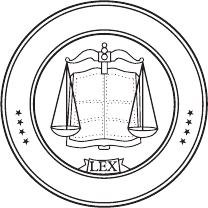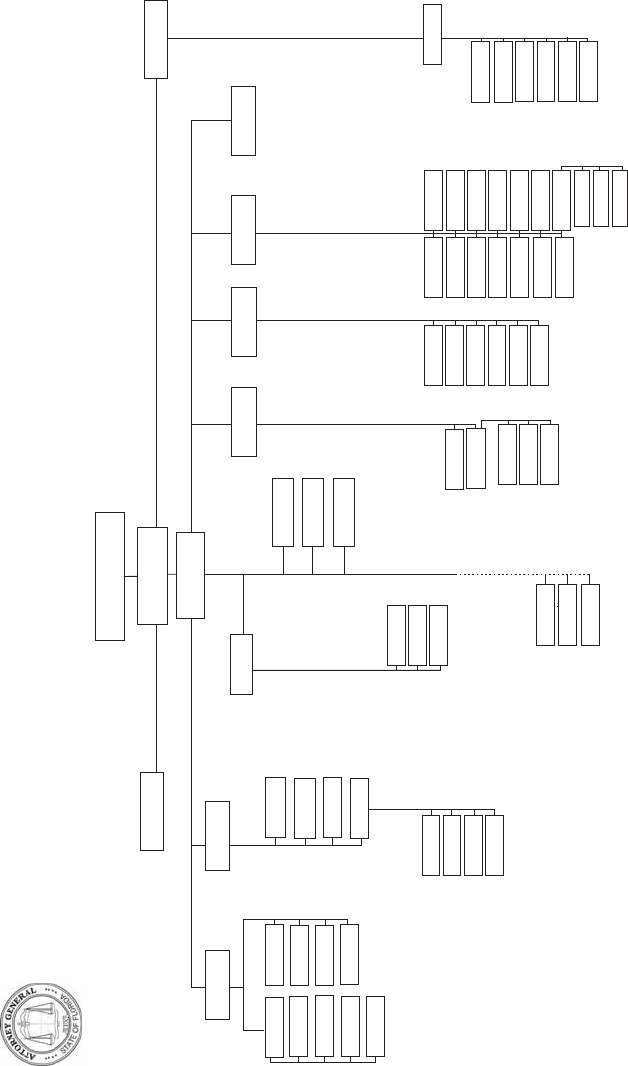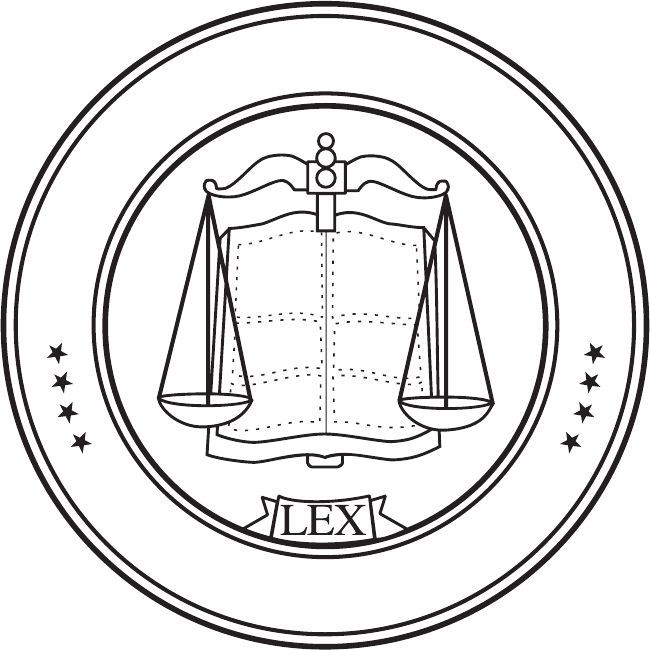
BIENNIAL REPORT
of the
ATTORNEY GENERAL
STATE OF FLORIDA
January 1, 2015, through December 31, 2016
PAM BONDI
Attorney General
Tallahassee, Florida
2017
S
T
A
T
E
O
F
F
L
O
R
I
D
A
A
T
T
O
R
N
E
Y
G
E
N
E
R
A
L

ii
CONSTITUTIONAL DUTIES OF THE
ATTORNEY GENERAL
The revised Constitution of Florida of 1968 sets out the duties of
the Attorney General in Subsection (c), Section 4, Article IV, as:
“...the chief state legal offi cer.”
By statute, the Attorney General is head of the Department of
Legal Affairs, and supervises the following functions:
Serves as legal advisor to the Governor and other executive
offi cers of the State and state agencies;
Defends the public interest;
Represents the State in legal proceedings;
Keeps a record of his or her offi cial acts and opinions;
Serves as a reporter for the Supreme Court.

iii
S
T
A
T
E
O
F
F
L
O
R
I
D
A
A
T
T
O
R
N
E
Y
G
E
N
E
R
A
L
STATE OF FLORIDA
OFFICE OF ATTORNEY GENERAL
PAM BONDI
March 31, 2017
The Honorable Rick Scott
Governor of Florida
The Capitol
Tallahassee, Florida 32399-0001
Dear Governor Scott:
Pursuant to my constitutional duties and the statutory
requirement that this offi ce periodically publish a report on
the Attorney General offi cial opinions, I submit herewith the
biennial report of the Attorney General for the two preceding
years from January 1, 2015, through December 31, 2016.
This report includes the opinions rendered, an organizational
chart, and personnel list. The opinions are alphabetically
indexed by subject in the back of the report with a table of
constitutional and statutory sections cited in the opinions.
It’s an honor to serve with you for the people of Florida.
Sincerely,
Pam Bondi
Attorney General
iv
TABLE OF CONTENTS
Page
Constitutional Duties of the Attorney General ....................................... ii
Letter of Transmittal .....................................................................................iii
Table of Contents ........................................................................................... iv
Attorneys General of Florida since 1845 .................................................... v
Department of Legal Affairs .........................................................................vi
Statement of Policy Concerning Attorney General Opinions ........... xii
Seal of the Attorney General of Florida ................................................ xvii
OPINIONS
Opinions 2015 ....................................................................................................1
Opinions 2016 ..................................................................................................56
INDEX AND CITATOR
General Index ................................................................................................125
Citator to Florida Statutes, Constitution,
and Session Laws ..........................................................................................135
v
ATTORNEYS GENERAL OF FLORIDA
SINCE 1845
Joseph Branch ......................................................1845-1846
Augustus E. Maxwell ...........................................1846-1848
James T. Archer ...................................................1848-1848
David P. Hogue .....................................................1848-1853
Mariano D. Papy ...................................................1853-1860
John B. Galbraith .................................................1860-1868
James D. Wescott, Jr. ...........................................1868-1868
A. R. Meek ...............................................................1868-1870
Sherman Conant ...................................................1870-1870
J. P. C. Drew ..........................................................1870-1872
H. Bisbee, Jr. ..........................................................1872-1872
J. P. C. Emmons ....................................................1872-1873
William A. Cocke ...................................................1873-1877
George P. Raney ...................................................1877-1885
C. M. Cooper...........................................................1885-1889
William B. Lamar ..................................................1889-1903
James B. Whitfi eld ................................................1903-1904
W. H. Ellis ...............................................................1904-1909
Park Trammell ......................................................1909-1913
Thomas F. West .....................................................1913-1917
Van C. Swearingen ...............................................1917-1921
Rivers Buford ........................................................1921-1925
J. B. Johnson .........................................................1925-1927
Fred H. Davis .........................................................1927-1931
Cary D. Landis.......................................................1931-1938
George Couper Gibbs ..........................................1938-1941
J. Tom Watson .......................................................1941-1949
Richard W. Ervin ..................................................1949-1964
James W. Kynes.....................................................1964-1965
Earl Faircloth ........................................................1965-1971
Robert Shevin ........................................................1971-1979
Jim Smith ...............................................................1979-1987
Robert A. Butterworth ........................................1987-2002
Richard E. Doran ................................................. 2002-2003
Charlie Crist ......................................................... 2003-2007
Bill McCollum ........................................................2007-2011
Pam Bondi ..............................................................2011-

vi
67$7(2))/25,'$
2)),&(2)7+($77251(<*(1(5$/
)/25,'$
,163(&725*(1(5$/
67$7(352*5$06
%85($8&+,()
&255(&7,216
%85($8&+,()
&,9,/5,*+76
',5(&725
$17,75867DQG
08/7,67$7(/,7,*$7,21
)/(/(&7,216&200,66,21
(;(&87,9(',5(&725
&2002167$7862):20(1
(;(&87,9(',5(&725
9,&7,06(59,&(6&5,0,1$/
-867,&(',5(&725
',52)/$:
(1)25&(0(175(/$7,216
&$3,7$/$33($/6
%85($8&+,()
67$7(:,'(3526(&87,21
)70<(56%85($8&+,()
67$7(:,'(3526(&87,21
25/$1'2%85($8&+,()
67$7(:,'(3526(&87,21
0,$0,%85($8&+,()
67$7(:,'(3526(&87,21
-$&.6219,//(%85($8&+,()
67$7(:,'(3526(&87,21
$667'(387<)7/$8'(5'$/(
67$7(:,'(3526(&87,21
7$03$%85($8&+,()
&+,/'5(16/(*$/69&6
7$03$&+,()
&+,/'5(16/(*$/69&6
)7/$8'(5'$/(&+,()
67$7(:,'(3526(&87,21
:(673$/0%&+
$'0,1,675$7,9(/$:
%85($8&+,()
&+,/'6833257
(1)25&(0(17%85($8&+,()
(&2120,&&5,0(6
08/7,67$7((1)25&(0(17&+,()
5(9(18(/,7,*$7,21
%85($8&+,()
(7+,&6
%85($8&+,()
*(1(5$/6(59,&(6
%85($8&+,()
),1$1&($1'$&&2817,1*
%85($8&+,()
+80$15(6285&(6
%85($8&+,()
(&2120,&&5,0(6
6287+)/%85($8&+,()
(&2120,&&5,0(6
&(175$/)/%85($8&+,()
(&2120,&&5,0(6
1257+)/%85($8&+,()
(&2120,&&5,0(6
',5(&725
&5,0,1$/$33($/6
:(673$/0%&+%85($8&+,()
&5,0,1$/$33($/6
0,$0,)7/$8'%85($8&+,()
&5,0,1$/$33($/6
7$//$+$66((%85($8&+,()
&5,0,1$/$33($/6
'$<721$%85($8&+,()
&5,0,1$/$33($/6
7$03$%85($8&+,()
$662&,$7('(387<
&5,0,1$/$33($/6
$662&,$7('(387<
*(1(5$/&,9,//,7,*$7,21
0(',&$,')5$8'
1257+(515(*,21$/&+,()
0(',&$,')5$8'
&(175$/5(*,21$/&+,()
0(',&$,')5$8'
6287+(515(*,21$/&+,()
9,&7,0&203(16$7,21
%85($8&+,()
&5,0,1$/-867,&(352*5$06
%85($8&+,()
$'92&$&<*5$1760*07
%85($8&+,()
&203/(;/,7,*$7,21
67$7(:,'(3526(&8725
/(*$/23,1,216
',5(&725
$77251(<*(1(5$/
&+,()'(387<
$77251(<*(1(5$/
'(387<
$77251(<*(1(5$/
7257/,7,*$7,21
%85($8&+,()
(03/2<0(17/,7,*$7,21
%85($8&+,()
'(387<
$77251(<*(1(5$/
&281&,/217+(62&,$/
67$7862)
%/$&.0(1$1'%2<6
0(',&$,')5$8'
&203/(;&,9,/(1)25&(0(17
%85($8&+,()
',5(&7252)
$'0,1,675$7,21
&,7,=(16(59,&(6
',5(&725
',5(&7252)
&$%,1(7$))$,56
',5(&7252)
&20081,&$7,216
,1)250$7,217(&+12/2*<
',5(&725
/(021/$:$5%,75$7,21
',5(&725
/$:/,%5$5<
&6(673(7(
&6()7/$8'(5'$/(
&6(7$//$+$66((
63(&,$/&2816(/)25
23(1*29(510(17
*(1(5$/&,9,/
)7/$8':3%%85($8&+,()
*(1(5$/&,9,/
7$03$%85($8&+,()
62/,&,725*(1(5$/
$662&,$7('(387<
0(',&$,')5$8'
0(',&$,')5$8'
'(387<',5(&725/$:
(1)25&(0(170$-25
',5(&7252)
/(*,6/$7,9($))$,56
23(5$7,216$1'%8'*(7
%85($8&+,()
vii
OFFICE OF THE ATTORNEY GENERAL
The Capitol, Tallahassee, Florida 32399-1050
(850) 245-0140
PAMELA BONDI
ATTORNEY GENERAL
PATRICIA CONNERS
DEPUTY
ATTORNEY GENERAL
KENT PEREZ
DEPUTY
ATTORNEY GENERAL
STEVE RUMPH JR.
INSPECTOR GENERAL
NICOLAS COX
STATEWIDE PROSECUTOR
PATRICIA GLEASON
SPECIAL COUNSEL
FOR OPEN
GOVERNMENT
EMERY GAINEY
DIRECTOR OF LAW
ENFORCEMENT
VICTIMS & CRIMINAL
JUSTICE PROGRAM
CAROLYN SNURKOWSKI
ASSOCIATE DEPUTY
ATTORNEY GENERAL
FOR CRIMINAL APPEALS
AMITABH AGARWAL
SOLICITOR GENERAL
CHESTERFIELD SMITH JR.
ASSOCIATE DEPUTY
ATTORNEY GENERAL
FOR GENERAL CIVIL
LITIGATION
DANILLE CARROLL
DIRECTOR OF CIVIL
RIGHTS
JIM VARNADO
DIRECTOR OF
MEDICAID FRAUD
SABRINA DONOVAN
DIRECTOR OF
ADMINISTRATION
VICKI BUTLER
DIRECTOR OF ECONOMIC
CRIMES
ROB JOHNSON
DIRECTOR OF
LEGISLATIVE & CABINET
AFFAIRS
DANA WIEHLE
DIRECTOR OF LEMON LAW
GERRY HAMMOND
DIRECTOR OF OPINIONS
NILDA PEDROSA
DEPUTY CHIEF OF STAFF
DOUG SMITH
DIRECTOR OF
INFORMATION SERVICES
WHITNEY RAY
COMMUNICATIONS
DIRECTOR
KIMBERLI OSWALD
DIRECTOR OF CITIZEN
SERVICES
ANDREW FAY
SPECIAL COUNSEL
JASON RODRIGUEZ
EXTERNAL AFFAIRS
viii
David Bundy
Victoria Butler
David Campbell
Leslie Campbell
James Carney
Cynthia Carrino
Danille Carroll
Edward Carter
Arlisa Certain
Maisha Champagne
Deborah Chance
Clifford Chapman
Gabrielle Charest-Turken
Emmanuela Charles
Carrol Cherry Eaton
Donna Chisholm
Maria Chisholm
Brandon Christian
Mary Clark
Rachel Clark
Katherine Cline
Brett Coleman
Robin Compton
Cynthia Comras
Jessenia Concepcion
Anne Conley
Bethany Connelly
Patricia Conners
Antony Constantini
Joseph Coronato
Carmen Corrente
James Cox
Nicholas Cox
Shelley Cridlin
Stephanie Cunningham
Stephanie Daniel
Ha Dao
Howard Dargan
Kristen Davenport
Ashley Davis
Carol DeGraffenreidt
Arielle Demby Berger
Cornelius Demps
Timothy Dennis
Robert Dietz
Joanne Diez
Jennifer Dillon
Randi Dincher
Carol Dittmar
Christina Dominguez
Vanessa Duffey
Thomas Duffy
Susan Dunlevy
Mark Dunn
Shirley Durham
David Earl
Robert Edelman
Mitchell Egber
Melissa Eggers
Robert Elson
Viviana Escobar
Diana Esposito
Eric Eves
Bilal Faruqui
Andrew Fay
Ryann Flack
David Flynn
Robert Follis
William Foster
Deborah Fraim
Colin Fraser
Timothy Fraser
Timothy Freeland
Timothy Frizzell
Anne Furlow
Sonia Garcia-Solis
Steven Gard
Cedell Garland
Sean Garvey
Jared Gass
Allan Geesey
Jeffrey Geldens
Fulvio Gentili
Donna Gerace
Jeanine Germanowicz
Walter Giffrow
Peter Gioia
Douglas Glaid
Patricia Gleason
Lisa Glick
Jonathan Glogau
Stacey Gomez-Sutter
Ely Gonzalez
Alicia Gordon
Ashley Grafton Cannon
Ashley Grant
Marcus Graper
Dayle Green
Kimberly Acuna
Jill Adams
Rotem Adar
Ronnie Adili
Amitabh Agarwal
Stephen Ake
Chelsea Alper
Jeannette Andrews-Thompson
Bianca Ankoh
Thomas Arden
Albert Arena
Alexa Argerious
David Asti
John Bajger
Samantha Josephine Baker
Stephanie Baptiste
Thomas Barnhart
Glen Bassett
Denise Beamer
Marilyn Beccue
Carla Bechard
Kenneth Beck
Berdene Beckles
Andrew Benard
Jill Bennett-Bodner
Laurie Benoit-Knox
Stephanie Bergen
Toni Bernstein
Heidi Bettendorf
James Bickner
Sofi a Bilokryla
Tabitha Blackmon
Jennifer Blanton
Laura Boeckman
Genevieve Bonan
Kayla Boone
Albert Bowden
Jessica Boxer
Anthony Bradlow
Lizabeth Brady
Ravi Brammer
Jamie Braun
Jessica Brito
Jerrett Brock
Karen Brodeen
Scott Browne
Meghan Brunette
Cindy Bruschi
Wendy Buffi ngton
ix
Diane Guillemette
Lindsey Guinand
Maria Guitian Barker
Lee Gustafson
Ellen Gwynn
Melody Hadley
Lori Hagan
Nora Hall
Mark Hamel
Christi Hankins
Denise Harle
Ginette Harrell
Virginia Harris
Lawrence Harris
Julia Harris
Jesse Haskins
Janice Haywood
Wesley Heidt
Rebecca Henderson
Kehara Hendrieth
Nikole Hiciano O’Neil
Sonya Horbelt
Sara Horowitz
Robert Humphrey
Christopher Hunt
Jonathan Hurley
Martha Hurtado
Elmer Ignacio
Lee Istrail
Jamie Ito
Clark Jennings
Kiersten Jensen
Georgina Jimenez-Orosa
Daniel Johnson
Anthony Johnson
Kristen Johnson
Caroline Johnson Levine
Bryan Jordan
Keri Joseph
Aniska Joseph
Rachael Kaiman
Linda Katz
Jennifer Keegan
Cole Kekelis
Russell Kent
Ann Keough
Anne Kingsbury
Stacey Kircher
John Klawikofsky
Jennifer Knutton
Donna Koch
Peter Koclanes
Pamela Koller
Jill Kramer
Daniel Krumbholz
Lisa Kuhlman
Jacqueline Kurland
Erik Kverne
Edmond Lambert
Kathryn Lane
Donna LaPlante
Shannon Laurie
Robert Lee
Lisa-Marie Lerner
Julia Lesh
Norman Levin
Wendy Linton
Eric Lipman
Sandra Lipman
David Llanes
Kristen Lonergan
Deborah Loucks
Christopher Lumpkin
Patrice Malloy
Madeleine Mannello Scott
Luz Maria-Montero
Julian Markham III
Leslie Marlowe
James Marsh
Lisa Martin
Paul Martin
Luis Martinez
Elba Martin-Schomaker
Cheryl Mason
Stephen Masterson
Linda Matthews
Amanda McCarthy
David McClain
Michael McDermott
Anne McDonough
Rebecca McGuigan
Amanda McKibben
Kayla McNab
Carrie McNair
James McNamara III
Donna McNulty
Melynda Melear
Michael Mervine
Stephanie Middleton
John Mika
James Millard
Jason Miller
Elizabeth Miller
Charmaine Millsaps
Robert Milne
Ilana Mitzner
Jennifer Moore
Audrey Moore
Nicole Moore
Allison Morris
Robert Morris III
Thomas Munkittrick
Teresa Mussetto
Luke Napodano
Bill Navas
Lance Neff
Betty Nestor
Kellie Nielan
Rachel Nordby
Lynette Norr
Diane Oates
Matthew Ocksrider
Mary Ottinger
Christina Pacheco
William Pafford
Robert Palmer
Paola Palou
Michelle Pardoll
Helene Parnes
Matthew Parrish
Bonnie Parrish
Trisha Pate
Wesley Paxson III
Ivy Pereira Rollins
Melka Perez
Kent Perez
Samuel Perrone
Kristen Pesicek
Robert Peterson
Chris Phillips
Lisa Phillips
Jennifer Pinder
Richard Polin
Omotayo Popoola
Lateasha Powell
Jordan Pratt
Ana Prentice
x
Sarah Prieto
Brittany Quinlan
Nicole Ramos-Barreau
Sherea Randle
Jerod Rigoni
Marie Rives
Lauren Roberson
Melissa Roca
Magaly Rodriguez
Jason Rodriguez
Don Rogers
Susan Rogers
Tonja Rook
Evan Rosen
Aimee Rosenblum
Heather Ross
Seth Rubin
Candance Sabella
Gregory Sadowski
Johnny Salgado
Alfred Saunders
Shari Scalone
Michael Schaub
Charles Schreiber Jr
Carolyn Schwarz
Jessica Schwieterman
Susan Shanahan
Tiffany Short
Sarah Shullman
Jeffrey Siegal
Holly Simcox
Darlene Simmons
Hagerenesh Simmons
Jamie Simons
Carol Simpson
Vivian Singleton
Rebecca Sirkle
Gregory Slemp
Chesterfi eld Smith Jr
Carolyn Snurkowski
Joshua Soileau
Mary Soorus
Joseph Spejenkowski
Douglas Squire
Brian Stabley
William Stafford III
Jean Stasio
Samuel Steinberg
Rachel Steinman
Marlene Stern
Paul Stevenson
Monica Stinson
Jacek Stramski
Betsy Stupski
Melanie Surber
Matthew Tannenbaum
Jonathan Tanoos
Kaylee Tatman
Cerese Taylor
Elizabeth Teegen
Edward Tellechea
Celia Terenzio
Andrew Tetreault
Courtney Thomas
Britt Thomas
Dawn Tiffi n
Andrea Totten
Sharon Traxler
Jorie Tress
Mark Urban
Alycia Vajgert
Jelica Valentine
Donna Valin
Richard Valuntas
Erin VanDeWalle
Elizabeth vandenBerg
James Varnado
Katherine Varsegi
Ann Vecchio
Marjorie Vincent-Tripp
Matthew Vitale
Kathleen Von Hoene
Rebecca Wall
Josie Warren
Shane Weaver
Nicholas Weilhammer
Brittany Weiss
Kaitlin Weiss
Marlon Weiss
W Joseph Werner
Ryann White
Dana Wiehle
Jonathan Williams
Emerald Williams
Kenneth Wilson
Blaine Winship
Anesha Worthy
Joshua Wright
Katelyn Wright
Colleen Zaczek
Jason Zapper
Danielle Zemola
xi
ASSISTANT STATEWIDE PROSECUTORS
Cynthia Avari
Diana Bock
Jonathan Bridges
Cass Castillo
Melissa Checchio
Jessica Costello
Diane Croff
Nickolaus Davis
Jessica Dobbins
Paul Dontenville
Danielle Dudai
Robert Finkbeiner
Jeremy Franker
Michael-Anthony Pica
Sylvester Polk
Carrie Pollock Gil
Priscilla Prado Stroze
John Roman
Laura Rose
Mary Sammon
James Schneider
Jeremy Scott
Julie Sercus
Joseph Spataro
Stephanie Tew
Audra Thomas-Eth
Oscar Gelpi
David Gillespie
Jennifer Gutmore
Kelsey Hellstrom
Julie Hogan
Stephen Immasche
Margery Lexa
Shannon MacGillis
Gary Malak
James McGuire
Kelly McKnight
Joanna Pang
Nicole Pegues
xii
DEPARTMENT OF LEGAL AFFAIRS
Attorney General Opinions
I. General Nature and Purpose of Opinions
Issuing legal opinions to governmental agencies has long been
a function of the Offi ce of the Attorney General. Attorney General
Opinions serve to provide legal advice on questions of statutory
interpretation and can provide guidance to public bodies as an
alternative to costly litigation. Opinions of the Attorney General,
however, are not law. They are advisory only and are not binding in a
court of law. Attorney General Opinions are intended to address only
questions of law, not questions of fact, mixed questions of fact and
law, or questions of executive, legislative or administrative policy.
Attorney General Opinions are not a substitute for the advice and
counsel of the attorneys who represent governmental agencies and
offi cials on a day to day basis. They should not be sought to arbitrate
a political dispute between agencies or between factions within an
agency or merely to buttress the opinions of an agency's own legal
counsel. Nor should an opinion be sought as a weapon by only one side
in a dispute between agencies.
Particularly diffi cult or momentous questions of law should be
submitted to the courts for resolution by declaratory judgment.
When deemed appropriate, this offi ce will recommend this course
of action. Similarly, there may be instances when
securing a
declaratory statement under the Administrative Procedure Act will
be appropriate and will be recommended.
II. Types of Opinions Issued
There are several types of opinions issued by the Attorney General's
Offi ce. All legal opinions issued by this offi ce, whether formal or
informal, are persuasive authority and not binding.
Formal numbered opinions are signed by the Attorney General
and published in the Annual Report of the Attorney General. These
opinions address questions of law which are of statewide concern.
This offi ce also issues a large body of informal opinions.
Generally these opinions address questions of more limited
application. Informal opinions may be signed by the Attorney
General or by the drafting assistant attorney general. Those
xiii
signed by the Attorney General are generally issued to public offi cials
to whom the Attorney General is required to respond. While an
offi cial or agency may request that an opinion be issued as a formal
or informal, the determination of the type of opinion issued rests with
this offi ce.
III. Persons to Whom Opinions May Be Issued
The responsibility of the Attorney General to provide legal opinions
is specifi ed in section 16.01(3), Florida Statutes, which provides:
Notwithstanding any other provision of law, shall, on the written
requisition of the Governor, a member of the Cabinet, the head
of a department in the executive branch of state government,
the Speaker of the House of Representatives, the President of
the Senate, the Minority Leader of the House of Representatives,
or the Minority Leader of the Senate, and may, upon the written
requisition of a member of the Legislature, other state offi cer, or
offi cer of a county, municipality, other unit of local government,
or political subdivision, give an offi cial opinion and legal advice in
writing on any question of law relating to the offi cial duties of the
requesting offi cer.
The statute thus requires the Attorney General to render opinions
to “the Governor, a member of the Cabinet, the head of a department
in the executive branch of state government, the Speaker of the House
of Representatives, the President of the Senate, the Minority Leader of
the House of Representatives, or the Minority Leader of the Senate....”
The Attorney General may also issue opinions to “a member of the
Legislature, other state offi cer, or offi cer of a county, municipality,
other unit of local government, or political subdivision.” In addition,
the Attorney General is authorized to provide legal advice to the
state attorneys and to the representatives in Congress from this state.
Sections 16.08 and 16.52(1), Florida Statutes.
Questions relating to the powers and duties of a public board
or commission (or other collegial public body) should be requested
by a majority of the members of that body. A request from a board
should, therefore, clearly indicate that the opinion is being sought by
a majority of its members and not merely by a dissenting member or
faction.
xiv
IV. When Opinions Will Not Be Issued
Section 16.01(3), Florida Statutes, does not authorize the Attorney
General to render opinions to private individuals or entities, whether
their requests are submitted directly or through governmental
offi cials. In addition, an opinion request must relate to the requesting
offi cer's own offi cial duties. An Attorney General Opinion will not,
therefore, be issued when the requesting party is not among the
offi cers specifi ed in section 16.01(3), Florida Statutes, or when an
offi cer falling within section 16.01(3), Florida Statutes, asks a question
not relating to his or her own offi cial duties.
In order not to intrude upon the constitutional prerogative of the
judicial branch, opinions generally are not rendered on questions
pending before the courts or on questions requiring a determination
of the constitutionality of an existing statute or ordinance.
Opinions generally are not issued on questions requiring an
interpretation only of local codes, ordinances or charters rather
than the provisions of state law. Instead such requests will usually
be referred to the attorney for the local government in question. In
addition, when an opinion request is received on a question falling
within the statutory jurisdiction of some other state agency, the
Attorney General may, in the exercise of his or her discretion, transfer
the request to that agency or advise the requesting party to contact the
other agency. For example, questions concerning the Code of Ethics
for Public Offi cers and Employees may be referred to the Florida
Commission on Ethics; questions arising under the Florida Election
Code may be directed to the Division of Elections in the Department
of State.
However, as quoted above, section 16.01(3), Florida Statutes,
provides for the Attorney General's authority to issue opinions
"[n]otwithstanding any other provision of law," thus recognizing the
Attorney General's discretion to issue opinions in such instances.
Other circumstances in which the Attorney General may decline to
issue an opinion include:
• questions of a speculative nature;
• questions requiring factual determinations;
• questions which cannot be resolved due to an irreconcilable
confl ict in the laws although the Attorney General may attempt
to provide general assistance;
xv
• questions of executive, legislative or administrative policy;
• matters involving intergovernmental disputes unless all
governmental agencies concerned have joined in the request;
moot questions;
• questions involving an interpretation only of local codes,
charters, ordinances or regulations; or
• where the offi cial or agency has already acted and seeks to
justify the action.
V. Form In Which Request Should Be Submitted
Requests for opinions must be in writing and should be addressed
to:
Pam Bondi
Attorney General
Department of Legal Affairs
PL01 The Capitol
Tallahassee, Florida 32399-1050
The request should clearly and concisely state the question of law
to be answered. The question should be limited to the actual matter
at issue. Suffi cient elaboration should be provided so that it is not
necessary to infer any aspect of the question or the situation on which
it is based. If the question is predicated on a particular set of facts or
circumstances, these should be fully set out.
The response time for requests for Attorney General Opinions
has been substantially reduced. This offi ce attempts to respond to
all requests for opinions within 30 days of their receipt in this offi ce.
However, in order to facilitate this expedited response to opinion
requests, this offi ce requires that the attorneys for public entities
requesting an opinion supply this offi ce with a memorandum of law to
accompany the request. The memorandum should include the opinion
of the requesting party's own legal counsel, a discussion of the legal
issues involved, together with references to relevant constitutional
provisions, statutes, charter, administrative rules, judicial decisions,
etc.
Input from other public offi cials, organizations or associations
representing public offi cials may be requested. Interested parties
may also submit a memorandum of law and other written material
xvi
or statements for consideration. Any such material will be attached to
and made a part of the permanent fi le of the opinion request to which
it relates.
VI. Miscellaneous
This offi ce provides access to formal Attorney General Opinions
through a searchable database on the Attorney General’s website at:
myfl oridalegal.com
Persons who do not have access to the Internet and wish to obtain a
copy of a previously issued formal opinion should contact the Florida
Legal Resource Center of the Attorney General’s Offi ce. Copies of
informal opinions can be obtained from the Opinions Division of the
Attorney General's Offi ce.
As an alternative to requesting an opinion, offi cials may wish to
use the informational pamphlet prepared by this offi ce on dual offi ce-
holding for public offi cials. Copies of the pamphlet can be obtained
by contacting the Opinions Division of the Attorney General's Offi ce.
In addition, the Attorney General, in cooperation with the First
Amendment Foundation, has prepared and annually updates the
Government in the Sunshine Manual which explains the law under
which Florida ensures public access to the meetings and records of
state and local government. Copies of this manual can be obtained
through the First Amendment Foundation.

xvii
Pam Bondi
The Capitol
Tallahassee
S
T
A
T
E
O
F
F
L
O
R
I
D
A
A
T
T
O
R
N
E
Y
G
E
N
E
R
A
L

BIENNIAL REPORT OF THE ATTORNEY GENERAL
15-01
1
BIENNIAL REPORT
of the
ATTORNEY GENERAL
State of Florida
January 1, 2015, through December 31, 2016
AGO 2015-01 – January 28, 2015
PUBLIC RECORDS – EMERGENCY CALLS –
CONFIDENTIALITY – VOICE RECORDINGS
WHETHER SOUND OF CALLER’S VOICE IS CONFIDENTIAL
IDENTIFYING INFORMATION
To: The Honorable Deryl Loar, Sheriff of Indian River County
Attention: Major James G. Harpring
QUESTION:
Is the recording and sound of a voice of the caller in an E911
call requesting emergency service considered “information
which may identify any person” which is made confidential by
section 365.171, Florida Statutes?
SUMMARY:
While section 365.171(12), Florida Statues, makes confi dential
information obtained by a public agency which may identify a
person requesting emergency services or reporting an emergency
in an E911 call, there is no clear indication that the Legislature
intended to include the sound of a person’s voice as information
protected from disclosure to the public at large.
Florida’s Public Records Law, Chapter 119, Florida Statutes, provides
a right of access to the records of state and local governments, as well
as private entities acting on their behalf.
1
For purposes of the law, the
term “public records” is defi ned to include
all documents, papers, letters, maps, books, tapes, photographs,
fi lms, sound recordings, data processing software, or other
material, regardless of the physical form, characteristics,
or means of transmission, made or received pursuant to law
or ordinance or in connection with the transaction of offi cial
business by any agency.

BIENNIAL REPORT OF THE ATTORNEY GENERAL
15-01
2
The only exceptions to the requirements of the Public Records Law
are those established by general law or by the Constitution.
2
There is
no question that the sound recording of an E911 call is a public record
for purposes of the Public Records Law.
3
Section 365.171(12)(a), Florida
Statutes, however, provides:
Any record, recording, or information, or portions thereof,
obtained by a public agency or a public safety agency for the
purpose of providing services in an emergency and which
reveals the name, address, telephone number, or personal
information about, or information which may identify any
person requesting emergency service or reporting an emergency
by accessing an emergency communications E911 system is
confi dential and exempt from the provisions of s. 119.07(1) and
s. 24(a), Art. I of the State Constitution, except that such record
or information may be disclosed to a public safety agency. The
exemption applies only to the name, address, telephone number
or personal information about, or information which may
identify any person requesting emergency services or reporting
an emergency while such information is in the custody of the
public agency or public safety agency providing emergency
services. . . .
Prior to its amendment in 1990, the statute, then section 365.171(15),
Florida Statutes, merely provided confi dentiality for information
“which reveals the name, address, or telephone number of any person
requesting emergency service or reporting an emergency by accessing
an emergency telephone number ‘911’ system[.]”
4
Relying on this
language, it was concluded in Attorney General Opinion 90-43 that only
that portion of the voice recording of a “911” call relating to the name,
address, and telephone number of the person calling the emergency
telephone number “911” to report an emergency or to request emergency
assistance is exempt from the disclosure requirements of Chapter 119,
Florida Statutes. Thus, the opinion concluded that the voice recording
of a “911” call is subject to disclosure once the name, address, and
telephone number of the caller have been deleted.
Following issuance of Attorney General Opinion 90-43, the fi rst
sentence of section 365.171(15), Florida Statutes, was amended to
extend confi dentiality to certain personal, identifying information. The
legislative history for enactment of Chapter 90-305, Laws of Florida,
amending the statute, reveals that this change in subsection (15) was
intended to “[p]rovide for confi dentiality of ‘911’ recordings or portions
of such recordings when processing information requests (under the
provisions of section 119.07(1), Florida Statutes . . .) for personal
information or information which might identify a person requesting or
reporting emergency service by use of the ‘911’ number.”
5

BIENNIAL REPORT OF THE ATTORNEY GENERAL
15-01
3
This offi ce subsequently concluded that a tape recording of a “911”
call is a public record subject to disclosure and copying when in the
custody of an emergency services department, but that portion of a “911”
call containing the name, address, telephone number, and personal
information or information which might identify a person requesting
emergency service or reporting an emergency must be redacted by the
records custodian prior to disclosure.
6
The general purpose of Chapter 119, Florida Statutes, “is to open
public records to allow Florida’s citizens to discover the actions of their
government.”
7
The Public Records Act is to be liberally construed in
favor of open government, and exemptions from disclosure are to be
narrowly construed so they are limited to their stated purpose.
8
Any
doubt as to the applicability of a Public Records exemption should be
resolved in favor of disclosure rather than secrecy.
9
It is reasonable to conclude that the sound of a person’s voice “may”
identify the individual requesting emergency services or reporting
an emergency to someone who is acquainted with or related to the
caller.
10
The Legislature, however, has not chosen to specify that the
recording of an oral communication in an E911 call is protected from
disclosure. Rather, it appears that the issue was considered during the
2010 Legislative Session. Legislation was introduced in response to
a situation in which the family of an overdose victim had to endure
repeated playbacks of the 911 call reporting their son’s death.
11
Proposed Committee Bill 10-03a by the House Governmental Affairs
Policy Committee would have made confi dential any recording of a
request for emergency services or report of an emergency using the
E911 system, allowing the release of a transcript of the recording 60
days after the date of the call or by court order upon a showing of good
cause. The bill, however, died in committee. The following year, Senate
Bill 1310 sought to amend section 365.171, Florida Statutes, to provide
that if an oral recording of a 911 emergency transmission is requested,
the recording must be digitally modifi ed in order to protect the personal
identity of any person requesting emergency services or reporting an
emergency.
12
The bill was temporarily postponed while in committee
and was not addressed further.
13
Thus, while it could be asserted that the sound of a person’s voice
may identify an individual, the Legislature has considered legislation
requiring the distortion of a person’s voice requesting services or
reporting an emergency in a 911 recording and chose to not do so. This
offi ce recognizes, however, that advancements in technology to identify
a person by his or her voice may have created a need for the Legislature
to revisit the matter and would suggest that you seek legislative
clarifi cation in how best to protect the identity of an E911 caller.
Absent a clear provision for the confi dentiality or exemption of a
voice recording of the person making an E911 call, I cannot conclude

BIENNIAL REPORT OF THE ATTORNEY GENERAL
15-01
4
that section 365.171(12), Florida makes the sound of a person’s voice
“information” which would identify the caller for purposes of redacting
confi dential information from the call.
1
Article I, s. 24, Fla. Const., also recognizes a right of access to public
records of virtually all state and local governmental entities, including
the legislative, executive, and judicial branches.
2
See s. 24, Art. I, Fla. Const., recognizing an exception from public
disclosure for records exempted pursuant to the section or made
confi dential by the Florida Constitution. Subsection (c) states: “The
legislature, however, may provide by general law passed by a two-thirds
vote of each house for the exemption of records from the requirements
of subsection (a) and the exemption of meetings from the requirements
of subsection (b), provided that such law shall state with specifi city the
public necessity justifying the exemption and shall be no broader than
necessary to accomplish the stated purpose of the law.”
3
See s. 119.011(12), Fla. Stat., defi ning “public records” to include:
all documents, papers, letters, maps, books, tapes, photographs,
fi lms, sound recordings, data processing software, or other
material, regardless of the physical form, characteristics,
or means of transmission, made or received pursuant to law
or ordinance or in connection with the transaction of offi cial
business by any agency.
See also Ops. Att’y Gen. Fla. 93-60 (1993) and 90-43 (1990).
4
See Ops. Att’y Gen. Fla. 95-48 (1995), 93-60 (1993), and 90-43 (1990)
(while the portion of a voice recording revealing the name, address, and
telephone number of a person reporting an emergency or requesting
assistance using a “911” number is exempt from disclosure, the public
agency is required to release the remainder of the voice recording once
the exempt material has been deleted).
5
See Final Staff Analysis & Economic Impact Statement of CS/HB 1437,
House of Representatives Committee on Community Affairs, dated June
28, 1990.
6
Op. Att’y Gen. Fla. 93-60 (1993).
7
Christy v. Palm Beach County Sheriff’s Offi ce, 698 So. 2d 1365, 1366
(Fla. 4th DCA 1997).
8
Krischer v. D’Amato, 674 So. 2d 909, 911 (Fla. 4th DCA 1996); Seminole
County v. Wood, 512 So. 2d 1000, 1002 (Fla. 5th DCA 1987), review
denied, 520 So. 2d 586 (Fla. 1988); Tribune Company v. Public Records,
493 So. 2d 480, 483 (Fla. 2d DCA 1986), review denied sub nom., Gillum
v. Tribune Company, 503 So. 2d 327 (Fla. 1987).

BIENNIAL REPORT OF THE ATTORNEY GENERAL
15-02
5
9
Tribune Company v. Public Records, supra.
10
Compare s. 817.568(1)(f)2., Fla. Stat., defi ning “[p]ersonal identifi cation
information” for purposes of the statute to include “[u]nique biometric
data, such as fi ngerprint, voice print, retina or iris image, or other unique
physical representation[.]” (e.s.)
11
See http://www.palmbeachpost.com/news/news/state-regional/house-
leader-pushes-bill-to-keep-911-calls-private/nL5LM/.
12
See Bill Analysis and Fiscal Impact Statement, Florida Senate, SB
1310, dated April 3, 2011.
13
Governmental Oversight & Accountability Committee, Florida Senate,
April 5, 2011. See SB 1310 History at: http://www.fl senate.gov/Session/
Bill/2011/1310#1310/?Tab=BillHistory&_suid=140993343915700764244
8516300654.
AGO 15-02 – January 28, 2015
PUBLIC RECORDS – UNDERCOVER PERSONNEL –
EXEMPTIONS – CRIMINAL JUSTICE AGENCY
PUBLIC RECORDS EXEMPTION FOR UNDERCOVER
PERSONNEL OF CITY’S CRIMINAL JUSTICE AGENCY
To: Mr. Jeffrey A. Chudnow, Chief of Police, City of Oviedo
QUESTION:
Do the provisions of section 119.071(4)(c), Florida Statutes,
which exempt “[a]ny information revealing undercover
personnel of any criminal justice agency” authorize the City
of Oviedo to exempt from public disclosure the names of law
enforcement officers of the city who are assigned to undercover
duty when a request is made for a personnel roster of any type
(pay roster, etc.) or a listing of all law enforcement officers of
the city when the record does not identify the officers as being
assigned to undercover duty?
SUMMARY:
Pursuant to section 119.071(4)(c), Florida Statutes,
information regarding law enforcement offi cers of the city who
are assigned to undercover duty and whose names appear on
personnel rosters or other lists of all law enforcement offi cers of
the city without regard to whether the record reveals the nature
of their duties may constitute “[a]ny information revealing
undercover personnel of any criminal justice agency[.]” The

BIENNIAL REPORT OF THE ATTORNEY GENERAL
15-02
6
Legislature’s determination that such information is exempt
from disclosure and copying under the Public Records Law,
rather than making such information confi dential, conditions
the release of exempt information upon a determination by the
custodian that there is a statutory or substantial policy need for
disclosure.
Additional information contained in your request states that the
rosters or listings would not indicate that undercover activities are
being assigned by particular law enforcement offi cers or that particular
law enforcement offi cers perform undercover duty. However, the names
of undercover law enforcement offi cers are included in the general roster
or general listing of all city law enforcement offi cers.
The general purpose of Florida’s Public Records Law “is to open
public records to allow Florida’s citizens to discover the actions of their
government.”
1
While the Public Records Law is to be liberally construed
in favor of open government, exemptions from disclosure are to be
narrowly construed and limited to their stated purpose.
2
Section 119.071, Florida Statutes, provides general exemptions from
the inspection and copying requirements of Florida’s Public Records
Law. The statute containing the exemption about which you have
inquired, section 119.071(4)(c), Florida Statutes, provides:
Any information revealing undercover personnel of any
criminal justice agency is exempt from s. 119.07(1) and s. 24(a),
Art. I of the State Constitution. (e.s.)
The exemption’s applicability to “any information” suggests a broader
application of the exemption rather than a narrow one.
3
Clearly, the
names of undercover personnel would come within the scope of “any
information.” However, the information must “reveal” undercover
personnel of the criminal justice agency. The word “reveal” is generally
defi ned as “to make known; disclose;”
4
but the Legislature has provided
no additional direction as to what “reveal” may mean.
Thus, the question becomes whether the names of undercover
personnel, without any reference to the nature of the duties performed
by those offi cers would reveal the offi cers as undercover personnel. The
governmental agency claiming the benefi t of the exemption has the
burden of proving its entitlement to that exemption.
5
Florida courts and this offi ce have recognized that a distinction
exists between records which are confi dential and records which are
only exempt from the mandatory disclosure requirements in section
119.07(1), Florida Statutes.
6
As the court in WFTV, Inc. v. School Board
of Seminole,
7
stated:

BIENNIAL REPORT OF THE ATTORNEY GENERAL
15-02
7
There is a difference between records the Legislature has
determined to be exempt from The Florida Public Records
Act and those which the Legislature has determined to be
exempt from The Florida Public Records Act and confi dential.
If information is made confi dential in the statutes, the
information is not subject to inspection by the public and may
only be released to the persons or organizations designated in
the statute. . . .
If records are not confi dential but are only exempt from the
Public Records Act, the exemption does not prohibit the
showing of such information.
Thus, the exemption provided in section 119.071(4)(c), Florida
Statutes, does not absolutely prohibit the production of information
revealing undercover personnel under all circumstances.
In Attorney General Opinion 90-50, this offi ce considered those
circumstances under which information exempted pursuant to what is
now section 119.071(4)(d)2.a, Florida Statutes (providing an exemption
for home addresses, etc., of law enforcement personnel), may be released
by an agency.
8
Although the Legislature apparently chose to place the
release of this information within the discretion of the agency by making
it subject to an exemption rather than confi dentiality, in light of the
underlying purpose of the enactment, i.e., the safety of law enforcement
offi cers and their families, any such discretion by the agency must be
exercised in light of that legislative purpose. Accordingly, the opinion
concluded that in determining whether such information should be
disclosed, an agency should consider whether there is a statutory or
substantial policy need for disclosure. In the absence of a statutory
or other legal duty to be accomplished by disclosure, an agency should
consider whether the release of such information is consistent with the
purpose of the exemption.
9
Likewise, section 119.071(4)(c), Florida Statutes, exempts any
information revealing undercover personnel of any criminal justice
agency from the disclosure provisions of section 119.07(1), Florida
Statutes. By making it the subject of an exemption, the Legislature
apparently chose to place the release of this information, once it has
been determined to “reveal” undercover personnel, within the discretion
of the agency. Whether particular information may “reveal” undercover
personnel is a determination which must be made in a case-by-case
consideration of the particular situation. Once the information is
determined to be exempt, the chief of police or the city is not required
to produce this information pursuant to a public records request. The
statute makes the information revealing undercover personnel exempt
rather than confi dential and therefore would not appear to preclude the
release of such information, however, the purpose of the exemption, i.e.,
the safety of undercover personnel, must be considered in determining

BIENNIAL REPORT OF THE ATTORNEY GENERAL
15-02
8
whether such information should be released. Thus, as this offi ce has
previously advised, a custodian of such information should determine
whether there is a statutory or substantial policy need for disclosure
before releasing any information revealing undercover personnel.
In sum, it is my opinion that pursuant to section 119.071(4)(c),
Florida Statutes, information regarding law enforcement offi cers of the
city who are assigned to undercover duty and whose names appear on
personnel rosters or other lists of all law enforcement offi cers of the city
without regard to whether the record reveals the nature of their duties
may constitute “[a]ny information revealing undercover personnel of
any criminal justice agency[.]” The Legislature’s determination that
such information is exempt from disclosure and copying under the
Public Records Law, rather than making such information confi dential,
conditions the release of exempt information upon a determination by
the custodian that there is a statutory or substantial policy need for
such disclosure.
1
Christy v. Palm Beach County Sheriff’s Offi ce, 698 So. 2d 1365, 1366
(Fla. 4th DCA 1997).
2
See National Collegiate Athletic Association v. Associated Press, 18 So.
3d 1201, 1206 (Fla. 1st DCA 2009), review denied, 37 So. 3d 848 (Fla.
2010); Krischer v. D’Amato, 674 So. 2d 909, 911 (Fla. 4th DCA 1996);
Seminole County v. Wood, 512 So. 2d 1000, 1002 (Fla. 5th DCA 1987),
review denied, 520 So. 2d 586 (Fla. 1988); Tribune Company v. Public
Records, 493 So. 2d 480, 483 (Fla. 2d DCA 1986), review denied sub nom.,
Gillum v. Tribune Company, 503 So. 2d 327 (Fla. 1987).
3
The word “any” is defi ned to mean “one, a, an, or some; one or more
without specifi cation or identifi cation; . . . every; all[.]” Webster’s New
Universal Unabridged Dictionary (2003), p. 96. And see Op. Att’y Gen.
Fla. 74-311 (1974).
4
See Webster’s New Universal Unabridged Dictionary (2003), p. 1646;
and see The American Heritage Dictionary (offi ce edition 1987), p. 589.
5
See Christy v. Palm Beach County Sheriff’s Offi ce, 698 So. 2d 1365, 1367
(Fla. 4th DCA 1997); Barfi eld v. City of Ft. Lauderdale Police Department,
639 So. 2d 1012, 1015 (Fla. 4th DCA, 1994), review denied, 649 So. 2d 869
(Fla. 1994); Florida Freedom Newspapers, Inc. v. Dempsey, 478 So. 2d
1128, 1130 (Fla. 1st DCA 1985).
6
See, e.g., Ops. Att’y Gen. Fla. 07-21 (2007) (Legislature recognized a
distinction between “exempt” and “confi dential;” confi dential information
could not be revealed under any circumstances, exempt information could
be revealed at discretion of agency); 90-50 (1990).
7
874 So. 2d 48, 53 54 (Fla. 5th DCA 2004).

BIENNIAL REPORT OF THE ATTORNEY GENERAL
15-03
9
8
The exemptions in what are now ss. 119.071(4)(d)2.a. and 119.071(4)
(c), Fla. Stat., were amendments added to the statute by Ch. 79-187,
Laws of Fla., and would appear to be directed to the same purpose – the
protection of law enforcement personnel. See Title, Ch. 79-187, Laws
of Fla., “providing that certain . . . information . . . relating to . . . law
enforcement personnel . . . are exempt from disclosure provisions of the
public record law” and Inf. Op. to Amunds, dated June 8, 2012, discussing
the purpose of the exemption currently designated in s. 119.071(4)(d)2.a.,
Fla. Stat.
9
For example, in an Inf. Op. to Chief Lee Reese, Lake Worth Police
Department, dated April 25, 1989, this offi ce stated that the personnel
fi les of the City of Lake Worth Police Department which revealed the
home addresses of former law enforcement personnel could be disclosed
to the State Attorney’s Offi ce for the purpose of serving criminal witness
subpoenas by mail pursuant to s. 48.031, Fla. Stat.
AGO 15-03 – January 28, 2015
GOVERNMENT IN THE SUNSHINE LAW – SETTLEMENT –
“CONCLUSION OF LITIGATION” – DISMISSAL
WITH PREJUDICE
WHETHER EXEMPTION FOR LITIGATION STRATEGY
MEETINGS WOULD EXTEND TO TRANSCRIPTS OF CLOSED
SESSIONS WHEN CLAIM DISMISSED WITH PREJUDICE, BUT
JURISDICTION TO ENFORCE RETAINED BY COURT
To: The Honorable Bruce H. Colton, State Attorney, Nineteenth Judicial
Circuit
QUESTION:
Does a dismissal with prejudice pursuant to a settlement
agreement that confers continuing jurisdiction on the court
to enforce the terms of the settlement agreement which have
not been fulfilled by the parties operate to conclude litigation
for purposes of section 286.011(8), Florida Statutes, to permit
the release of a transcript of a settlement or litigation strategy
session closed to the public while the litigation was ongoing?
SUMMARY:
A dismissal with prejudice pursuant to a settlement agreement
that confers continuing jurisdiction on the court to enforce
the terms of the settlement agreement would operate as a
conclusion of the litigation for purposes of section 286.011(8),
Florida Statutes, making the transcript of a settlement or

BIENNIAL REPORT OF THE ATTORNEY GENERAL
15-03
10
litigation strategy session which was closed to the public while
the litigation was ongoing, open for inspection and copying.
According to your letter, a municipality within the Nineteenth Judicial
Circuit was sued. Pursuant to section 286.011(8), Florida Statutes,
the governing body of the municipality held a settlement or litigation
strategy session that was closed to the public. The municipality
subsequently reached a settlement agreement with the plaintiff. The
settlement agreement was approved by the court and the lawsuit was
dismissed with prejudice, but the court retained jurisdiction to enforce
the terms of the agreement. The terms of the agreement have not yet
been satisfi ed and you note that the parties may seek to invoke the
jurisdiction of the court to enforce the terms of the agreement. A
copy of the transcript of the closed litigation strategy session has
been requested, but the municipality is concerned that releasing the
transcript when further litigation to enforce the settlement agreement
may occur would allow the plaintiff to gain access to the transcript and
use it to its advantage in future litigation. The Nineteenth Judicial
Circuit State Attorney’s Offi ce became involved in this matter as it is
the State Attorney who is statutorily charged with investigation and
prosecution of Public Records violations.
1
You have advised this offi ce
that you have discussed your request for an Attorney General’s Opinion
with the city attorney involved in the litigation who has agreed that an
Opinion on this question would be helpful.
Discussions between a public board and its attorney are generally
subject to the requirements of the Government in the Sunshine Law,
section 286.011, Florida Statutes.
2
However, the statute provides a
limited exemption for certain discussions of pending litigation between
a public board and its attorney. As provided in the statute:
(8) Notwithstanding the provisions of subsection (1), any board
or commission of any state agency or authority or any agency
or authority of any county, municipal corporation, or political
subdivision, and the chief administrative or executive offi cer of
the governmental entity, may meet in private with the entity’s
attorney to discuss pending litigation to which the entity is
presently a party before a court or administrative agency,
provided that the following conditions are met:
(a) The entity’s attorney shall advise the entity at a public
meeting that he or she desires advice concerning the litigation.
(b) The subject matter of the meeting shall be confi ned to
settlement negotiations or strategy sessions related to litigation
expenditures.
(c) The entire session shall be recorded by a certifi ed court
reporter. The reporter shall record the times of commencement

BIENNIAL REPORT OF THE ATTORNEY GENERAL
15-03
11
and termination of the session, all discussion and proceedings,
the names of all persons present at any time, and the names of
all persons speaking. No portion of the session shall be off the
record. The court reporter’s notes shall be fully transcribed and
fi led with the entity’s clerk within a reasonable time after the
meeting.
(d) The entity shall give reasonable public notice of the time
and date of the attorney client session and the names of persons
who will be attending the session. The session shall commence
at an open meeting at which the persons chairing the meeting
shall announce the commencement and estimated length of the
attorney client session and the names of the persons attending.
At the conclusion of the attorney client session, the meeting
shall be reopened, and the person chairing the meeting shall
announce the termination of the session.
(e) The transcript shall be made part of the public record upon
conclusion of the litigation. (e.s.)
When considering the construction of this provision, Florida courts
have held that the Legislature intended a strict construction of the
exemption.
3
Applying such strict construction, this offi ce concluded
that the exemption in section 286.011(8), Florida Statutes, did not
apply when no lawsuit had been fi led even though the parties involved
in the dispute believed that litigation was inevitable.
4
However, when
on-going litigation had been suspended temporarily pursuant to a
stipulation for settlement, this offi ce stated that the litigation had not
been concluded for purposes of section 286.011(8), Florida Statutes,
and therefore, a transcript of meetings held between the city and its
attorney to discuss such litigation could be kept confi dential until the
litigation was concluded.
5
Your factual situation involves transcripts of strategy sessions relating
to a complaint in an action that has been dismissed with prejudice.
This offi ce, in Attorney General Opinion 94-33, concluded that to give
effect to the purpose of section 286.011(8), Florida Statutes, a public
agency may maintain the confi dentiality of a record of a strategy or
settlement meeting between a public agency and its attorney until the
suit is dismissed with prejudice or the applicable statute of limitations
has run. That opinion involved the question of whether a voluntary
dismissal operated to conclude litigation for purposes of section
286.011(8), Florida Statutes. The plaintiff in the action had previously
fi led lawsuits against the Gainesville-Alachua County Regional Airport
Authority and voluntarily dismissed these actions after a year or two of
litigation. The airport authority was concerned that the plaintiff would
dismiss his suits, allege that the litigation was concluded, request a
copy of the transcript of strategy meetings, and then refi le the lawsuits.

BIENNIAL REPORT OF THE ATTORNEY GENERAL
15-03
12
In a subsequent opinion, Attorney General Opinion 13-13, the Citrus
County School Board was sued in federal court by three plaintiffs
who alleged that they had been denied equal access to educational
opportunities and that retaliatory action had been taken against them.
The matter was resolved between the parties and the complaint was
dismissed with prejudice by the court. Subsequently, claims were fi led
by the parents of the original plaintiffs which derived directly from
the same facts and circumstances litigated in the original lawsuit. A
request for the transcripts of the meetings between the school board
and its attorney pursuant to section 286.011(8), Florida Statutes,
was received from the parent of two of the original plaintiffs. Shortly
thereafter, a complaint against the school board was fi led in federal
court by the parents of the original plaintiffs based on the complaints
made by their daughters in the original lawsuit. The attorneys for the
Citrus County School Board asked whether the language in section
286.011(8)(e), Florida Statutes, requiring the release of transcripts of
closed meetings held to discuss settlement negotiations and litigation
expenditure strategy upon the “conclusion of the litigation” would apply
in light of the fi ling of the subsequent, derivative claim. As was noted
in Attorney General Opinion 13-13, “[i]n light of the language of section
286.011(8)(e), Florida Statutes, making the transcripts of strategy
meetings held pursuant to that section public records ‘upon conclusion
of the litigation,’ it does not appear that the Legislature intended to
recognize a continuation of the exemption for ‘derivative claims.’”
6
In a recent Second District case, Chmielewski v. City of St. Pete
Beach,
7
the court commented favorably on Attorney General Opinion
13-13 and held that a “shade meeting” transcript, prepared pursuant to
section 286.011(8), Florida Statutes, became a matter of public record
at the entry of a fi nal judgment at the conclusion of a quiet title action.
The fi nal judgment contained executory provisions which the city
characterized as enforcement proceedings resulting from the settlement
of an earlier lawsuit. The court rejected the city’s characterization
and stated that nothing in the settlement of the earlier lawsuit could
be interpreted to suggest that the quiet title lawsuit was still open,
ongoing, or capable of being reopened as to that issue. Thus, the court
held that “[t]he transcript does not regain ‘secret’ status just because a
new tangentially related lawsuit is fi led.”
8
You have advised this offi ce that a settlement agreement has been
reached and the lawsuit has been dismissed with prejudice. “Dismissed
with prejudice” is commonly understood to mean “[a] dismissal,
usually after an adjudication on the merits, barring the plaintiff from
prosecuting any later lawsuit on the same claim.”
9
While it appears
that the court has retained jurisdiction to enforce the terms of the
settlement agreement, a lawsuit on the same claim is precluded by the
dismissal with prejudice. Thus, this litigation appears to be concluded
and section 286.011(8), Florida Statutes, requires that “[t]he transcript
shall be made part of the public record upon conclusion of the litigation.”

BIENNIAL REPORT OF THE ATTORNEY GENERAL
15-03
13
(e.s.)
In sum, it is my opinion that a dismissal with prejudice pursuant to a
settlement agreement that confers continuing jurisdiction on the court
to enforce the terms of the settlement agreement would operate as a
conclusion of the litigation for purposes of section 286.011(8), Florida
Statutes, making the transcript of a settlement or litigation strategy
session which was closed to the public while the litigation was ongoing
a public record which would be open for inspection and copying.
1
See Op. Att’y Gen. Fla. 91-38 (1991) (a state attorney may prosecute
suits charging public offi cials with violations of the Public Records Act,
including those violations which may result in a fi nding of guilt for a
noncriminal infraction); and s. 119.10, Fla. Stat. (violations of Ch. 119,
Fla. Stat.).
2
See Neu v. Miami Herald Publishing Company, 462 So. 2d 821 (Fla.
1985) (s. 90.502, Fla. Stat., providing for the confi dentiality of attorney
client communications under the Florida Evidence Code, does not create
an exemption for attorney client communications at public meetings;
application of the Sunshine Law to such discussions does not usurp
Supreme Court’s constitutional authority to regulate the practice of
law, nor is it at odds with Florida Bar rules providing for attorney client
confi dentiality). Cf. s. 90.502(6), Fla. Stat., stating that a discussion or
activity that is not a meeting for purposes of s. 286.011, Fla. Stat., shall
not be construed to waive the attorney client privilege.
3
See City of Dunnellon v. Aran, 662 So. 2d 1026 (Fla. 5th DCA 1995);
and see School Board of Duval County v. Florida Publishing Company,
670 So. 2d 99 (Fla. 1st DCA 1996).
4
See Ops. Att’y Gen. Fla. 13-13 (2013), 04-35 (2004), and 98-21 (1998).
And see Ops. Att’y Gen. Fla. 06 03 (2006) (exemption not applicable to pre
litigation mediation proceedings) and 09-25 (2009) (town council which
received pre suit notice letter under the Bert J. Harris Act, s. 70.001, Fla.
Stat., is not a party to pending litigation for purposes of s. 286.011[8], Fla.
Stat.).
5
See Op. Att’y Gen. Fla. 94 64 (1994). And see Ops. Att’y Gen. Fla. 06-03
(2006) (exemption not applicable to pre litigation mediation proceedings)
and 09 25 (2009) (town council which received pre suit notice letter under
the Bert J. Harris Act, s. 70.001, Fla. Stat., is not a party to pending
litigation for purposes of s. 286.011[8], Fla. Stat.).
6
And see Op. Att’y Gen. Fla. 94-33 (1994) (a public agency may maintain
the confi dentiality of a record of a strategy or settlement meeting between
a public agency and its attorney until the suit is dismissed with prejudice
or the applicable statute of limitations has run). Cf. Op. Att’y Gen. Fla.
96-75 (1996) (disclosure of medical records to city council during closed

BIENNIAL REPORT OF THE ATTORNEY GENERAL
15-04
14
door meeting under s. 286.011(8), Fla. Stat., does not affect requirement
that transcript of such meeting be made part of public record at conclusion
of litigation).
7
161 So. 3d 521, 2014 WL 4212742 (Fla. 2d DCA 2014).
8
And see Wagner v. Orange County, 960 So. 2d 785 (Fla. 5th DCA 2007),
noting that conclusion of litigation generally occurs when fi nal judgment
is entered. The court in Wagner concluded that the phrase “conclusion
of the litigation or adversarial administrative proceedings” for purposes
of the attorney work product exemption in s. 119.071(1)(d), Fla. Stat.,
encompasses post-judgment collection efforts such as a legislative claims
bill.
9
Black’s Law Dictionary (8th ed.), p. 502.
AGO 15-04 – January 28, 2015
MUNICIPALITIES – CONSTRUCTION CONTRACTORS –
BOND
MUNICIPALITY REQUIRED TO ACCEPT ALTERNATIVE FORMS
OF SECURITY FOR PAYMENT AND PERFORMANCE BOND
To: Mr. Patrick G. Gilligan, City Attorney for the City of Ocala
QUESTION:
Does section 255.05(7), Florida Statutes, require that a
municipality accept alternate forms of security from a contractor
for public construction projects?
SUMMARY:
Section 255.05(7), Florida Statutes, authorizes a contractor
to fi le alternative forms of security with the city for public
construction projects and provides no discretion in the
municipality to refuse to accept the alternate forms of security
authorized in that subsection provided these alternate forms of
security are determined to be of suffi cient value.
According to the information you have forwarded to this offi ce, the
City of Ocala issues numerous invitations to bid for public construction
projects that require the successful bidding contractor to purchase and
provide a payment and performance bond pursuant to section 255.05,
Florida Statutes, prior to beginning construction. Subsection (7) of
the statute states that “[i]n lieu of the bond required by this section,
a contractor may fi le with the state, county, city, or other political
authority an alternative form of security in the form of cash, a money

BIENNIAL REPORT OF THE ATTORNEY GENERAL
15-04
15
order, a certifi ed check, a cashier’s check, an irrevocable letter of credit,
or a security of a type listed in part II of chapter 625.”
1
You advise that the city would prefer not to be involved in evaluating
alternate forms of security to ensure that such security satisfi es statutory
requirements and is of suffi cient value to serve the same purpose as a
bond. Further, the city would prefer that suppliers and subcontractors
in payment disputes with the contractor look to the payment bond for
compensation and not to the municipality holding the alternate form of
security.
The city has asked for this offi ce’s assistance in determining whether
it is authorized to only accept a payment and performance bond
pursuant to section 255.05(1), Florida Statutes, and to make clear in its
bid documents that it will not accept the alternate forms of security set
forth in subsection (7) of section 255.05, Florida Statutes.
Florida law has long recognized the rights of laborers, materialmen,
and subcontractors to seek payment through statutory bonding
requirements for a contractor’s failure to furnish compensation.
2
The
current statutory mechanisms for enforcing that policy are payment
and performance bonds for public works projects under section 255.05,
Florida Statutes, and payment bonds and construction liens for
private property under Part I, Chapter 713, Florida Statutes, Florida’s
“Construction Lien Law.”
3
The legislative scheme set out in section
255.05, Florida Statutes, is designed to provide protection for those
providing work and materials on public projects because a mechanic’s
lien cannot be perfected against public property.
4
Section 255.05(1), Florida Statutes, about which you have specifi cally
inquired, provides, in part, that:
A person entering into a formal contract with the state or any
county, city, or political subdivision thereof, or other public
authority or private entity, for the construction of a public
building, for the prosecution and completion of a public work,
or for repairs upon a public building or public work shall be
required, before commencing the work or before recommencing
the work after a default or abandonment, to execute and record
in the public records of the county where the improvement is
located, a payment and performance bond with a surety insurer
authorized to do business in this state as surety.
Thus, the statute requires that a contractor for the construction of a
public building or public works project generally guarantee the prompt
payment of persons who furnish labor, services, or materials through
the use of a payment bond.
The statute relating to public contractors’ bonds was patterned

BIENNIAL REPORT OF THE ATTORNEY GENERAL
15-04
16
after the federal Miller Act
5
and was intended to establish for Florida
a little Miller Act whose general aim is to equate suppliers to public
projects against which materialmen’s liens are not available with those
suppliers to private projects enjoying the security of a lien.
6
The statute
is also designed to afford protection to both the surety on the project
and the public. The bond protects the public, as project “owner,” from
two distinct defaults by a builder: the payment portion of the bond
contains the insurer’s undertaking to guarantee that all subcontractors
and materialmen will be paid and the performance part of the bond
guarantees that the contract will be fully performed.
7
Further, Florida
court’s have recognized that “section 255.05 places a corresponding duty
on the public agency, as well as the contractor, to see that a bond is in
fact posted for the protection of the subcontractors before construction
commences.”
8
As a statute designed to protect various interests, including those of
subcontractors, contractors, sureties, and the public, the straightforward
language of the statute sets forth a clear and simple method of bonding
payment for, and performance of, public construction projects.
9
Florida’s
little Miller Act is remedial in nature and thus, is entitled to a liberal
construction, within reason, to effect its intended purpose.
10
The statute
has existed as a part of the Florida Statutes since 1915.
11
Subsection (7) of section 255.05, Florida Statutes, authorizes
contractors constructing public buildings to fi le alternative forms
of security to satisfy the statutory requirements for a payment and
performance bond. Subsection (7) states:
In lieu of the bond required by this section, a contractor may
fi le with the state, county, city, or other political authority an
alternative form of security in the form of cash, a money order, a
certifi ed check, a cashier’s check, an irrevocable letter of credit,
or a security of a type listed in part II of chapter 625. Any such
alternative form of security shall be for the same purpose and
be subject to the same conditions as those applicable to the bond
required by this section. The determination of the value of an
alternative form of security shall be made by the appropriate
state, county, city, or other political subdivision.
Among the purposes of section 255.05, Florida Statutes, is the
protection of subcontractors and suppliers by providing them with an
alternative remedy to mechanics liens on public projects. Legislative
history for section 255.05, Florida Statutes, expresses the Legislature’s
intent that contractors be authorized to fi le an alternative form of
security to address the concern that:
Contractors which currently are unable to enter into
construction and repair contracts because of an inability to
obtain a perfomance [sic] bond would be able to do so, provided

BIENNIAL REPORT OF THE ATTORNEY GENERAL
15-04
17
they could fi le an alternative form of security.
12
Nothing in subsection (7) would authorize a local governmental
agency to limit its acceptance of alternative forms of security or foreclose
that option entirely. Rather, the statute requires, by use of the word
“shall,”
13
local governments to develop a system for determining the
value of alternative forms of security for public projects.
In sum, it is my opinion that section 255.05(7), Florida Statutes,
authorizes a contractor to fi le alternative forms of security with the city
for public construction projects in the manner provided therein, and, as
such, provides no discretion in the municipality to refuse to accept the
alternate forms of security authorized in that subsection.
1
Chapter 625, Fla. Stat., is entitled “Accounting, Investments, and
Deposits by Insurers” and Part II relates to investments by domestic
insurers and commercially domiciled insurers.
2
See, e.g., Art. XVI, s. 22, Fla. Const. 1885, which provided that
“[t]he Legislature shall provide for giving to mechanics and laborers an
adequate lien on the subject matter of their labor[,]” and “History,” s.
255.05 and Part I, Ch. 713, Fla. Stat.
3
See s. 713.001, Fla. Stat., for the short title of Part I, Ch. 713, Fla. Stat.
Projects involving real property and the improvements thereon owned
by the state or any county, municipality, school board, or governmental
agency, commission, or political subdivision are excluded from coverage
under Part I, Ch. 713, Fla. Stat. And see s. 713.01(26), Fla. Stat., defi ning
“real property” for purposes of this part to exclude governmental property.
4
See American Home Assurance Company v. Plaza Materials Corp., 908
So. 2d 360 (Fla. 2005), Coastal Caisson Drill Co. v. American Casualty Co.
of Reading, Pa., 523 So. 2d 791, 793 (Fla. 2d DCA 1988), approved, 542
So. 2d 957 (Fla. 1989); William H. Gulsby, Inc. v. Miller Construction Inc.
of Leesburg, 351 So. 2d 396, 397 (Fla. 2d DCA 1977).
5
See 40 U.S.C.A. ss. 3131-3134 (formerly codifi ed as 40 U.S.C.A. ss.
270a-270d).
6
Delduca v. U.S. Fidelity & Guarantee Co., 357 F.2d 204, (5th Cir. Fla.
1966), rehearing denied, 362 F.2d 1012 (5th Cir. Fla. 1966). And see City
of Ocala v. Continental Casualty Co., 127 So. 326 (Fla. 1930); Collins for
Use and Benefi t of Dixie Plywood Co. of Tampa v. National Fire Insurance
Co. of Hartford, 105 So. 2d 190 (Fla. 2d DCA 1958).
7
See American Home Assurance Company, supra n.4 at 363 and Coastal
Caisson, supra n.4 at 793.
8
See Palm Beach County v. Trinity Industries, Inc., 661 So. 2d 942
(Fla. 4th DCA 1995) (county liable to subcontractor which had supplied

BIENNIAL REPORT OF THE ATTORNEY GENERAL
15-05
18
materials for public guardrail project where estimated annual amount
of guardrail contract was $250,000, where county failed to ensure that
contractor post a payment and performance bond before construction
commenced, and where contractor had become insolvent, making it
impossible for subcontractor to collect on default judgment against
contractor) and citing Warren v. Glens Falls Indem. Co., 66 So. 2d 54 (Fla.
1953) and Pavex Corp. v. Broward County Board of County Commissioners,
498 So. 2d 1317, 1318 (Fla. 4th DCA 1986), review dismissed, 509 So. 2d
118 (Fla. 1987).
9
American Home Assurance Company, supra n.4.
10
See, e.g., Aquatic Plant Management, Inc. v. Paramount Engineering,
Inc., 977 So. 2d 600 (Fla. 4th DCA 2007); Runyon Enterprises, Inc. v. S.T.
Wicole Construction Corporation of Florida, Inc., 677 So. 2d 909 (Fla. 4th
DCA 1996); Gergora v. R.L. Lapp Forming, Inc., 619 F.2d 387 (1980).
11
See s. 1, Ch. 6867, Laws of Fla. (1915).
12
Senate Staff Analysis and Economic Impact Statement on SB 907 (Ch.
84-288, Laws of Fla.), dated April 24, 1984.
13
The word “shall” is normally used in a statute to connote a mandatory
requirement. See, e.g., Drury v. Harding, 461 So. 2d 104 (Fla. 1984);
Holloway v. State, 342 So. 2d 966 (Fla. 1977); Neal v. Bryant, 149 So. 2d
529 (Fla. 1962).
AGO 15-05 – January 28, 2015
COMMUNITY REDEVELOPMENT AGENCY – MUNICIPALITY
WHETHER CITY AUTHORIZED TO CHANGE COMPOSITION OF
APPOINTED COMMUNITY REDEVELOPMENT AGENCY BOARD
To: Mr. James C. Brady, City Attorney for the City of Lauderdale Lakes
QUESTIONS:
1. May the City of Lauderdale Lakes, through an adopted
ordinance, change the Commission of the Lauderdale Lakes
Redevelopment Agency from the original Commission adopted
pursuant to section 163.357(1), Florida Statutes, to one
established under section 163.356(2), Florida Statutes?
2. May the City of Lauderdale Lakes, by ordinance, provide
for a seven-member Commission for the Lauderdale Lakes
Redevelopment Agency, pursuant to section 163.357(1)(c),
Florida Statutes, by appointing one or two additional members
to the CRA Commission, in circumstances in which the original

BIENNIAL REPORT OF THE ATTORNEY GENERAL
15-05
19
seven-member governing body appointed itself as the CFA
Commission, but a recent city charter revision reduced the
number of the governing body to six (6) members?
SUMMARY:
1. Having exercised its authority to appoint a board of
commissioners for the Lauderdale Lakes Redevelopment
Agency and having appointed the city commission to serve as
the board of that agency, the city has no authority to change the
composition of the board of commissioners.
2. Section 163.357(1)(c), Florida Statutes, provides that a
governing body which consists of fi ve members may appoint
two additional persons to act as members of the community
redevelopment agency. The statute does not authorize a
governing body of six to appoint any additional persons to the
community redevelopment agency.
According to your letter, the City of Lauderdale Lakes established
the Lauderdale Lakes Community Redevelopment Agency (the “CRA”)
in 2000, and appointed the City’s seven-member governing body as the
CRA’s Commission or governing board. In 2013, the Charter of the City
of Lauderdale Lakes was revised and beginning with the election of
November 2014, the City’s governing body was reduced to six members
which resulted in a reduction in the CRA’s board to six members. The
charter’s changes will result in a fi nal reduction in the city’s governing
body, and the CRA board, in November 2016, when the city’s governing
body will be reduced to fi ve members. The city is concerned that, with
a governing board of six members, the CRA “will fi nd itself hamstrung
by tie votes on items of vital business.” You have contacted this offi ce
for assistance in determining whether the city is authorized to alter the
composition of the CRA board.
The Community Redevelopment Act, Part III, Chapter 163, Florida
Statutes, was enacted to enable counties and municipalities to eliminate
and prevent the development or spread of slums and urban blight,
encourage needed community redevelopment, and provide for the
redevelopment of slums and blighted areas.
1
Upon making the requisite
fi ndings, a county or municipality is authorized to create a community
redevelopment agency to carry out the purposes set forth in the act.
2
The act prescribes with particularity the structural organization
and powers of such agencies and the composition, number, and terms
of offi ce of the members thereof. Section 163.356(2), Florida Statutes,
provides that the governing body of the county or municipality creating
the community redevelopment agency shall appoint by ordinance a
board of commissioners for the agency “which shall consist of not fewer
than fi ve or more than nine commissioners.” The governing body of

BIENNIAL REPORT OF THE ATTORNEY GENERAL
15-05
20
the county or municipality is authorized to remove a commissioner “for
ineffi ciency, neglect of duty, or misconduct in offi ce only after a hearing
and only if he or she has been given a copy of the charges at least 10
days prior to such hearing and has had an opportunity to be heard in
person or by counsel.”
3
As an alternative to the appointment of a board of commissioners,
the governing body may declare itself to be a community redevelopment
agency through adoption of a resolution.
4
In such cases all rights,
powers, duties, privileges, and immunities vested by Part III, Chapter
163, Florida Statutes, in the community redevelopment agency are
vested in the governing body of the municipality.
5
Section 163.357(1)
(b), Florida Statutes, provides:
The members of the governing body shall be the members of the
agency, but such members constitute the head of a legal entity,
separate, distinct, and independent from the governing body of
the county or municipality. If the governing body declares itself
to be an agency which already exists, the new agency is subject
to all of the responsibilities and liabilities imposed or incurred
by the existing agency. (e.s.)
According to your letter, the City Commission of the City of
Lauderdale Lakes has exercised this option and designated itself to be
the community redevelopment agency.
In Attorney General Opinion 84-74, this offi ce concluded that a city
commission was not authorized to alter the composition of a community
redevelopment agency or to increase or decrease the number or ratio
of its members, given the specifi c statutorily prescribed organization
and powers of these agencies.
6
That opinion required consideration
of whether a city commission, if it declared itself to be the community
redevelopment agency pursuant to section 163.357(1), Florida Statutes,
was authorized to alter the composition of the board of commissioners
of the agency by changing the ratio or number of city commissioners
and citizens sitting on the board from that prescribed in the statute. In
response to that question, the opinion concluded that the governing body
of a municipality in establishing a community redevelopment agency
pursuant to Part III, Chapter 163, Florida Statutes, the Community
Redevelopment Act of 1969, as amended, does not have the authority to
alter the composition of the board of commissioners of the community
redevelopment agency from that prescribed by statute.
In a later opinion of this offi ce, Attorney General Opinion 89-60, the
question presented was whether a city council member who served as a
member of the community redevelopment agency established pursuant
to Part III, Chapter 163, Florida Statutes, could resign as a member of
the community redevelopment agency. The city council in that request
had designated itself as the board of commissioners of the CRA. After

BIENNIAL REPORT OF THE ATTORNEY GENERAL
15-05
21
reviewing the provisions of Part III, Chapter 163, Florida Statutes,
prescribing with particularity the structural organization and powers of
such agencies and the composition and number of its members and their
terms of offi ce, it was concluded that no provision of Part III, Chapter
163, Florida Statutes, granted an individual member of the governing
body of a municipality, the discretion or option of whether to serve as a
member of that board. As the Attorney General Opinion notes:
The authority of public offi cers to proceed in a particular way
or under specifi c conditions implies a duty not to proceed in any
other manner than that which is authorized by law.
7
Therefore,
it appears that an individual would not be authorized to resign
from one offi ce and not the other. The two positions work in
tandem; to be a member of the city council entails being a
member of the board of commissioners of the redevelopment
agency. Once the governing body has elected to serve as the
board of commissioners for the community redevelopment
agency, the individual members of the governing body of the
municipality would appear to be bound by such an election.
Similarly, the City of Lauderdale Lakes elected in 2000 to appoint
itself as the Commission for the Lauderdale Lakes Redevelopment
Agency pursuant to section 163.357(1)(a), Florida Statutes. Nothing
in section 163.357, Florida Statutes, authorizes the city to alter this
election or to modify the composition of the board outside the scope
of the statute. Section 163.357(1)(c), Florida Statutes, does provide a
municipal governing body of fi ve members which has appointed itself
as the CRA board, the discretion to appoint two additional persons to
act as members of the CRA. No authority is extended by the statute to
act otherwise.
1
See s. 163.335, Fla. Stat., setting forth the legislative fi ndings and
declarations of necessity.
2
See ss. 163.355 and 163.356, Fla. Stat., providing for the fi nding of
necessity by the county or municipality and the creation of the community
redevelopment agency.
3
Section 163.356(4), Fla. Stat.
4
Section 163.357(1)(a), Fla. Stat.
5
See s. 163.357(1)(b), Fla. Stat., providing:
The members of the governing body shall be the members of the
agency, but such members constitute the head of a legal entity,
separate, distinct, and independent from the governing body
of the county or municipality. If the governing body declares
itself to be an agency which already exists, the new agency is

BIENNIAL REPORT OF THE ATTORNEY GENERAL
15-06
22
subject to all of the responsibilities and liabilities imposed or
incurred by the existing agency.
6
Citing First Nat. Bank of Key West v. Filer, 145 So. 204, 207 (Fla. 1933)
(authority of public offi cers to proceed in a particular way or only upon
specifi c conditions implies a duty not to proceed in any other manner
than that which is authorized by law); and see, e.g., Ops. Att’y Gen. Fla.
98-16 (1998) (city commission serving as governing body of CRA cannot
remove one of its members only from CRA nor may member resign
from CRA while still retaining seat on city commission); 91-49 (1991)
(city commission declaring itself to be CRA is a separate, distinct and
independent legal entity, chairman and vice chairman of which are
designated by city commission); 89-60 (1989) (member of governing body
of municipality not authorized to resign from CRA board where governing
body of municipality has designated itself as head of agency pursuant to
s. 163.357, Fla. Stat.)
7
First National Bank of Key West v. Filer, 145 So. 204, 207 (Fla. 1933)
(where the Legislature has prescribed the mode, that mode must be
observed). And see Op. Att’y Gen. Fla. 84-74 (1984) (municipal governing
body in establishing community redevelopment agency does not have
authority to alter composition of board of commissioners of agency from
that prescribed by statute). Cf. Op. Att’y Gen. Fla. 84-56 (1984) (where
Legislature has prescribed term and cycle of membership of governing
body of municipal housing authority, municipality has no authority to
alter such terms); Op. Att’y Gen. Fla. 78-115 (1978).
AGO 15-06 – April 16, 2015
SECURITY SYSTEMS – VIDEO SURVEILLANCE TAPES –
PUBLIC RECORDS
VIDEO TAPES FROM SURVEILLANCE CAMERAS ARE
CONFIDENTIAL AND EXEMPT FROM PUBLIC INSPECTION
To: Mr. Alan S. Zimmet, General Counsel for Pinellas Suncoast Transit
Authority
QUESTION:
Are surveillance video recordings from PSTA facilities exempt
from public disclosure pursuant to sections 119.071(3)(a) and
281.301, Florida Statutes (as part of a security system plan), and
section 119.071(2)(d), Florida Statutes (as information revealing
the surveillance techniques or procedures of an agency)?
SUMMARY:
Surveillance tapes from a security system for a public building

BIENNIAL REPORT OF THE ATTORNEY GENERAL
15-06
23
constitute information which reveals a security system which
is confi dential pursuant to sections 119.071(3)(a) and 281.301,
Florida Statutes.
Chapter 119, Florida Statutes, Florida’s Public Records Law, provides
a right of access to the records of state and local governments as well as
private entities acting on their behalf.
1
This right of access applies to
all materials made or received in connection with the conduct of offi cial
business, when such materials are used to perpetuate, communicate, or
formalize knowledge.
2
All such materials are open for inspection and
copying, unless the Legislature has exempted them from disclosure.
3
Clearly, video surveillance recordings created in the course of offi cial
business of the PSTA would be public records.
4
Your question, however,
implicates the exemptions for security systems and surveillance
techniques contained in sections 281.301 and 119.071, Florida Statutes.
5
Section 281.301, Florida Statutes, provides:
Security systems; records and meetings exempt from public
access or disclosure.—Information relating to the security
systems for any property owned by or leased to the state or
any of its political subdivisions, and information relating
to the security systems for any privately owned or leased
property which is in the possession of any agency as defi ned in
s. 119.011(2), including all records, information, photographs,
audio and visual presentations, schematic diagrams, surveys,
recommendations, or consultations or portions thereof relating
directly to or revealing such systems or information, and all
meetings relating directly to or that would reveal such systems
or information are confi dential and exempt from ss. 119.07(1)
and 286.011 and other laws and rules requiring public access
or disclosure. (e.s.)
This exemption was clarifi ed and recreated in section 119.071, Florida
Statutes, during the 2001 Legislative Session.
6
Section 119.071(3)(a)2.,
Florida Statutes, provides:
2. A security system plan or portion thereof for:
a. Any property owned by or leased to the state or any of its
political subdivisions; or
b. Any privately owned or leased property held by any agency
is confi dential and exempt from s. 119.07(1) and s. 24(a), Art. I
of the State Constitution.

BIENNIAL REPORT OF THE ATTORNEY GENERAL
15-06
24
As used in this section , the term a “security system plan” includes
“all . . . [r]ecords, information, photographs, audio and visual
presentations, schematic diagrams, surveys, recommendations, or
consultations or portions thereof relating directly to the physical
security of the facility or revealing security systems[.]
7
(e.s.)
These provisions were previously addressed by this offi ce when asked
whether the names and addresses of applicants for security system
permits from a city’s building department, as well as the names and
addresses of persons or businesses cited for false alarms and addresses
where false alarms were reported, were public records open to inspection
and copying. In Attorney General Opinion 2004-28, this offi ce cited the
Legislature’s specifi c fi nding of a public necessity for the exemption
in section 119.071, Florida Statutes, to ensure public safety, before
concluding that the names and addresses of applicants for permits to
install security systems would be information which would reveal the
existence of a security system and, therefore, would be exempt from
public disclosure.
The Second District Court of Appeal, in Critical Intervention
Services, Inc. v. City of Clearwater,
8
cited with approval the discussion
in Attorney General Opinion 2004-28, when it addressed whether the
identity of residential and business alarm permit holders was subject to
disclosure. The city relied upon sections 281.301 and 119.071, Florida
Statutes, to deny access to the information. The court found that the
plain language of the statutes makes confi dential all records revealing
a security system and stated that disclosure of such information “would
imperil the safety of persons and property.”
9
More recently, the Fifth District Court of Appeal in Central Florida
Regional Transportation Authority d/b/a Lynx v. Post-Newsweek
Stations, Orlando, Inc.,
10
considered whether security tapes from
cameras installed on transit authority buses were confi dential as
revealing the security system. Citing the provisions in section 281.301,
Florida Statutes, which state records that directly relate to or reveal
information about security systems are confi dential, the court concluded
that the video footage captured by the bus camera “directly relates to
and reveals information about a security system.” The court found
that the videos “which are records, reveal the capabilities—and as a
corollary, the vulnerabilities—of the current system[,]” and, therefore,
are confi dential and exempt from public inspection.
Similarly, a surveillance tape from the cameras installed at the
transit authority’s facilities is information which would reveal the
existence of a security system. As such, it is my opinion that the
surveillance tapes which are made by a security system, while public
records, are confi dential and exempt from the disclosure requirements
of the Public Records Law pursuant to sections 281.301 and 119.071,
Florida Statutes.

BIENNIAL REPORT OF THE ATTORNEY GENERAL
15-07
25
1
See s. 119.01(1), Fla. Stat., setting forth the general state policy on
public records, and s. 119.011(2), Fla. Stat, defi ning “[a]gency” to include
“any other public or private agency, person, partnership, corporation, or
business entity acting on behalf of any public agency.”
2
And see Shevin v. Byron, Harless, Schaffer, Reid and Associates, Inc.,
379 So. 2d 633, 640 (Fla. 1980) (“public records” encompass all materials
made or received by an agency in connection with offi cial business which
are used to perpetuate, communicate, or formalize knowledge).
3
See Wait v. Florida Power & Light Company, 372 So. 2d 420 (Fla.
1979).
4
See s. 119.011(12), Fla. Stat, defi ning “Public records” as “all
documents, papers, letters, maps, books, tapes, photographs, fi lms, sound
recordings, data processing software, or other material, regardless of the
physical form, characteristics, or means of transmission, made or received
pursuant to law or ordinance or in connection with the transaction of
offi cial business by any agency.”
5
While your question includes s. 119.071(2)(d), Fla. Stat., it would
appear that the provisions in subsection (2) of the statute relate to
undercover law enforcement activities and you have not indicated that
the surveillance cameras within the PSTA facility are used for such
purposes.
6
See s. 1, Ch. 2001-361, Laws of Fla.
7
Section 119.071(3)(a)1., Fla. Stat.
8
908 So. 2d 1195 (Fla. 2d DCA 2005).
9
908 So. 2d at 1197.
10
157 So. 3d 401 (Fla. 5th DCA 2015).
AGO 15-07 – April 16, 2015
COUNTIES – TAXATION – ECONOMIC DEVELOPMENT AD
VALOREM TAX EXEMPTION – IMPROVEMENTS
TAX EXEMPTION FOR IMPROVEMENTS TO PROPERTY MADE
PRIOR TO ADOPTION OF ORDINANCE
To: Mr. Donald D. Conn, County Attorney for DeSoto County
QUESTION:
Pursuant to section 196.1995(5), Florida Statutes, is the Board

BIENNIAL REPORT OF THE ATTORNEY GENERAL
15-07
26
of County Commissioners of DeSoto County authorized to grant
an exemption from ad valorem taxation to a private purchaser
of real property and improvements thereon, when those
improvements had been exempt from taxation as governmentally
owned property prior to the date of purchase, and the purchaser
intends to operate a new business on that real property using
said improvements?
SUMMARY:
To qualify for the economic development ad valorem
tax exemption in section 196.1995(5), Florida Statutes,
improvements to real property must be made or tangible
personal property must be added or increased after the date
the ordinance authorizing the exemption is adopted.
1
Thus, to
qualify for this exemption from ad valorem taxation in DeSoto
County, the improvements must have been made after January
25, 2011, and section 196.1995(5), Florida Statutes, would appear
to preclude application of the exemption to any improvements
to real property made prior to that date.
According to information you have provided to this offi ce, there is a
sale pending by the State of Florida of real property and improvements
located in DeSoto County, to a private party. The property was formerly
used as the G. Pierce Wood Memorial Hospital, which closed in 2001,
and a facility operated by the Department of Juvenile Justice, which
closed in 2012. A private purchaser will operate a business leasing the
real property and improvements formerly owned by the State of Florida.
The voters of DeSoto County approved by referendum in 2010 and
the commission subsequently adopted an ordinance authorizing an
exemption from ad valorem taxation for certain new business and
expansion of existing businesses in accordance with section 196.1995,
Florida Statutes. It appears that you are concerned that the terms of
the ordinance may prove problematic for application of the economic
development ad valorem tax exemption to this property. The Florida
Attorney General’s Offi ce is statutorily limited to providing legal
opinions on questions of state law and does not comment on local
legislation such as the DeSoto County ordinance.
2
To the extent that
resolution of this question requires consideration of section 196.1995,
Florida Statutes, however, the following discussion is provided in an
effort to be of assistance.
Article VII, section 3(c) of the Florida Constitution, provides:
Any county or municipality may, for the purpose of its
respective tax levy and subject to the provisions of this
subsection and general law, grant community and economic
development ad valorem tax exemptions to new businesses

BIENNIAL REPORT OF THE ATTORNEY GENERAL
15-07
27
and expansions of existing businesses, as defi ned by general
law. Such an exemption may be granted only by ordinance of
the county or municipality, and only after the electors of the
county or municipality voting on such question in a referendum
authorize the county or municipality to adopt such ordinances.
An exemption so granted shall apply to improvements to
real property made by or for the use of a new business and
improvements to real property related to the expansion of an
existing business and shall also apply to tangible personal
property of such new business and tangible personal property
related to the expansion of an existing business. The amount
or limits of the amount of such exemption shall be specifi ed
by general law. The period of time for which such exemption
may be granted to a new business or expansion of an existing
business shall be determined by general law. The authority to
grant such exemption shall expire ten years from the date of
approval by the electors of the county or municipality, and may
be renewable by referendum as provided by general law. (e.s.)
Section 196.1995, Florida Statutes, implements this constitutional
provision.
3
Subsection (5) of the statute, addresses the granting of an
exemption and states:
Upon a majority vote in favor of such authority, the board
of county commissioners or the governing authority of the
municipality, at its discretion, by ordinance may exempt from
ad valorem taxation up to 100 percent of the assessed value
of all improvements to real property made by or for the use of
a new business and of all tangible personal property of such
new business, or up to 100 percent of the assessed value of all
added improvements to real property made to facilitate the
expansion of an existing business and of the net increase in all
tangible personal property acquired to facilitate such expansion
of an existing business. To qualify for this exemption, the
improvements to real property must be made or the tangible
personal property must be added or increased after approval
by motion or resolution of the local governing body, subject
to ordinance adoption or on or after the day the ordinance
is adopted. However, if the authority to grant exemptions
is approved in a referendum in which the ballot question
contained in subsection (3) appears on the ballot, the authority
of the board of county commissioners or the governing authority
of the municipality to grant exemptions is limited solely to
new businesses and expansions of existing businesses that
are located in an enterprise zone or brownfi eld area. Property
acquired to replace existing property shall not be considered to
facilitate a business expansion. The exemption applies only to
taxes levied by the respective unit of government granting the
exemption. The exemption does not apply, however, to taxes

BIENNIAL REPORT OF THE ATTORNEY GENERAL
15-07
28
levied for the payment of bonds or to taxes authorized by a vote
of the electors pursuant to s. 9(b) or s. 12, Art. VII of the State
Constitution. Any such exemption shall remain in effect for up
to 10 years with respect to any particular facility, regardless
of any change in the authority of the county or municipality to
grant such exemptions. The exemption shall not be prolonged
or extended by granting exemptions from additional taxes or
by virtue of any reorganization or sale of the business receiving
the exemption. (e.s.)
Thus, section 196.1995(5), Florida Statutes, implementing the
provisions of Article VII, section 3(c), Florida Constitution, limits the
tax exemption provided therein to improvements to real property that
are made or to tangible personal property that is added or increased on
or after the day the ordinance is adopted.
4
You advise that the DeSoto
County ordinance was adopted on January 25, 2011. Thus, the statute
would preclude application of the exemption to any improvements to
real property made prior to that date.
While doubtful language in taxing statutes should be resolved in favor
of the taxpayer, the reverse applies in the construction of exceptions
and exemptions from taxation.
5
Thus, to the extent that there is any
question, exceptions and exemptions such as the one discussed above,
should be read to favor the taxing authority.
In sum, it is my opinion that to qualify for the economic development
ad valorem tax exemption in section 196.1995(5), Florida Statutes,
improvements to real property must be made or tangible personal property
must be added or increased after the date the ordinance authorizing
the exemption is adopted.
6
Thus, to qualify for this exemption from ad
valorem taxation in DeSoto County, the improvements must have been
made after January 25, 2011, and section 196.1995(5), Florida Statutes,
precludes application of the exemption to any improvements to real
property made prior to that date.
1
Section 196.1995(5), Fla. Stat., also authorizes granting the exemption
for improvements “added or increased after approval by motion or
resolution of the local governing body, subject to ordinance adoption[.]”
You have provided the date of adoption of DeSoto County Ordinance
2011-01, but no information regarding approval by motion or resolution.
The date of adoption of the ordinance is, therefore, used herein.
2
See section 16.01(3), Fla. Stat., and Department of Legal Affairs
Statement Concerning Attorney General Opinions (available at: www.
myfl oridalegal.com / Legal Resources / AG Opinions / Frequently Asked
Questions).
3
See s. 196.1995(1), Fla. Stat., which provides in part that “[t]he board

BIENNIAL REPORT OF THE ATTORNEY GENERAL
15-08
29
of county commissioners of any county or the governing authority of
any municipality shall call a referendum within its total jurisdiction
to determine whether its respective jurisdiction may grant economic
development ad valorem tax exemptions under s. 3, Art. VII of the State
Constitution . . . .” And see s. 5, Ch. 80-347, Laws of Fla., creating s.
196.1995 and providing that “[t]his act shall take effect upon approval by
the electors of an amendment to s. 3, Art. VII of the State Constitution
authorizing the ad valorem tax exemptions provided for in this act, and
shall fi rst apply to the 1981 assessment rolls.” Senate Joint Resolution 9
E, amending Art. 7, s. 3, Fla. Const., by adding subsection (c) pertaining
to economic development tax exemptions, was approved by the electors at
the special election of October 7, 1980.
4
And see n.1.
5
See Markham v. PPI, Inc., 843 So. 2d 922 (Fla. 4th DCA 2003),
rehearing denied.
6
Supra n.1.
AGO 15-08 – April 16, 2015
LAW ENFORCEMENT – PORTS – CONCEALED WEAPONS –
WEAPONS – FIREARMS
WHETHER TERM “CONCEALED WEAPONS” IN STATUTORY
PROHIBITION APPLIES TO FIREARMS
To: The Honorable Wayne Ivey, Brevard County Sheriff’s Offi ce
Attn: Charles Ian Nash, General Counsel
QUESTION:
Whether the phrase “concealed weapon” as used in section
311.12(3)(b), Florida Statutes, includes firearms.
SUMMARY:
The phrase “concealed weapon” as used in section 311.12(3)
(b), Florida Statutes, includes fi rearms.
You have advised this offi ce that the Canaveral Port Authority and
the Sheriff have entered into an interlocal agreement providing that
seaport security services and law enforcement services will be the
responsibility of the Sheriff of Brevard County. After conversations
with your offi ce, I understand your question to be whether the phrase
“concealed weapon” as used in section 311.12(3)(b), Florida Statutes,
includes fi rearms.
1
The question has arisen because the understanding
of this phrase by the Sheriff’s Offi ce and the State Attorney’s Offi ce

BIENNIAL REPORT OF THE ATTORNEY GENERAL
15-08
30
differs. The State Attorney’s Offi ce has been contacted and joins in your
request for an opinion. For the reasons set forth below, it is my opinion
that the phrase “concealed weapon” as it is used in section 311.12(3)(b),
Florida Statutes, does include fi rearms.
Section 311.12, Florida Statutes, requires each seaport listed by
the Legislature to adopt and maintain a security plan specifi c to that
seaport. The plan is to provide for a secure seaport infrastructure
that “promotes the safety and security of state residents and visitors
and the fl ow of legitimate trade and travel.”
2
Each of these seaport
security plans must designate all secure and restricted areas “as
defi ned by 33 C.F.R. part 105.” These areas must be clearly identifi ed
with appropriate signs and markers on the premises.
3
All persons and
objects in secure and restricted areas are subject to search by sworn,
state-certifi ed law enforcement offi cers such as those of the Brevard
County Sheriff’s Offi ce.
4
Section 311.12(3)(b), Florida Statutes, provides:
The seaport must provide clear notice of the prohibition against
possession of concealed weapons and other contraband material
on the premises of the seaport. Any person in a restricted area
who has in his or her possession a concealed weapon, or who
operates or has possession or control of a vehicle in or upon
which a concealed weapon is placed or stored, commits a
misdemeanor of the fi rst degree, punishable as provided in s.
775.082 or s. 775.083. This paragraph does not apply to active
duty certifi ed federal or state law enforcement personnel or
persons so designated by the seaport director in writing.
Section 311.12, Florida Statutes, contains no defi nition of the phrase
“concealed weapons,” nor does one appear elsewhere within Chapter
311, Florida Statutes.
5
Further, the statute makes no reference to any
other provision in the Florida Statutes intended by the Legislature
to be used to construe section 311.12, Florida Statutes. A review of
legislative history provides no direction as to the Legislature’s intent in
using these terms.
It is a basic rule of statutory construction that in the absence of a
statutory defi nition, words of common usage are to be construed in
their plain and ordinary sense and, if necessary, the plain and ordinary
meaning of a word can be ascertained by referring to a dictionary.
6
To “conceal” is “to hide, withdraw or remove from observation; cover
or keep from sight”
7
or “[t]o keep from observation, discovery, or
understanding.”
8
A weapon is defi ned as: “any instrument or device
for use in attack or defense in combat, fi ghting, or war, as a sword,
rifl e, or cannon”
9
or “[a]n instrument or device used to attack another
or to defend oneself from attack.”
10
Black’s Law Dictionary defi nes a
“weapon” as “[a]n instrument used or designed to be used to injure or

BIENNIAL REPORT OF THE ATTORNEY GENERAL
15-08
31
kill someone” and a “concealed weapon” as “[a] weapon that is carried by
a person but that is not visible by ordinary observation.”
11
A “fi rearm”
is commonly understood to be “a small arms weapon, as a rifl e or pistol,
from which a projectile is fi red by gunpowder”
12
and “[a] weapon capable
of fi ring a missile, esp. a pistol or rifl e.”
13
Thus, it appears that a common
sense reading of the terms would clearly include a “fi rearm” within the
scope of the broader term “weapon.”
There is further evidence that the Legislature intended a fi rearm to
constitute a weapon within the scope of section 311.12, Florida Statutes.
The statute itself includes several references to fi rearms and fi rearms
statutes. Section 311.12(1)(b), Florida Statutes, relating to security
standards provides that
[t]he provisions of s. 790.251 are not superseded, preempted, or
otherwise modifi ed in any way by the provisions of this section.
Section 790.251, Florida Statutes, is the “Preservation and Protection
of the Right to Keep and Bear Arms in Motor Vehicles Act of 2008”
and protects the right to keep and bear arms in motor vehicles by
delineating the duties of public and private employers. If fi rearms are
not considered “weapons” within the scope of section 311.12, Florida
Statutes, there would be no necessity to establish the relationship of
section 790.251.
14
Further, section 311.12(3)(b), Florida Statutes, includes language
making it clear that “[t]his paragraph does not apply to active-duty
certifi ed federal or state law enforcement personnel or persons so
designated by the seaport director in writing.” That is, the prohibition
against possession of concealed weapons on the premises of the seaport
does not apply to active duty law enforcement personnel. Common
sense dictates that the reference to weapons carried by law enforcement
personnel is intended to address fi rearms.
In sum, it is my opinion that the phrase “concealed weapon” as used
in section 311.12(3)(b), Florida Statutes, includes fi rearms.
1
As originally presented, your question is “[w]hether section 311.12(3)
(b), Florida Statutes, authorizes the Sheriff and his deputies to arrest
individuals for possession of concealed fi rearms in restricted areas of the
seaport and appurtenant facilities owned and operated by the Canaveral
Port Authority where the Sheriff and his deputies are lawfully acting in
accordance with an agreement between the Sheriff and the Canaveral Port
Authority for Seaport Security Services and Law Enforcement Services.”
As this offi ce does not comment on local agreements or legislation, your
question has been reframed.
2
See s. 311.12(2), Fla. Stat.

BIENNIAL REPORT OF THE ATTORNEY GENERAL
15-08
32
3
Section 311.12(3), Fla. Stat.
4
Section 311.12(3)(a)2., Fla. Stat.
5
Compare s. 790.001(3)(a), Fla. Stat., which defi nes a “[c]oncealed
weapon” to mean “any dirk, metallic knuckles, slungshot, billie, tear
gas gun, chemical weapon or device, or other deadly weapon carried on
or about a person in such manner as to conceal the weapon from the
ordinary sight of another person.” This statute also defi nes “[c]oncealed
fi rearm” separately from a “[c]oncealed weapon,” but does not exclude a
fi rearm from inclusion within the defi nition. In fact, the defi nition of a
“[f]irearm” contained in s. 790.001(6), Fla. Stat., describes a fi rearm as
a “weapon.” However, for purposes of Ch. 790, Fla. Stat., the defi nition
of a “[w]eapon” excludes a fi rearm. This distinction appears to relate
to the Legislature’s attempt to differentiate between penalties imposed
for various fi rearm and weapons crimes. See e.g., s. 790.01, Fla. Stat.
(carrying a concealed weapon is a fi rst degree misdemeanor and carrying
a concealed fi rearm is a third degree felony).
6
See Sieniarecki v. State, 756 So. 2d 68 (Fla. 2000) (in absence of a
statutory defi nition, words of common usage are construed in their plain
and ordinary sense and, if necessary, the plain and ordinary meaning
of the word can be ascertained by reference to a dictionary); Rollins v.
Pizzarelli, 761 So. 2d 294 (Fla. 2000); In re McCollam, 612 So. 2d 572 (Fla.
1993) (when language of statute is clear and unambiguous and conveys a
clear meaning, statute must be given its plain and ordinary meaning).
7
Webster’s New Universal Unabridged Dictionary (2003), p. 422.
8
The American Heritage Dictionary (offi ce ed. 1987), p. 144.
9
Supra n.7 at p. 2153
10
Supra n.8 at p. 771.
11
Black’s Law Dictionary (8th ed. 2004), p. 1624.
12
Webster’s New Universal Unabridged Dictionary (2003), p. 722.
13
The American Heritage Dictionary (offi ce ed.1987), p. 264
14
Provisions enacted by the Legislature must be assumed to have some
useful purpose as the Legislature is not presumed to have enacted useless
or meaningless legislation. Smith v. Piezo Technology and Professional
Administrators, 427 So. 2d 182 (Fla. 1983); Arnold v. Shumpert, 217 So.
2d 116 (Fla. 1968); Ops. Att’y Gen. Fla. 00-46 (2000) (this offi ce will not
presume that the Legislature intended to enact purposeless or useless
legislation), 98-83 (1998), and 97-78 (1997).

BIENNIAL REPORT OF THE ATTORNEY GENERAL
15-09
33
AGO 15-09 – August 5, 2015
COUNTIES – ALCOHOLIC BEVERAGES – LICENSING –
REGULATION OF ALCOHOLIC BEVERAGES
COUNTY’S PROHIBITION OF ALCOHOLIC BEVERAGES
LIMITED BY S. 5(A), ART. VIII, FLA. CONST.; REGULATION
LIMITED TO LOCATION, HOURS OF OPERATION, SANITARY
CONDITIONS, AND TYPE OF ENTERTAINMENT OR CONDUCT
To: Ms. Shalene Grover, Attorney for Liberty County
QUESTIONS:
1. May the county prohibit the sale of alcoholic beverages
for consumption on premises within the county, including
restaurants, bars, and all other facilities?
2. May the county require that alcohol sold at convenience
stores or any other store be transported in a brown bag after
purchase?
3. May the county limit the number of drinks which may be
served to one person?
4. Should the county be unable to prohibit the sale of
alcohol for consumption on premises, may the county restrict
restaurants that sell alcohol to land use areas designated as
commercial?
SUMMARY:
1. The county may authorize or prohibit the sale of alcoholic
beverages only through the local option provisions contained in
section 5(a), Article VIII, Florida Constitution.
2 & 3. A county’s authority to regulate the sale of alcohol
includes designating the location of liquor establishments,
the hours of operation, and the sanitary conditions of such
establishments, as well as restricting the type of entertainment
or conduct within establishments licensed to sell alcohol.
While a county may enact an ordinance to promote and
protect the general health, safety, and welfare of the public
which would affect an establishment licensed to sell alcohol,
such an ordinance must treat a licensee selling alcohol in a
nondiscriminatory manner. It would appear, therefore, that a
county may not require that alcohol be transported in a brown
bag after purchase, nor may a county limit the number of drinks
which may be served to one person.

BIENNIAL REPORT OF THE ATTORNEY GENERAL
15-09
34
4. A county’s authority to designate the location of liquor
establishments through appropriate zoning regulations would
appear to encompass the authority to restrict alcohol sales
to restaurants located on land which is zoned for commercial
purposes.
QUESTION 1.
Section 5(a), Article VIII, Florida Constitution, provides the exclusive
means for a county to authorize or prohibit the sale of alcoholic beverages:
Local option on the legality or prohibition of the sale of
intoxicating liquors, wines or beers shall be preserved to each
county. The status of a county with respect thereto shall be
changed only by vote of the electors in a special election called
upon the petition of twenty-fi ve per cent of the electors of the
county, and not sooner than two years after an earlier election
on the same question. Where legal, the sale of intoxicating
liquors, wines and beers shall be regulated by law. (e.s.)
The plain language of the constitutional provision limits a county’s
authority to authorize or prohibit the sale of alcoholic beverages to the
procedure prescribed therein and further provides that the regulation of
the sale of alcohol shall be regulated by law.
1
QUESTIONS 2. & 3.
Florida's Beverage Law is contained in Chapters 561 through 568 of
the Florida Statutes. As provided in section 562.45(2), Florida Statutes,
(a) Nothing contained in the Beverage Law shall be construed to
affect or impair the power or right of any county or incorporated
municipality of the state to enact ordinances regulating
the hours of business and location of place of business, and
prescribing sanitary regulations therefor, of any licensee under
the Beverage Law within the county or corporate limits of such
municipality. . . .
(b) Nothing in the Beverage Law shall be construed to affect
or impair the power or right of any county or incorporated
municipality of the state to enact ordinances regulating the type
of entertainment and conduct permitted in any establishment
licensed under the Beverage Law to sell alcoholic beverages for
consumption on the premises, or any bottle club licensed under
s. 561.14, which is located within such county or municipality.
Section 562.45(2)(c), Florida Statutes, however, states:

BIENNIAL REPORT OF THE ATTORNEY GENERAL
15-09
35
A county or municipality may not enact any ordinance that
regulates or prohibits those activities or business transactions
of a licensee regulated by the Division of Alcoholic Beverages
and Tobacco under the Beverage Law. Except as otherwise
provided in the Beverage Law, a local government, when
enacting ordinances designed to promote and protect the
general health, safety, and welfare of the public, shall treat a
licensee in a nondiscriminatory manner and in a manner that
is consistent with the manner of treatment of any other lawful
business transacted in this state. Nothing in this section shall
be construed to affect or impair the enactment or enforcement
by a county or municipality of any zoning, land development or
comprehensive plan regulation or other ordinance authorized
under ss. 1, 2, and 5, Art. VIII of the State Constitution. (e.s.)
Thus, the Florida Legislature prohibits local ordinances which
regulate or prohibit activities or business transactions of an alcoholic
beverage licensee, except in the specifi c areas allowing municipalities
and counties to regulate the location of liquor establishments, the
hours the establishments may stay open, and the sanitary conditions of
these establishments, as well as the type of entertainment and conduct
permitted therein. When a local government enacts an ordinance
to promote and protect the general health, safety, and welfare of
the public, such ordinance may not be isolated to alcoholic beverage
establishments and must treat a licensee in the same manner as any
other lawful business transacted within the state. When the Legislature
has prescribed the manner in which something may be done, it operates
as a prohibition against its being done in any other way.
2
A county’s attempt to require that alcoholic beverages purchased
from a licensee be placed in a brown paper bag for transport would most
likely have to be supported by a determination by the county commission
that it promotes the health, safety and welfare of the general public.
However, such an ordinance could not be limited to the sale of alcoholic
beverages and would have to affect all licensed businesses within the
county in the same manner.
An attempt to limit the number of drinks which may be served to
a customer by a licensed vendor of alcoholic beverages would appear
to affect the ability of a vendor to sell alcoholic beverages and, as
discussed above, would be less likely to be upheld, in that such an
ordinance would discriminate against a licensee. I would note, that the
"Florida Responsible Vendor Act"
3
sets forth the Legislature’s intent to
"[e]ncourage alcoholic beverage vendors to be prudent in their serving
practices" and "to implement responsible policies for serving and
promoting alcoholic beverages and, by so doing, prevent the over-service
of alcoholic beverages to customers and prevent the over-consumption
of alcoholic beverages by customers while on the licensed premises of
vendors."
4

BIENNIAL REPORT OF THE ATTORNEY GENERAL
15-10
36
QUESTION 4.
Clearly, the beverage statutes recognize the county’s authority to use
zoning to designate where a commercial establishment serving alcohol
may be located.
5
Thus it would appear that the county may require
that a restaurant serving alcohol be located on land which is zoned for
commercial activity.
Accordingly, it would appear that a county may regulate the sale of
alcohol by designating the location of liquor establishments, the hours
of operation, and the sanitary conditions of such establishments, as
well as the type of entertainment and conduct permitted in a licensed
establishment, but may not enact an ordinance which regulates the
business transactions of a licensee. Moreover, while a county may
enact an ordinance to promote and protect the general health, safety,
and welfare of the public, such an ordinance must treat an alcoholic
beverage licensee in the same manner as any other business and may
not discriminate against the licensee.
1
The phrase "by law" contemplates an enactment of the Legislature,
not a county ordinance. Grapeland Heights Civic Association v. City of
Miami, 267 So. 2d 321, 324 (Fla. 1972); Broward County v. Plantation
Imports, Inc., 419 So. 2d 1145, 1148 (Fla. 4th DCA 1982).
2
See Alsop v. Pierce, 19 So. 2d 799, 805 (Fla. 1944) (where Legislature
prescribes the mode, that mode must be observed).
3
Section 561.701 – 706, Fla. Stat.
4
Section 561.702(4) and (5), Fla. Stat.
5
See Hardage v. City of Jacksonville Beach, 399 So. 2d 1077 (Fla. 1st
DCA 1981), review denied, 411 So. 2d 382 (Fla. 1981) (under power to
regulate location of liquor establishments, municipalities may permit one
or more types of sale in designated area without being required to permit
all other modes of sale).
AGO 15-10 – August 5, 2015
PUBLIC RECORDS – SEALED RECORDS – JOB
APPLICATIONS – PERSONNEL RECORDS
WHETHER SEALED JOB APPLICATIONS WHICH ARE
UNOPENED ARE SUBJECT TO PUBLIC INSPECTION AND
COPYING AS PUBLIC RECORDS
To: Mr. Hal A. Airth, Attorney for the Suwannee Valley Transit

BIENNIAL REPORT OF THE ATTORNEY GENERAL
15-10
37
QUESTION:
Are sealed job applications which were received by the
Suwannee Valley Transit Authority but rejected before the
applications were opened public records subject to inspection
and copying under section 119.07, Florida Statutes?
SUMMARY:
Job applications, like other personnel records, are public
records made or received by the public agency in the usual
course of business
1
and are subject to inspection and copying
under section 119.07, Florida Statutes, once they are received.
An agency may not “seal” job applications or request that they
be submitted as “sealed” records to foreclose public access.
According to your letter, the Suwannee Valley Transit Authority
was created in the 1970s by interlocal agreement between Columbia,
Hamilton, and Suwannee Counties. The mission of the agency is set
forth in the authority’s Vision Statement:
Suwannee Valley Transit Authority (SVTA) will continue to
improve the safe, and reliable transportation services provided
to those with disabilities; to those who are ‘transportation
disadvantaged’; and those who are eligible to consider SVTA as
their transportation of last resort. SVTA will also develop, plan
and implement service that will allow the general public to use
SVTA transportation as a preferred choice of transportation
particularly in and around the communities Jasper, Lake City
and Live Oak.
2
You acknowledge that the SVTA is subject to Florida’s Public Records
Law. From my research it appears that the SVTA has recently been
involved in a search for an administrator for that agency but, when the
position was advertised, only two applications for that position were
received. The board rejected both applications and will readvertise in
order to attract more applicants. Apparently, the board accepts sealed
job applications, but did not open either of the two that were received
prior to making the decision to readvertise. A public records request has
been received for the two sealed applications and you have requested
our assistance in determining whether these records are subject to
inspection and copying.
For purposes of Florida’s Public Records Law, the term “public
records” is defi ned in section 119.011(12), Florida Statutes:
‘Public records’ means all documents, papers, letters, maps,
books, tapes, photographs, fi lms, sound recordings, data
processing software, or other material, regardless of the

BIENNIAL REPORT OF THE ATTORNEY GENERAL
15-10
38
physical form, characteristics, or means of transmission, made
or received pursuant to law or ordinance or in connection with
the transaction of offi cial business by any agency.
3
The Florida Supreme Court has determined that the defi nition of
“public records” encompasses all material received by an agency in
connection with offi cial business that is used to perpetuate, communicate,
or formalize knowledge.
4
(e.s.) All such material, regardless of whether
it is in fi nal form, is open for public inspection and copying unless the
Legislature has exempted it from disclosure.
5
The general rule applicable to other public records applies equally
to personnel records. That is, unless the Legislature has expressly
exempted the particular personnel records from disclosure or authorized
the agency to adopt rules limiting access to such records, personnel
records are subject to public inspection and copying under the Public
Records Law, section 119.07(1), Florida Statutes.
6
Based on this offi ce’s conclusion that personnel records are public
records, this offi ce has determined that an agency is not authorized
to “seal” disciplinary notices and thereby remove those notices from
disclosure under the Public Records Act.
7
Further, an agency may not,
in the absence of a statutory exemption, agree to remove counseling
slips and written reprimands from an employee’s personnel fi le and
maintain such documents in a separate disciplinary fi le for the purpose
of removing such records from public access.
8
Thus, this offi ce and the
courts have advised that applications for employment, references, and
resumes are subject to disclosure after redaction of statutorily exempt
information such as social security numbers.
9
Section 119.071, Florida Statutes, contains the general exemptions
from inspection or copying of public records. Among the exemptions
contained therein is section 119.071(1)(b)2., Florida Statutes, which
provides an exemption from public inspection and copying for “sealed
bids, proposals, or replies received by an agency pursuant to a
competitive solicitation.” Such material is exempt until such time as
the agency provides notice of an intended decision or until 30 days after
opening “the bids, proposals, or fi nal replies,” whichever is earlier. The
statute continues:
If an agency rejects all bids, proposals, or replies submitted
in response to a competitive solicitation and the agency
concurrently provides notice of its intent to reissue the
competitive solicitation, the rejected bids, proposals, or replies
remain exempt from s. 119.07(1) and s. 24(a), Art. I of the State
Constitution until such time as the agency provides notice
of an intended decision concerning the reissued competitive
solicitation or until the agency withdraws the reissued
competitive solicitation. A bid, proposal, or reply is not exempt

BIENNIAL REPORT OF THE ATTORNEY GENERAL
15-10
39
for longer than 12 months after the initial agency notice
rejecting all bids, proposals, or replies.
Thus, the Legislature has made clear provision for sealed bids,
proposals, or replies related to competitive solicitation and their ultimate
release even if the agency rejects the sealed bids. No such language
appears in the statutes with regard to employment applications.
10
The Public Records Act is to be liberally construed in favor of open
government, and exemptions from disclosure are to be narrowly
construed so they are limited to their stated purpose.
11
In the absence of
any specifi c legislative provision for the confi dentiality of employment
applications, this offi ce will not read such an exception into the statutes.
In sum, job applications, like other personnel records, are public
records made or received by the public agency in the usual course of
business
12
and are subject to inspection and copying under section
119.07, Florida Statutes, once they are received. Further, an agency
may not “seal” job applications or request that they be submitted as
“sealed” records to foreclose public access.
1
See Op. Att’y Gen. Fla. 84-37 (1984), concluding that sealed bids, even
if unopened, which are in the custody and control of the county have been
“received” by the county in connection with the transaction of its offi cial
business and are public records.
2
http://www.suwanneesolutions.com/transit/index.php?option=com_co
ntent&view=article&id=38&Itemid=179.
3
See s. 119.011(2), Fla. Stat., defi ning the term “[a]gency” to mean
“any state, county, district, authority, or municipal offi cer, department,
division, board, bureau, commission, or other separate unit of government
created or established by law including, for the purposes of this chapter,
the Commission on Ethics, the Public Service Commission, and the
Offi ce of Public Counsel, and any other public or private agency, person,
partnership, corporation, or business entity acting on behalf of any public
agency.”
4
See Shevin v. Byron, Harless, Schaffer, Reid and Associates, Inc., 379
So. 2d 633 (Fla. 1980).
5
See Wait v. Florida Power & Light Company, 372 So. 2d 420 (Fla.
1979).
6
See Michel v. Douglas, 464 So. 2d 545 (Fla. 1985).
7
Op. Att’y Gen. Fla. 94-75 (1994).
8
Op. Att’y Gen. Fla. 94-75 (1994). And see Op. Att’y Gen. Fla. 11-19
(2011) (superintendent’s failure to comply with a statutory requirement

BIENNIAL REPORT OF THE ATTORNEY GENERAL
15-11
40
to discuss a performance evaluation with the employee before fi ling it in
the employee’s personnel fi le, does not change the public records status of
the evaluation; the evaluation is a public record and may not be removed
from public view or destroyed).
9
See, e.g., Shevin v. Byron, Harless, Schaffer, Reid and Associates, Inc.,
379 So. 2d 633 (Fla. 1980) and Op. Att’y Gen. Fla. 77-48 (1977). And
see Douglas v. Michel, 410 So. 2d 936 (Fla. 5th DCA 1982), questions
answered and approved, 464 So. 2d 545 (Fla. 1985) (communications
from third parties included in employment fi le are subject to disclosure);
Op. Att’y Gen. Fla. 13-14 (2013) (written employment contract is a public
record).
10
But see s. 435.09, Fla. Stat., that provides confi dentiality of personnel
background check information.
11
See National Collegiate Athletic Association v. Associated Press, 18
So. 3d 1201, 1206 (Fla. 1st DCA 2009), review denied, 37 So. 3d 848
(Fla. 2010); Lightbourne v. McCollum, 969 So. 2d 326 (2007), rehearing
denied, certiorari denied, 128 S.Ct. 2485, 553 U.S. 1059, 171 L.Ed.2d 777;
Krischer v. D’Amato, 674 So. 2d 909, 911 (Fla. 4th DCA 1996); Seminole
County v. Wood, 512 So. 2d 1000, 1002 (Fla. 5th DCA 1987), review
denied, 520 So. 2d 586 (Fla. 1988); Tribune Company v. Public Records,
493 So. 2d 480, 483 (Fla. 2d DCA 1986), review denied sub nom., Gillum
v. Tribune Company, 503 So. 2d 327 (Fla. 1987). See also Southern Bell
Telephone and Telegraph Company v. Beard, 597 So. 2d 873, 876 (Fla. 1st
DCA 1992) (Public Service Commission’s determination that statutory
exemption for proprietary confi dential business information should be
narrowly construed and did not apply to company’s internal self analysis
was “consistent with the liberal construction afforded the Public Records
Act in favor of open government”).
12
See Op. Att’y Gen. Fla. 84-37 (1984), concluding that sealed bids, even
if unopened, which are in the custody and control of the county have been
“received” by the county in connection with the transaction of its offi cial
business and are public records. I would note that Op. Att’y Gen. Fla. 84-
37 (1984) was issued prior to the adoption of the language in s. 119.071(1)
(b)2., Fla. Stat., cited above. See Ch. 85-45, Laws of Fla., providing that
“[s]ealed bids or proposals received by an agency pursuant to invitations to
bid or requests for proposals are exempt from the provisions of subsection
(1) until such time as the bids or proposals are opened.”
AGO 15-11 – August 11, 2015
WATER AND SEWER DISTRICTS – COUNTIES – SPECIAL
ASSESSMENTS – LIENS
AUTHORITY OF WATER DISTRICT CREATED BY INTERLOCAL
AGREEMENT TO USE LIEN PROVISIONS IN CHAPTER 153,
FLORIDA STATUTES

BIENNIAL REPORT OF THE ATTORNEY GENERAL
15-11
41
To: Mr. Terry J. Harmon, General Counsel, Big Bend Water Authority
QUESTION:
May the Big Bend Water Authority utilize the lien provisions in
section 153.67, Florida Statutes, and, if so, may a lien be imposed
for charges to a customer for damages to the authority’s water
and sewer property?
SUMMARY:
The lien provision in section 153.67, Florida Statutes, may
only be used by water and sewer districts created pursuant to
Part II, Chapter 153, Florida Statutes, and, therefore, is not
available to the Big Bend Water Authority which was created
by an interlocal agreement under Part I, Chapter 163, Florida
Statutes.
You state that the Big Bend Water Authority (authority) was created
by an interlocal agreement between Taylor County and Dixie County
pursuant to Part I, Chapter 163, Florida Statutes. The purpose of the
district is to provide water and sewer services to customers located
in unincorporated areas of both counties. The authority’s governing
board is contemplating the adoption of policies to address unpaid fees,
rates, and charges for water and sewer services, including charges for
damages to authority water and sewer property. The board questions
whether the authority has the power to attach a lien for unpaid fees or
for damages to authority property as provided in section 153.67, Florida
Statutes.
1
Part II, Chapter 153, Florida Statutes, is the “County Water and
Sewer District Law.”
2
Section 153.53, Florida Statutes, sets forth the
procedure for a board of county commissioners to establish one or more
water and sewer districts in unincorporated contiguous areas of the
county. As an alternative means to create a district, a petition signed
by persons owning not less that 10 percent of the property within
the boundaries of a proposed district may be fi led with the property
appraiser, requesting the county commission to call and provide for
a referendum election to determine whether such district should be
created and call for the election of a governing board.
3
Pursuant to section 153.62(4), Florida Statutes, districts created
pursuant to the act are, among other things, authorized:
To levy and assess ad valorem taxes without limitation of rate
or amount on all taxable property within said district for the
purpose of paying principal of and interest on any general
obligation bonds which may be issued for the purposes of this
law, not in excess of the total amount of such general obligation

BIENNIAL REPORT OF THE ATTORNEY GENERAL
15-11
42
bonds provided for in subsection (3).
4
Moreover, a Chapter 153 district may
fi x and collect rates, fees and other charges to persons or
property or both for the use of the facilities and services
provided by any water system or sewer system or both and to
fi x and collect charges for making connections with any such
water system or sewer system and to provide for reasonable
penalties on any users or property for any such rates, fees or
charges that are delinquent.
5
Section 153.67, Florida Statutes, recognizes:
In the event that the fees, rates or charges for the services and
facilities of any water or sewer system shall not be paid as and
when due, any unpaid balance thereof and all interest accruing
thereon shall be a lien on any parcel or property affected thereby.
Such liens shall be superior and paramount to the interest on
such parcel or property of any owner, lessee, tenant, mortgagee
or other person except the lien of county taxes and shall be on
a parity with the lien of any such county taxes. In the event
that any such service charge shall not be paid as and when
due and shall be in default for thirty days or more the unpaid
balance thereof and all interest accrued thereon, together with
attorneys fees and costs, may be recovered by the district in
a civil action, and any such lien and accrued interest may be
foreclosed or otherwise enforced by the district by action or suit
in equity as for the foreclosure of a mortgage on real property.
The “Water and Sewer District Law” further states that a district
“may provide for the construction or reconstruction of assessable
improvements as defi ned in s. 153.52, and for the levying of special
assessments upon benefi ted property for the payment thereof, under
the provisions of this section.”
6
(e.s.) Such assessments are collected
by the tax collector of the county in which the district is located and
“shall constitute a lien upon the property so assessed from the date of
confi rmation of the resolution ordering the improvement, of the same
nature and to the same extent as the lien for general county taxes
falling due in the same year or years in which such assessments or
installments thereof fall due . . . .”
7
Section 153.62(10), Florida Statutes, provides that a district created
under Chapter 153 may “join with any other district or districts, cities,
towns, counties or other political subdivisions, public agencies or
authorities in the exercise of common powers.”
As noted above, however, the Big Bend Water Authority was created
by interlocal agreement under Chapter 163, Florida Statutes. While the

BIENNIAL REPORT OF THE ATTORNEY GENERAL
15-11
43
Water and Sewer District Law recognizes that a district created under
its provisions may enter into an interlocal agreement with an authority,
they may do so only in the exercise of a common power. There is nothing
contained in the statutes which indicates that an authority created by
interlocal agreement under Chapter 163 which enters into an interlocal
agreement with a district created under the Water and Sewer District
Law would be imbued with the same powers as a Chapter 153 district
as a result of the contractual relationship. Moreover, while water
and sewer districts created under Chapter 153, Florida Statutes, are
authorized to levy and assess ad valorem taxes, section 163.01(7)(c),
Florida Statutes, states:
No separate legal or administrative entity created by an
interlocal agreement shall possess the power or authority to
levy any type of tax within the boundaries of any governmental
unit participating in the interlocal agreement, to issue any type
of bond in its own name, or in any way to obligate fi nancially
a governmental unit participating in the interlocal agreement.
. . .
As an administrative agency created under the terms of Chapter
163, Florida Statutes, the Big Bend Water Authority may exercise
only those powers which are expressly granted under its empowering
legislation or by implication those necessary to carry out its express
power.8 There is no apparent or implied power contained in Chapter
163, Florida Statutes, for the authority to attach a lien to property
which is delinquent in its payments or for damage to authority property.
Moreover, administrative agencies are constrained not to expand their
authority beyond that provided in the statutory grant.
9
Accordingly, it is my opinion that the Big Bend Water Authority may
not utilize the lien provisions in section 153.67, Florida Statutes.
1
There is no assertion or indication that the Big Bend Water Authority
was created pursuant to the provisions in Part II, Ch. 153, Fla. Stat.,
governing county water and sewer districts.
2
Section 153.50, Fla. Stat.
3
Section 153.53(2)(a) and (c), Fla. Stat.
4
Section 153.62(3), Fla. Stat., provides that “the total amount of all
general obligation indebtedness of the district issued pursuant to this law
shall not exceed 15 percent of the assessed value of the taxable property
in the district at the time of the creation of such district, to be ascertained
by the assessed valuations for county taxes in effect at the time of the
creation of such district.”
5
Section 153.62(6), Fla. Stat.

BIENNIAL REPORT OF THE ATTORNEY GENERAL
15-12
44
6
Section 153.73(1), Fla. Stat.
7
Section 153.73(11)(c), Fla. Stat.
8
See State ex rel. Greenberg v. Florida State Board of Dentistry, 297 So.
2d 628 (Fla. 1st DCA 1974), cert. dismissed, 300 So. 2d 900 (Fla. 1974).
9
See State, Department of Environmental Regulation v. Falls Chase
Special Taxing District, 424 So. 2d 787 (Fla. 1st DCA 1982), pet. for rev.
den., 436 So. 2d 98 (Fla. 1983); Seitz v. Duval County School Board, 366
So. 2d 119 (Fla. 1st DCA 1979); Department of Transportation v. James,
403 So. 2d 1066 (Fla. 4th DCA 1981).
AGO 15-12 – September 10, 2015
COUNTIES – CHARTERS – SUPERVISOR OF ELECTIONS –
PETITIONS
DATE TO BE USED TO DETERMINE WHETHER PETITION
REQUESTING APPOINTMENT OF COUNTY CHARTER
COMMISSION HAS BEEN SIGNED BY REQUISITE NUMBER OF
VOTERS
To: The Honorable Brian E. Corley, Pasco County Supervisor of
Elections
QUESTION:
What date must a Supervisor of Elections use to calculate
whether the required number of qualified voters have signed
a petition requesting the establishment of a county charter
commission pursuant to section 125.61, Florida Statutes?
SUMMARY:
A Supervisor of Elections should use the date upon which
the petition requesting the establishment of a county charter
commission is submitted to the county commission to calculate
the number of qualifi ed voters required to meet the statutory
requirement of “15 percent of the qualifi ed electors of the
county” mandated by section 125.61, Florida Statutes.
According to information obtained by this offi ce, a citizens group in
Pasco County has announced that it plans to seek petition signatures
to require appointment of a county charter commission. The statute
requires a determination of whether the petition has been “signed by
at least 15 percent of the qualifi ed electors of the county[.]” As the
Supervisor of Elections, you are unsure when this calculation should be
made as the statute is silent in this regard.

BIENNIAL REPORT OF THE ATTORNEY GENERAL
15-12
45
Section 125.61, Florida Statutes, was enacted by Chapter 69-45,
Laws of Florida, as a part of the procedure enabling a county to adopt
a home rule charter. The proceedings may be initiated by resolution of
the board of county commissioners or by petition signed by at least 15
percent of the qualifi ed electors of the county. Within 30 days of the
adoption of the resolution or the fi ling of the petition, the members of
the county charter commission “shall be appointed[.]” Specifi cally, the
statute provides:
125.61 Charter commission.—
(1) Following the adoption of a resolution by the board of
county commissioners or upon the submission of a petition
to the county commission signed by at least 15 percent of
the qualifi ed electors of the county requesting that a charter
commission be established, a charter commission shall be
appointed pursuant to subsection (2) within 30 days of the
adoption of said resolution or of the fi ling of said petition.
(2) The charter commission shall be composed of an odd
number of not less than 11 or more than 15 members. The
members of the commission shall be appointed by the board
of county commissioners of said county or, if so directed
in the initiative petition, by the legislative delegation. No
member of the Legislature or board of county commissioners
shall be a member of the charter commission. Vacancies shall
be fi lled within 30 days in the same manner as the original
appointments.
Unlike a number of other statutes requiring a calculation of the
requisite number of signatures on a petition, section 125.61, Florida
Statutes, does not establish a benchmark date for the Supervisor to
make this calculation. In section 100.361, Florida Statutes, dealing with
municipal recall elections, a recall petition must be signed by “at least
50 electors or by 10 percent of the total number of registered electors
of the municipality or district as of the preceding municipal election,
whichever is greater.”
1
(e.s.) Similarly, section 166.031(1), Florida
Statutes, dealing with municipal charter amendments, provides:
The governing body of a municipality may, by ordinance, or the
electors of a municipality may, by petition signed by 10 percent
of the registered electors as of the last preceding municipal
general election, submit to the electors of said municipality a
proposed amendment to its charter, which amendment may be
to any part or to all of said charter except that part describing
the boundaries of such municipality. The governing body of the
municipality shall place the proposed amendment contained in
the ordinance or petition to a vote of the electors at the next
general election held within the municipality or at a special

BIENNIAL REPORT OF THE ATTORNEY GENERAL
15-12
46
election called for such purpose.
2
(e.s.)
It is a general rule of statutory construction that courts, in construing
a statute, cannot invoke a limitation or add words to a statute not placed
there by the Legislature, nor is this offi ce authorized to do so.
3
Thus, this
offi ce cannot read into section 125.61, Florida Statutes, a requirement
that these calculations be made “as of the last preceding . . . general
election” or other such qualifying event. Further, the fact that the
qualifying language exists in other statutes, particularly the municipal
charter process described in section 166.031, Florida Statutes, supra,
suggests that it was not intended to apply to the process described in
section 125.61, Florida Statutes.
Other language in section 125.61, Florida Statutes, suggests that the
date the petition is presented to the county commission is a signifi cant
date for this process. The statute provides that the charter commission
must be appointed “within 30 days . . . of the fi ling of said petition.”
It would appear reasonable to conclude that the date upon which the
petition is presented to the county commission is the benchmark date
for calculation of the required number of signatures on the petition.
Therefore, in the absence of any legislative or judicial mandate to
the contrary, it is reasonable to conclude that pursuant to section
125.61, Florida Statutes, a Supervisor of Elections should use the date
a petition for establishment of a charter commission is submitted to the
county commission to determine the number of signatures representing
“at least 15 percent of the qualifi ed electors of the county.”
1
Section 100.361(2)(b)1., Fla. Stat. And see s. 100.361(2)(b)2. - 6., Fla.
Stat., containing identical language as to the benchmark date.
2
However, like s. 125.61, Fla. Stat., several statutes contain no
benchmark date for calculation of the requisite number of signatures
on a petition. See s. 171.051(2), Fla. Stat., providing the procedure
for municipal contraction by a petition of 15% of qualifi ed voters in an
area; and s. 367.072(2)(b), Fla. Stat., relating to a utility’s certifi cate of
authorization to provide water service and the requirements for petitions
to revoke such certifi cates which must be signed by 65% of the customers
in the service area covered by the certifi cate of authorization.
3
See In re Order on Prosecution of Criminal Appeals by Tenth Judicial
Circuit Public Defender, 561 So. 2d 1130 (Fla. 1990); Chaffee v. Miami
Transfer Company, Inc., 288 So. 2d 209 (Fla. 1974); and see Ops. Att’y
Gen. Fla. 82-80 (1982) (Attorney General, like a court, is not free to add
words to a statute to support a conclusion that the plain wording of the
statute does not supply; general rule of statutory construction is that any
doubts as to legislative intent should be resolved against the power of the
court to supply missing words); 98-82 (1998) (Attorney General will not
read words of limitation into statute); 94-09 (1994); 87-43 (1987); 86-32

BIENNIAL REPORT OF THE ATTORNEY GENERAL
15-13
47
(1986); 82-20 (1982).
AGO 15-13 – September 17, 2015
SUNSHINE LAW – LITIGATION – MAYOR
APPLICABILITY TO MAYOR OF EXCEPTION FOR MEETINGS
BETWEEN CITY COUNCIL AND ITS ATTORNEY TO DISCUSS
SETTLEMENT AND LITIGATION EXPENDITURES
To: Ms. Pam E. Booker, City Attorney, City of Port St. Lucie
QUESTION:
1. Pursuant to section 286.011(8), Florida Statutes, is the
mayor, who is a named defendant in two lawsuits filed against
the City and various City officials, prohibited from attending
“shade meetings” with counsel to discuss the litigation?
2. If the mayor is statutorily permitted to attend shade
meetings, would provisions within Florida’s Ethics Code, Part III,
Chapter 112, Florida Statutes, prohibit him from participating
in discussions at such meetings, and from voting on decisions
relating to the litigation during Sunshine meetings?
SUMMARY:
1. Section 286.011(8), Florida Statutes, does not prohibit
the mayor, who is a voting member of the city council, from
attending meetings between the city council and its attorney
to discuss settlement negotiations and/or strategy related to
litigation expenditures in connection with the pending lawsuits
in which the council is a party.
2. This offi ce will not comment on your questions pertaining
to prohibitions that may exist in the Ethics Code. Pursuant to
section 112.322(3), Florida Statutes, the Ethics Commission is
responsible for issuing advisory opinions on questions regarding
application of the Ethics Code.
1
As you acknowledge, meetings between members of the city council
to conduct city business are public meetings under section 286.011(1),
Florida Statutes, which requires governmental entities, including
municipalities, to conduct their business at open meetings “in the
sunshine.”
2
Subsection (1) provides:
All meetings of any board or commission of any state agency or
authority or of any agency or authority of any county, municipal

BIENNIAL REPORT OF THE ATTORNEY GENERAL
15-13
48
corporation, or political subdivision, except as otherwise
provided in the Constitution, including meetings with or
attended by any person elected to such board or commission,
but who has not yet taken offi ce, at which offi cial acts are to
be taken are declared to be public meetings open to the public
at all times, and no resolution, rule, or formal action shall be
considered binding except as taken or made at such meeting.
The board or commission must provide reasonable notice of all
such meetings.
Meetings between members of the city council and the council’s
attorney to discuss pending litigation in which the city council is a
party are also public meetings subject to section 286.011(1), Florida
Statutes.
3
The Legislature has created a narrow exception in subsection
(8), however, to allow meetings “in the shade” between the same
governmental entities enumerated in subsection (1), along with chief
administrative or executive offi cers, and their attorney for the purpose
of discussing certain limited issues related to pending litigation:
4
(8) Notwithstanding the provisions of subsection (1), any board
or commission of any state agency or authority or any agency
or authority of any county, municipal corporation, or political
subdivision, and the chief administrative or executive offi cer of
the governmental entity, may meet in private with the entity’s
attorney to discuss pending litigation to which the entity is
presently a party before a court or administrative agency,
provided that the following conditions are met:
* * *
(b) The subject matter of the meeting shall be confi ned to
settlement negotiations or strategy sessions related to litigation
expenditures.
This exception gives an attorney who is representing the governmental
entity in a lawsuit or administrative action the opportunity to obtain
information and direction regarding “two narrowly prescribed areas”:
settlement negotiations and strategy sessions regarding litigation
expenditures.
5
Final action to approve a settlement or litigation
expenditure must still be voted upon in a public meeting.
6
You report that two lawsuits have been fi led in St. Lucie County
Circuit Court, each naming as defendants, among others, the City of
Port St. Lucie and the then-City Manager, who is now the mayor, in
both his offi cial and individual capacities. Your concern is whether the
mayor may attend shade meetings under section 286.011(8), Florida
Statutes, which applies to “any board or commission of any state
agency or authority or any agency or authority of any county, municipal
corporation, or political subdivision[.]” (e.s.) The Florida Supreme

BIENNIAL REPORT OF THE ATTORNEY GENERAL
15-13
49
Court has characterized city councils as municipal agencies under
section 286.011, Florida Statutes.
7
The Charter of the City of Port
St. Lucie, Florida,
8
provides in Article III, section 3.01: “There shall
be a city council with all legislative powers of the city vested therein
consisting of one member residing in each of the council districts, and a
mayor[.]” Section 3.05 provides, in part: “The mayor shall be a voting
member of the city council[.]”
9
This offi ce has observed that when the
mayor is a member of the city council, the Sunshine Law applies to
discussions between the mayor and other members of the council.
10
Because the mayor of the City of Port St. Lucie is a voting member
of the city council, which is a party in the ongoing litigation, he is not
precluded from attending shade meetings with the council regarding
the suits under subsection (8).
11
The fact that the plaintiffs in these lawsuits have also sued the mayor
in his individual capacity, alleging “willful and wanton” conduct toward
the plaintiffs, does not take him outside the scope of section 286.011(8),
Florida Statutes. Personal liability of a public offi cial is not determined
until a case has been fi nally terminated on the merits.
12
By its terms,
section 286.011(8) allows a government offi cial who is “presently a
party” to “pending litigation” to discuss settlement and expenditures
during the pendency of the action. This offi ce has previously construed
“pending” in subsection (8) as referring to a lawsuit that has been fi led
and is ongoing and not yet completed.
13
Hence, the possibility that the
mayor will be found individually liable after the merits of the case are
decided does not preclude him from attending shade meetings while the
case is active pursuant to section 286.011(8), Florida Statutes.
In conclusion, it is my opinion that section 286.011(8), Florida
Statutes, does not prohibit the mayor from attending meetings between
the city council and its attorney to discuss settlement negotiations
and/or strategy regarding litigation expenditures in connection with
the pending lawsuits in which the council is a party. I am unable to
comment on your questions regarding possible prohibitions within
the Ethics Code as to the mayor’s participation in meetings about the
litigation. These questions may instead be directed to the Florida
Commission on Ethics.
1
See Op. Att’y Gen. Fla. 89-18 (1989); Op. Att’y Gen. Fla. 87-17 (1987).
2
See City of Miami Beach v. Berns, 245 So. 2d 38, 40 (Fla. 1971).
3
See Neu v. Miami Herald Publishing Co., 462 So. 2d 821 (Fla. 1985).
4
See Chmielewski v. City of St. Pete Beach, 161 So. 3d 521, 523 (Fla. 2d
DCA 2014).
5
See Op. Att’y Gen. Fla. 04-35 (2004).

BIENNIAL REPORT OF THE ATTORNEY GENERAL
15-14
50
6
See Zorc v. City of Vero Beach, 722 So. 2d 891, 901 (Fla. 4th DCA 1998);
Op. Att’y Gen. Fla. 08-17 (2008).
7
City of Miami Beach v. Berns, 245 So. 2d 38, 40 (Fla. 1971).
8
https://www.municode.com/library/fl/port_st._lucie/codes/code_of_
ordinances?nodeId=CHPOSTLUFL.
9
Id.
10
See Op. Att’y Gen. Fla. 90-26 (1990) (concluding that a mayor who was
not a member of the city council and had no voting power on the council
was not subject to the Government-in-the-Sunshine Law). Accord Ops.
Att’y Gen. Fla. 85-36 (1985), 75-210 (1975).
11
In contrast, a governmental entity in Op. Att’y Gen. Fla. 09-52 (2009) –
the school superintendent – was not a party to the pending administrative
action and thus could not attend a shade meeting with the school board,
which was a party.
12
See Nuzum v. Valdes, 407 So. 2d 277, 279 (Fla. 3d DCA 1981).
13
See Op. Att’y Gen. Fla. 06-03 (2006).
AGO 15-14 – September 29, 2015
TOURIST DEVELOPMENT TAX – COUNTIES – NATURE
CENTERS
USE OF TOURIST DEVELOPMENT TAX FOR BOAT RAMP AND
OBSERVATION PLATFORM IN A NATURE CENTER
To: Ms. Michelle Blankenship Jordan, County Attorney for Jackson
County
QUESTION:
May tourist development tax revenues be used to construct a
boat ramp and an elevated platform on the Chipola River, with
the elevated platform used as an observation area for viewing
birds and the natural landscape?
SUMMARY:
Section 125.0104(5)(b), Florida Statutes, authorizes a county
with a population of less than 750,000 to expend tourist
development tax revenues for the construction of a nature center
which may contain a boat ramp and an elevated platform for
observation of birds and the landscape, when the county makes
the appropriate legislative determination that such project

BIENNIAL REPORT OF THE ATTORNEY GENERAL
15-14
51
relates to tourism and primarily promotes such a purpose.
You state that Jackson County has proposed the use of tourist
development tax revenues to fund the construction of a ramp for
launching boats and an elevated platform for nature observation on
the Chipola River as part of a larger “Blueway,” i.e., a scenic waterway
providing a water path or trail with launching points, camping and
picnic locations, and points of interest for paddlers. You indicate that
“Blueways” are typically developed to encourage recreation, education,
and community development. The county contends that such a facility
would constitute the construction, extension, enlargement, remodeling,
improvement, or promotion of a “nature center” within the scope of
section 125.0104(5)(b), Florida Statutes.
Section 125.0104, Florida Statutes, known as the “Local Option
Tourist Development Act,”
1
authorizes a county to impose a tax on
short-term rentals of living quarters or accommodations within the
county unless such activities are exempt pursuant to Chapter 212,
Florida Statutes.
2
The purpose and intent of section 125.0104, Florida
Statutes, is to “provide for the advancement, generation, growth and
promotion of tourism, the enhancement of the tourist industry, and the
attraction of conventioneers and tourists from within and without the
state to a particular area or county of the state.”
3
The Local Option Tourist Development Act requires that construction
of publicly owned facilities fi nanced by proceeds from the tourist
development tax be primarily related to the advancement and promotion
of tourism. It is the governing body of the county that must make the
factual determination of whether a particular facility or project is related
to tourism and primarily promotes such a purpose. This determination
must follow appropriate legislative fi ndings and due consideration of
the specifi c needs and conditions of the particular locality.
4
Any such
determination must show a distinct and direct relationship between
expenditure of tourist development tax revenues and the promotion of
tourism.
Section 125.0104(5), Florida Statutes, provides the authorized
uses of tourist development tax revenues:
(5) AUTHORIZED USES OF REVENUE.—
(a) All tax revenues received pursuant to this section by a
county imposing the tourist development tax shall be used by
that county for the following purposes only:
1. To acquire, construct, extend, enlarge, remodel, repair,
improve, maintain, operate, or promote one or more:
a. Publicly owned and operated convention centers, sports

BIENNIAL REPORT OF THE ATTORNEY GENERAL
15-14
52
stadiums, sports arenas, coliseums, or auditoriums within the
boundaries of the county or subcounty special taxing district in
which the tax is levied; or
b. Aquariums or museums that are publicly owned and
operated or owned and operated by not-for-profi t organizations
and open to the public, within the boundaries of the county or
subcounty special taxing district in which the tax is levied;
2. To promote zoological parks that are publicly owned and
operated or owned and operated by not-for-profi t organizations
and open to the public;
3. To promote and advertise tourism in this state and
nationally and internationally; however, if tax revenues are
expended for an activity, service, venue, or event, the activity,
service, venue, or event must have as one of its main purposes
the attraction of tourists as evidenced by the promotion of the
activity, service, venue, or event to tourists;
4. To fund convention bureaus, tourist bureaus, tourist
information centers, and news bureaus as county agencies or by
contract with the chambers of commerce or similar associations
in the county, which may include any indirect administrative
costs for services performed by the county on behalf of the
promotion agency; or
5. To fi nance beach park facilities or beach improvement,
maintenance, renourishment, restoration, and erosion control,
including shoreline protection, enhancement, cleanup, or
restoration of inland lakes and rivers to which there is public
access as those uses relate to the physical preservation of the
beach, shoreline, or inland lake or river. . . .
Subparagraphs 1. and 2. may be implemented through service
contracts and leases with lessees that have suffi cient expertise
or fi nancial capability to operate such facilities.
(b) Tax revenues received pursuant to this section by a county
of less than 750,000 population imposing a tourist development
tax may only be used by that county for the following purposes
in addition to those purposes allowed pursuant to paragraph
(a): to acquire, construct, extend, enlarge, remodel, repair,
improve, maintain, operate, or promote one or more zoological
parks, fi shing piers or nature centers which are publicly
owned and operated or owned and operated by not-for-profi t
organizations and open to the public. All population fi gures
relating to this subsection shall be based on the most recent
population estimates prepared pursuant to the provisions of s.

BIENNIAL REPORT OF THE ATTORNEY GENERAL
15-14
53
186.901. These population estimates shall be those in effect on
July 1 of each year.
* * *
(d) Any use of the local option tourist development tax revenues
collected pursuant to this section for a purpose not expressly
authorized by paragraph (3)(l) or paragraph (3)(n) or paragraph
(a), paragraph (b), or paragraph (c) of this subsection is
expressly prohibited. (e.s.)
You advise that Jackson County has a population of less than 750,000
and, thus, subsection (5)(b) above would authorize the county to use
tourist development taxes for the additional purposes described therein.
The county wishes to expend its tourist development tax revenues for
the construction of the boat ramp and the observation platform as part
of a “nature center.”
Initially, I would note that this offi ce has consistently found that
tourist development tax revenues may not be used for the construction
of boat ramps.
5
Attorney General Opinion 91-62 considered whether
tourist development tax revenues could be used pursuant to what is now
section 125.0104(5)(a)5., Florida Statutes, for the repair, construction,
and improvement of boat ramps and parking facilities to serve inland
lakes and rivers in Citrus County. After a consideration of the language
of the statute, the opinion concludes:
[T]he terms of s. 125.0104(5)(a)4., F.S. (1990 Supp.),
6
relate
to the ‘actual, physical nature of the beach and [do] not
contemplate the construction of artifi cial structures upon the
beach or otherwise authorize activities which do not protect
or enhance the physical nature of the beach.’
7
Similarly, the
provisions relating to inland lakes and rivers should be read
to authorize the direct physical enhancement or protection of
these water bodies rather than authorizing the construction of
artifi cial structures upon them or other activities which do not
protect or enhance such lakes or rivers.
Thus, the construction of boat ramps and attendant parking
facilities in proximity to inland lakes and rivers would appear
to be outside the scope of expenditures authorized in s.
125.0104(5)(a)4., F.S. (1990 Supp.).
Attorney General Opinion 91-62 is distinguishable from the instant
situation, as it was based upon the use of tourist development tax
revenues under section 125.0104(5)(a), Florida Statutes, and does not
address the additional uses for tourist development tax revenues under
subsection (5)(b). It should be noted, however, that this offi ce is of the
position that the provisions in subsection (5)(b) do not enlarge the uses

BIENNIAL REPORT OF THE ATTORNEY GENERAL
15-14
54
described in subsection (5)(a). Rather, subsection (5)(b) authorizes
a county with a population of less than 750,000 to expend tourist
development tax revenues for “zoological parks, fi shing piers or nature
centers” in addition to those purposes described in subsection (5)(a).
As you have indicated that Jackson County has a population of less
than 750,000 and that tourist development tax revenues may be used in
such circumstance for the construction of a nature center, the question
is now whether a boat ramp and elevated platform on the Chipola River
may be constructed as part of a “nature center” for purposes of section
125.0104(5)(b), Florida Statutes.
This offi ce has previously recognized that the term “nature center”
is not defi ned for purposes of the statute. By deconstructing the term
and individually defi ning the words, however, it was concluded that the
plain meaning of the term may be derived: “nature” being defi ned as
“the aspect of the out-of-doors (as a landscape): natural scenery”; and
“center” connoting “a point around which things revolve: a focal point
for attraction, concentration, or activity.” In Attorney General Opinion
94-12, it was determined that given this common meaning along with
its placement with zoological parks and fi shing piers in the statute,
the Legislature apparently contemplated that tourist development tax
revenues could be used to acquire property for a nature trail or preserve
open to the public. The opinion reiterated that it is the governing body
of the county which must ultimately make the determination that the
expenditure is for a purpose that falls within the enumerated authorized
uses in section 125.0104(5), Florida Statutes.
In Attorney General Opinion 97-48, this offi ce was asked to consider
whether a county could use tourist development tax dollars to construct
an artifi cial reef to provide diving and snorkeling opportunities in waters
bordering the county. Information provided with the opinion request
suggested that the proposed artifi cial reef was to be part of a larger
scheme to develop an aquatic nature center. After determining that an
aquatic nature center could be characterized as a nature center within
the scope of section 125.0104(5)(b), Florida Statutes, it was concluded
that tourist development taxes could be used for its development.
8
Finally, in Attorney General Opinion 2012-38, this offi ce considered
whether tourist development tax revenues could be used to repair,
improve and expand a multi-use pathway as part of a recreational
network, including the construction of pedestrian bridges to connect the
pathway over inland lakes and other bodies of water. Characterizing
the pathway as part of a nature center, the opinion concluded that the
expenditure was permissible should the county satisfy the statutory
requirement that the pedestrian bridges constitute an extension,
remodeling or improvement of a nature center. Of particular note,
the opinion found that the pedestrian bridges over the inland lakes
would serve as extensions and improvements of the multi-use pathway,

BIENNIAL REPORT OF THE ATTORNEY GENERAL
15-14
55
making it safer and more useful.
Much like a nature trail, an artifi cial reef, or a multi-use pathway, it
would appear that an area on a river could be designated as a “nature
center” as a natural part of the landscape and a focal point for activity.
Moreover, the specifi c mention of a fi shing pier, makes clear that
the construction of an artifi cial structure is contemplated under the
provisions of subsection (5)(b). While this offi ce would maintain that the
construction of a boat ramp does not relate to the physical preservation
of an inland lake or river, prescribed under section 125.0104(5)(a),
Florida Statutes, and would not fall within the authorized uses for
tourist development tax revenues pursuant to that subsection, I
cannot defi nitively conclude that the construction of a boat ramp and
an elevated platform as part of a nature center would fall outside the
authorized uses under subsection (5)(b). Much like the pedestrian
bridges considered in Attorney General Opinion 2012-38, a boat ramp
and observation platform may serve as improvements to the nature
center, making it safer and more useful. Ultimately, the county must
make the appropriate legislative determination that the construction of
a boat ramp and observation platform serve as a part of a nature center
and that such construction relates to and primarily promotes tourism.
While the construction of such structures does not protect or enhance
the natural state of the river as required by subsection (5)(a), there may
be instances where they act as an integral part of a nature center.
Accordingly, in a county with a population of less than 750,000,
section 125.0104(5)(b), Florida Statutes, authorizes the expenditure
of tourist development tax revenues for the construction of a nature
center which may contain a boat ramp and an elevated platform for
observation of birds and the landscape, when the county makes the
appropriate legislative determination that such project relates to and
primarily promotes tourism.
1
Section 125.0104(1), Fla. Stat.
2
See s. 125.0104(3)(a), Fla. Stat., stating it is the intent of the
Legislature that every person who rents, leases, or lets living quarters
or accommodations in “any hotel, apartment hotel, motel, resort
motel, apartment, apartment motel, roominghouse, mobile home park,
recreational vehicle park, condominium, or timeshare resort for a term
of 6 months or less is exercising a privilege which is subject to taxation
under this section . . . .”
3
See Ops. Att’y Gen. Fla. 10-09 (2010), 95-71 (1995), 94-12 (1994), 87-16
(1987), and 83-18 (1983).
4
See e.g., Ops. Att’y Gen. Fla. 94-12 (1994) (governing body of the county
must make determination that expenditure of tourist development tax

BIENNIAL REPORT OF THE ATTORNEY GENERAL
16-01
56
revenues for the acquisition of a railway right-of-way and construction of a
public recreational trail falls within the scope of expenditures authorized
by s. 125.0104, Fla. Stat.), 10-09 (2010), and 98-74 (1998).
5
See Op. Att’y Gen. Fla. 91-62 (1991) and Inf. Op. to the Hon. W.N.
Chapman, Walton Co. Bd. of Comms., November 5, 2014.
6
Section 125.0104(5)(a)4., Fla. Stat. (1990 Supp.), provided authorized
uses of tourist development tax revenues:
To fi nance beach improvement, maintenance, renourishment,
restoration, and erosion control, including shoreline protection,
enhancement, cleanup, or restoration of inland lakes and rivers
to which there is public access.
7
Citing Op. Att’y Gen. Fla. 90-55 (1990).
8
See also Op. Att’y Gen. Fla. 13-29 (2013) (tourist development tax
revenues may be used for a coral outplanting project to repair or improve
a naturally occurring reef as the repair of a zoological or nature center).
AGO 2016-01 – March 10, 2016
GOVERNMENT IN THE SUNSHINE LAW – MEETINGS –
PRIVATE ORGANIZATION
APPLICATION OF SUNSHINE LAW TO BOARD OF TRUSTEES
OF PRIVATE INSURANCE TRUST FUND
To: Mr. Dustin L. Watkins, Attorney, Board of Trustees of the Fort
Lauderdale Fire Fighters Insurance Trust Fund
QUESTION:
Is the Board of Trustees of the Fort Lauderdale Fire Fighters
Insurance Trust Fund subject to open meetings requirements of
the Government in the Sunshine Law, section 286.011, Florida
Statutes?
SUMMARY:
The Board of Trustees of the Fort Lauderdale Fire Fighters
Insurance Trust Fund is subject to the open meetings
requirements of the Government in the Sunshine Law, section
286.011, Florida Statutes.
Your letter acknowledges that in 1997 your offi ce asked the same
question on behalf of the same client. Attorney General Opinion 98-
01 concluded that “[t]he Board of Trustees of the Fort Lauderdale

BIENNIAL REPORT OF THE ATTORNEY GENERAL
16-01
57
Fire Fighters Insurance Trust Fund is subject to the Government in
the Sunshine Law, section 286.011, Florida Statutes.”
1
As reported in
this earlier opinion, the Fort Lauderdale Fire Fighters Insurance Trust
Fund was created in August of 1981 pursuant to an Agreement and
Declaration of Trust between the City of Fort Lauderdale and the Fire
Fighters Union. The transfer of this responsibility to the union was
the result of a collective bargaining agreement. The purpose of the
trust fund was to receive contributions on behalf of the city and each
employee, and to administer these funds and provide insurance benefi ts
to the participants and their benefi ciaries.
Prior to entering into this agreement, the city provided insurance
benefi ts directly to its fi re department employees. As was noted in the
1998 opinion, and you have not suggested it is currently otherwise, the
city continues to administer insurance benefi t plans for all other city
government employees.
This offi ce has recognized that private organizations generally are
not subject to the Government in the Sunshine Law unless the private
organization has been created by a public agency, has been delegated
the authority to perform some governmental function, or plays an
integral part in the decision-making process of a public entity.
2
Thus,
the Sunshine Law does apply to private entities providing services to
governmental agencies and acting on behalf of those agencies in the
performance of their public duties.
3
The Agreement and Declaration of Trust of the Fort Lauderdale Fire
Fighters Insurance Trust Fund (the agreement) provides that the term
“[p]lan” as used in the trust agreement shall mean “these rules and
regulations as adopted and thereafter amended from time to time by
the Trustees regarding death, accident, health and hospitalization,
and surgery, medical benefi ts and other related benefi ts and the
basis on which such benefi ts are made available to Participants and
Benefi ciaries, as determined by the Trustees.”
4
The term “[e]mployer”
as used therein includes the City of Fort Lauderdale, Florida and any
other employer who “is bound to make payment of contributions on
behalf of certain of its Employees to the Trust Fund.”
5
An “[e]mployee”
for purposes of the trust agreement is “[a]ny Employee represented by
the Union and working for an Employer as defi ned herein”; offi cers or
employees of the union; former fi re department employees along with
the spouses, widows, children and dependents; and other employees
of the Fort Lauderdale Fire Department for whom the trustees have
agreed to accept contributions.
6
My review of the earlier opinion suggests that these terms have
remained substantially the same. While collective bargaining may
result in limiting the scope of the insurance being provided during a
particular year, that is, as you state, that the trust fund currently is
limited to reimbursing retired Fort Lauderdale fi re fi ghters for certain

BIENNIAL REPORT OF THE ATTORNEY GENERAL
16-01
58
medical expenses and health insurance premiums that they may incur,
the trust agreement refl ects the broader authority of the trust to provide
insurance benefi ts to Fort Lauderdale’s fi re fi ghter participants and
benefi ciaries.
In Attorney General Opinion 98-01, this offi ce considered the
applicability of the Government in the Sunshine Law to the Fort
Lauderdale Fire Fighters Insurance Trust Fund and determined
that the board of directors of the trust fund was acting on behalf of
the city in collecting and administering employee contributions and
was accomplishing a public purpose. Information and data provided
by the city were used to compile records of the funds and the moneys
being administered were public funds contributed on behalf of public
employees.
7
The opinion notes that a responsibility of a governmental
agency may not be transferred to a private entity with the effect of
creating an exemption from the open meetings requirement of section
286.011, Florida Statutes.
Again, while the situation presented by your most recent letter is
not identical to that discussed in Attorney General Opinion 98-01, the
similarities are signifi cant and it would appear that the reasoning of
the 1998 opinion and the Informal Opinion provided to the Board of
Trustees of the Fort Lauderdale Fire Fighters Insurance Trust Fund
dated December 28, 1998, on the Government in the Sunshine Law
would be applicable.
Thus, it is my opinion that the Board of Trustees of the Fort
Lauderdale Fire Fighters Insurance Trust Fund is subject to the open
meetings requirements of the Government in the Sunshine Law, section
286.011, Florida Statutes.
1
I note that an Informal Attorney General Opinion dated 12/28/98 on
the same topic was issued to Mr. Richard M. Weiner, attorney for the
board of trustees of the Florida Fire Fighters Insurance Trust Fund
and affi rming the conclusion in Op. Att’y Gen. Fla. 98-01 (1998) under
the slightly different facts of the restated trust agreement entered into
following issuance of Op. Att’y Gen. Fla. 98-01 (1998).
2
See Op. Att’y Gen. Fla. 07-27 (2007).
3
See, e.g., Ops. Att’y Gen. Fla. 00-03 (2000) (board of directors of
corporation performing services for Department of Children and Families
which services would normally be performed by department); 98-49
(1998) (nonprofi t organization designated by county to fulfi ll role of
county’s dissolved cultural affairs council); 83-95 (1983) (private nonprofi t
corporation when county accepts corporation’s offer to review, recodify,
and prepare draft amendments to county zoning code).

BIENNIAL REPORT OF THE ATTORNEY GENERAL
16-02
59
4
See Art., I, s. 1.11, Agreement and Declaration of Trust of the Fort
Lauderdale Fire Fighters Insurance Trust Fund.
5
Id. s. 1.9.
6
Supra n.5 at s.1.8.
7
I note that it appears that the city continues to contribute toward
insurance for its fi refi ghter employees under the bargaining agreement.
See, e.g., Article 34, Agreement Between City of Fort Lauderdale and
Local 765 effective April 6, 2010 - September 30, 2012.
AGO 16-02 – March 10, 2016
INFRASTRUCTURE SURTAX – EMERGENCY GENERATORS –
MUNICIPALITY
USING INFRASTRUCTURE SURTAX TO FUND PURCHASE OF
EMERGENCY GENERATORS, POWER SOURCE UNITS, AND
ASSOCIATED SITE IMPROVEMENTS AND UPGRADES, AS
FIXED CAPITAL EXPENDITURE OR OUTLAY
To: Mr. Alan S. Zimmet, B.C.S., City Attorney, City of Largo
QUESTION:
May the City of Largo use proceeds from the local government
infrastructure surtax collected pursuant to section 212.055(2),
Florida Statutes, to fund the purchase of emergency generators
and Uninterruptible Power Source units for the city’s Municipal
Complex, and to fund site improvements and upgrades necessary
to activate and utilize this equipment?
SUMMARY:
Emergency generators and Uninterruptible Power Source
units, and the site improvements and electrical system upgrades
necessary to ensure proper functioning of such equipment
within the Municipal Complex, constitute infrastructure under
section 212.055(2), Florida Statutes, which may be acquired
using funds from the Largo infrastructure surtax.
Section 212.055(2), Florida Statutes, authorizes local governments
to enact an ordinance for approval by electors that would levy a
discretionary sales surtax of .5 percent or 1 percent, to be used “to
fi nance, plan, and construct infrastructure[,]” among other uses, as
stated in subsection (2)(d)1. The statute defi nes “infrastructure” in
subsection (2)(d)1. as:

BIENNIAL REPORT OF THE ATTORNEY GENERAL
16-02
60
a. Any fi xed capital expenditure or fi xed capital outlay
associated with the construction, reconstruction, or
improvement of public facilities that have a life expectancy
of 5 or more years and any related land acquisition, land
improvement, design, and engineering costs.
Although “fi xed capital expenditure” and “fi xed capital outlay” are not
defi ned in Chapter 212, Florida Statutes, they are defi ned in Chapter
216, Florida Statutes, which relates to state planning and budgeting.
When the Legislature uses the identical words or phrases in different
chapters of the Florida Statutes, we may assume that it intended the
terms to mean the same thing.
1
Under section 216.011, Florida Statutes:
(m) “Expenditure” means the creation or incurring of a legal
obligation to disburse money.
* * *
(p) “Fixed capital outlay” means the appropriation category
used to fund real property (land, buildings, including
appurtenances, fi xtures and fi xed equipment, structures,
etc.), including additions, replacements, major repairs, and
renovations to real property which materially extend its useful
life or materially improve or change its functional use and
including furniture and equipment necessary to furnish and
operate a new or improved facility, when appropriated by the
Legislature in the fi xed capital outlay appropriation category.
It may also be useful to consider the common understanding and
defi nitions of the component parts of the phrases, “fi xed capital
expenditure” and “fi xed capital outlay.”
2
The term “fi xed capital” refers
to “money invested in fi xed assets, such as land and machinery,” and
“fi xed asset” refers more specifi cally to a “long-term” item that is owned
and has value, such as “equipment, land, or an industrial plant.”
3
In
order to satisfy the requirements of section 212.055(2), Florida Statutes,
the asset must have a life expectancy of fi ve years or longer.
Based upon the provisions and defi nitions quoted above, section
212.055(2), Florida Statutes, permits a local government to seek voter
approval of a sales surtax that will be used to replace, perform major
repair of, or renovate long-term fi xed assets in a public facility, such as
machinery and equipment, in order to materially extend the property’s
useful life or improve its functional use. This includes the acquisition of
equipment necessary to implement the improvements.
You state in your memorandum of law that the city’s main offi ces
are housed in its Municipal Complex, including the city hall, the

BIENNIAL REPORT OF THE ATTORNEY GENERAL
16-02
61
Largo Police Department, the 911 Communications Center, and the
Emergency Operations Center. There are currently fi ve generators
used for backup emergency power within the Municipal Complex, three
of which have far exceeded their useful life expectancy. The remaining
two are smaller and capable of providing only limited resources and are
within the typical 20-year generator replacement cycle. In addition,
there are three Uninterruptible Power Source units, all of which have
reached the end of their useful lives and are no longer supported by
the manufacturer. Finally, the electrical system itself has never
been comprehensively updated, and its components that manage the
emergency power supply are not compatible with power generated by
new technology. You assert that substantial upgrades to the electrical
system are necessary before new emergency power equipment can be
utilized.
The condition of these power sources led the city to engage an
engineering fi rm to evaluate the emergency backup power system
and make any necessary recommendations for improvements to meet
current and future needs of the Municipal Complex. You were informed
that the city should purchase two 750 KW power generators that use
internal combustion engines and include an advanced distribution
system. There would also be new Uninterrupted Power Supply units to
provide battery backup power for the electrical system in the Municipal
Complex, with a separate unit dedicated to the 911 Communications
Center. The equipment would be incorporated as fi xtures in the
Municipal Complex property and buildings. This new equipment would
allow the complex to operate in an emergency situation with little
or no interruption in its power supply and would have the ability to
specifi cally divert energy to critical operations during an emergency or
disaster while still conserving power.
Based on the condition of the power sources that you describe,
replacement of the outdated fi xed machinery and equipment for
generating and managing emergency backup power will materially
improve the functional use of the Municipal Complex. The machinery
and equipment purchased will have a life expectancy of fi ve or more
years. Associated site improvements and electrical system upgrades
are equally necessary to implement the emergency machinery and
equipment replacements. Accordingly, the items described properly
constitute infrastructure under section 212.055(2), Florida Statutes, and
it is my opinion that proceeds from the local government infrastructure
surtax would properly be used to purchase the machinery, equipment,
and associated improvements for the Municipal Complex.
1
Goldstein v. Acme Concrete Corp., 103 So. 2d 202, 204 (Fla. 1958). And
see Op. Att’y Gen. Fla. 83-32 (1983).
2
When a statute does not specifi cally defi ne words of common usage, such

BIENNIAL REPORT OF THE ATTORNEY GENERAL
16-03
62
words must be given their plain and ordinary meaning. See Southeastern
Fisheries Association, Inc. v. Department of Natural Resources, 453 So. 2d
1351 (Fla. 1984).
3
Black’s Law Dictionary, “fi xed capital” & “fi xed asset” (within
defi nition of “capital asset”), http://web2.westlaw.com (10th ed. 2014).
These dictionary defi nitions taken from the same source relied upon in
prior Attorney General Opinions addressing this subject have changed
slightly.
AGO 16-03 – March 10, 2016
TAXATION – COUNTIES – AD VALOREM TAX – INDUSTRIAL
DEVELOPMENT AUTHORITY
THERE IS NO SPECIFIC LEGISLATIVE AUTHORITY
ALLOWING THE COUNTY TO APPORTION A PERCENTAGE
OF AD VALOREM TAX PROCEEDS TO THE INDUSTRIAL
DEVELOPMENT AUTHORITY BASED UPON THE NUMBER OF
BUSINESSES THAT LOCATE IN THE COUNTY DUE TO THE
EFFORTS OF THE AUTHORITY
To: The Honorable Patricia Patterson, Chairperson, Taylor County
Board of County Commissioners
QUESTION:
Is the Taylor County Board of County Commissioners
authorized to increase the regular budget of the Taylor County
Development Authority by apportioning to the Authority a
percentage of ad valorem tax revenues generated from new
businesses that have located in Taylor County as a result of the
efforts and assistance of the Authority?
SUMMARY:
Sections 125.016 and 159.48, which grant counties the power
to levy and collect ad valorem taxes, do not grant a board of
county commissioners the power to award a percentage of the
proceeds to the industrial development authority based upon
the number of new businesses that have located in the county
as a result of the authority’s efforts, nor do counties have an
independent power to tax.
In 1959, the Legislature enacted Chapter 59-1927, Laws of Florida,
creating the Taylor County Development Authority, a public corporation
tasked with assisting in the planning and development of Taylor
County. In 1970, the Legislature passed sections 159.44 through 159.53,

BIENNIAL REPORT OF THE ATTORNEY GENERAL
16-03
63
Florida Statutes, which articulate the functions and powers of county
industrial development authorities, and provide that these powers are
supplemental to powers already created by law.
You have advised this offi ce that the Taylor County Development
Authority proposed to the Taylor County Board of County Commissioners
that a percentage of new ad valorem tax revenues be apportioned to
the Authority based upon the number of new businesses that moved
to or started up in Taylor County as a result of the Authority’s efforts
and assistance. The Authority believes this would “incentivize” it by
“increasing its operating budget when it secures new investment” and
that it would relieve the Authority of the obligation “to prepare and
present justifi cations for the existing budget and for budget increases[.]”
You suggest that the proposed apportionment would be “a natural
extension of the county’s inherent tax and spend power” found in two
statutes that specifi cally grant counties the power to levy ad valorem
taxes, namely, sections 125.016 and 159.48, Florida Statutes.
Section 125.016, Florida Statutes, is a general grant to counties of the
authority to impose an ad valorem tax, and provides, in full:
Annually an ad valorem tax of not exceeding 1½ mills may be
levied upon all property in the county, which shall be levied
and collected as other county taxes are levied and collected. The
taxes shall be charged to the general fund, but such revenue
may be appropriated by the county for the cost of constructing,
operating, maintaining, expanding, enlarging, improving, or
developing any project or projects herein specifi ed, or for the
payment of the costs of removing and relocating any structures,
installations, or facilities which in the opinion of the board
of county commissioners may be required for the safe and
effi cient operation of any such projects. Said tax may be levied,
collected, and expended for any of the purposes herein specifi ed
notwithstanding the cost and expense thereof which may have
been incurred in a previous year, and when so collected and
used the tax shall be considered to be levied, collected and used
for a county purpose.
Section 159.48, Florida Statutes, specifi cally authorizes a board of
county commissioners to levy ad valorem taxes for the benefi t of the
county’s industrial development authority, and provides, in full:
The exercise of the powers granted industrial development
authorities is declared to be a public and county purpose. The
board of county commissioners is authorized to, and may, levy
ad valorem taxes in an amount not to exceed 1 mill annually
for the purposes of ss. 159.44-159.53. The proceeds of such ad
valorem tax shall be used to aid each industrial development
authority in fostering, developing, and locating industry in the

BIENNIAL REPORT OF THE ATTORNEY GENERAL
16-03
64
county and to pay the reasonable operating expenses of the
authority to the extent that the board of county commissioners
fi nds necessary. No ad valorem taxes shall ever be used for the
purpose of paying the interest or principal on any bonds issued
to fi nance or refi nance an industrial or manufacturing project
as prohibited by the State Constitution.
A county’s power to levy taxes is governed by the Florida Constitution.
1
The Constitution provides that “[n]o tax shall be levied except in
pursuance of law”
2
and directs the state to authorize counties to levy ad
valorem taxes.
3
“Counties do not possess inherent power to tax; the legal
authority of a county to tax must derive from the state.”
4
Being purely
statutory in nature, taxes on property “can be lawfully levied, assessed,
and collected only in the express method pointed out by statute.”
5
(e.s.)
Section 125.01(1)(r), Florida Statutes, provides that counties have the
power to: “Levy and collect taxes,…for county purposes…which power
shall be exercised in such manner, and subject to such limitations, as
may be provided by general law.” Thus, a county must be authorized by
general law to exercise its taxing authority and has no home rule power
or independent power to tax.
6
Neither section 125.016, Florida Statutes, nor section 159.48, Florida
Statutes, contains language that would allow the board of county
commissioners to carve out a percentage of the ad valorem revenues
collected from a subset of new businesses and pledge it to the Authority.
Section 125.016 permits ad valorem tax revenues to be used (1) for “the
cost of constructing, operating, maintaining, expanding, enlarging,
improving, or developing” county projects, and (2) for “the costs of
removing and relocating any structures, installations, or facilities” to
ensure “the safe and effi cient operation of any such projects.” Section
159.48 permits the proceeds to be used (1) to aid the Authority in
“fostering, developing, and locating industry in the county[,]” and (2) “to
pay the reasonable operating expenses of the authority[.]” The latter
directs the county commissioners to dedicate ad valorem proceeds to the
Authority “to the extent that the board of county commissioners fi nds
necessary.”
Both provisions, therefore, permit the use of tax proceeds to fund
ongoing and future projects, activities, and expenses that are consistent
with the Authority’s purpose. They do not authorize the county to
release a portion of the tax proceeds to reward past efforts as a means of
“incentivizing” the Authority. The merit of incentivizing the Authority
is not at issue in this opinion, only whether the method you propose
is permitted under the law. When a statute authorizes a unit of local
government to impose a tax, the statute must be strictly construed, may
not be extended by implication, and may not be enlarged to include any
matter not specifi cally included, even if consistent with the purpose
of the statute.
7
Pledging the tax revenues in the manner you propose
would exceed the parameters of sections 125.016 and 159.48, Florida

BIENNIAL REPORT OF THE ATTORNEY GENERAL
16-03
65
Statutes.
8
Even section 125.045(2), Florida Statutes, which authorizes a county
to use public funds to encourage the development of private enterprise
within its borders, speaks in terms of granting funds for ongoing and
future projects rather than as a reward for having previously attracted
new businesses to the county: “The governing body of a county may
expend public funds to attract and retain business enterprises, and
the use of public funds toward the achievement of such economic
development goals constitutes a public purpose.”
9
(e.s.) Indeed,
paragraph (3) suggests the kinds of economic development activities the
county may fund:
developing or improving local infrastructure, issuing bonds to
fi nance or refi nance the cost of capital projects for industrial
or manufacturing plants, leasing or conveying real property,
and making grants to private enterprises for the expansion of
businesses existing in the community or the attraction of new
businesses to the community.
In sum, the Board of County Commissioners has no authority under
either section 125.016 or 159.48 to pledge a percentage of ad valorem
tax proceeds to the Taylor County Development Authority based upon
the amount of revenue collected from new businesses that have located
in Taylor County as a result of the Authority’s efforts, because these
statutes do not grant that power to the counties, and counties possess
no home rule or independent power regarding taxation.
1
County v. State, 733 So. 2d 1012, 1014 (Fla. 1999); Whitney v.
Hillsborough County, 127 So. 486, 490-91 (Fla. 1930).
2
Art. VII, s. 1(a), Fla. Const.
3
“Counties, school districts, and municipalities shall, and special
districts may, be authorized by law to levy ad valorem taxes[.]” Art. VII,
s. 9(a), Fla. Const.
4
Gilreath v. Westgate Daytona, Ltd., 871 So. 2d 961, 966 (Fla. 5th DCA
2004). See also Op. Att’y Gen. Fla. 00-06 (2000).
5
State ex rel. Seaboard Air Line R. Co. v. Gay, 35 So. 2d 403, 409
(Fla. 1948). See also Wilson v. School Bd. of Marion County, 424 So.
2d 16, 19-20 (Fla. 5th DCA 1982); Op. Att’y Gen. Fla. 08-26 (2008) (the
statutory enumeration of things upon which tax revenues may be spent
“is ordinarily to be construed as excluding from its operation all things
not expressly mentioned.”).
6
Alachua County v. Adams, 677 So. 2d 396 (Fla. 1st DCA 1996); and see
Ops. Att’y Gen. Fla. 09-28 (2009); 00-06 (2000); 99-72 (1999).

BIENNIAL REPORT OF THE ATTORNEY GENERAL
16-04
66
7
Alachua County v. Adams, 677 So. 2d at 398.
8
Cf. Op. Att’y Gen. Fla. 90-23 (1990) (a municipality could not enact
an ordinance allowing a rebate to property owners of a portion of ad
valorem taxes collected on their newly annexed property, as an incentive
to encourage further annexation of property into the municipality, when
there was no specifi c statutory or constitutional basis for it).
9
Section 125.045(2), Fla. Stat., also directs that a liberal construction be
applied to provisions in Ch. 125, Fla. Stat., that set forth the powers and
duties of the county. By its terms, however, this provision applies only to
the powers that may lawfully be exercised by the county, and thus would
not allow an exercise of taxing power in a manner that is inconsistent
with general law.
AGO 16-04 – March 30, 2016
MUNICIPALITIES – MUNICIPAL CODE ENFORCEMENT –
DRONES – PRIVACY RIGHTS
AUTHORITY OF MUNICIPALITY TO ENACT ORDINANCE
PROHIBITING PRIVATE USE OF DRONES TO INVADE PRIVACY
RIGHTS OF CITIZENS
To: Mr. David M. Wolpin, Attorney for the City of Aventura
QUESTION:
Does section 934.50, Florida Statutes, preempt the adoption
of a municipal ordinance prohibiting the use of drones equipped
with imaging devices within the city’s limits by private
individuals and entities, when such use invades the privacy
rights of the city’s residents?
SUMMARY:
Section 934.50, Florida Statutes, does not preempt the
adoption of a municipal ordinance prohibiting the use of drones
by private individuals for surveillance which invades the privacy
rights of the city’s residents.
You state that the City of Aventura is contemplating the enactment
of an ordinance to prohibit the unauthorized use of surveillance drones
by private persons, when such use invades the privacy rights of citizens.
The proposed ordinance would track the statutory exclusions from the
prohibition in section 934.50(4), Florida Statutes, and would impose
civil penalties for its violation pursuant to the authority in Chapter
162, Florida Statutes.
1
The city, however, questions whether such an
ordinance would be preempted by or be in confl ict with section 934.50,

BIENNIAL REPORT OF THE ATTORNEY GENERAL
16-04
67
Florida Statutes, the “Freedom from Unwarranted Surveillance Act.”
2
Initially, I would note that the discussion below generally addresses
the provisions in section 934.50, Florida Statutes, and does not speak to
the specifi c language the city may use in its ordinance.
Section 934.50(3), Florida Statutes, in prohibiting the use of drones,
3
provides:
(a) A law enforcement agency may not use a drone to gather
evidence or other information.
(b) A person, a state agency, or a political subdivision as
defi ned in s. 11.45 may not use a drone equipped with an
imaging device to record an image of privately owned real
property or of the owner, tenant, occupant, invitee, or licensee
of such property with the intent to conduct surveillance on the
individual or property captured in the image in violation of
such person’s reasonable expectation of privacy without his or
her written consent. For purposes of this section, a person is
presumed to have a reasonable expectation of privacy on his or
her privately owned real property if he or she is not observable
by persons located at ground level in a place where they have a
legal right to be, regardless of whether he or she is observable
from the air with the use of a drone.
Specifi c exceptions to the prohibition against the use of drones are
enumerated.
4
The statute further provides remedies for violation of its
terms:
(5)(a) An aggrieved party may initiate a civil action against a
law enforcement agency to obtain all appropriate relief in order
to prevent or remedy a violation of this section.
(b) The owner, tenant, occupant, invitee, or licensee of
privately owned real property may initiate a civil action
for compensatory damages for violations of this section and
may seek injunctive relief to prevent future violations of this
section against a person, state agency, or political subdivision
that violates paragraph (3)(b). In such action, the prevailing
party is entitled to recover reasonable attorney fees from
the nonprevailing party based on the actual and reasonable
time expended by his or her attorney billed at an appropriate
hourly rate and, in cases in which the payment of such a fee
is contingent on the outcome, without a multiplier, unless the
action is tried to verdict, in which case a multiplier of up to
twice the actual value of the time expended may be awarded in
the discretion of the trial court.

BIENNIAL REPORT OF THE ATTORNEY GENERAL
16-04
68
(c) Punitive damages for a violation of paragraph (3)(b) may
be sought against a person subject to other requirements and
limitations of law, including, but not limited to, part II of
chapter 768 and case law.
(d) The remedies provided for a violation of paragraph (3)(b)
are cumulative to other existing remedies.
5
Section 166.021(1), Florida Statutes, a provision of the “Municipal
Home Rule Powers Act,” states that municipalities may exercise any
power for municipal purposes except when expressly prohibited by law.
Section 166.021(3), Florida Statutes, provides that pursuant to the
authority set forth in section 2(b), Article VIII, Florida Constitution, the
legislative body of each municipality has the power to enact legislation
concerning any subject upon which the state Legislature may act
except, among other things, any subject that is expressly prohibited
by the constitution or any subject that is expressly preempted to state
or county government by the Constitution or by general law.
6
The
term “express” as used in section 166.021, Florida Statutes, has been
construed to mean a reference that is distinctly stated and not left to
inference.
7
A review of section 934.50, Florida Statutes, does not reveal an
express preemption of the regulation of drones, nor do the provisions
of the statute appear to be so pervasive so as to preclude any other
regulation by a local government.
8
At this time, there does not appear
to be a uniform state law which would preempt local regulation of the
use of drones by private persons in the manner proposed by the city.
As was established in City of Miami Beach v. Rocio Corporation:
9
The principle that a municipal ordinance is inferior to state law
remains undisturbed. Although legislation may be concurrent,
enacted by both state and local governments in areas not
preempted by the state, concurrent legislation enacted by
municipalities may not confl ict with state law. If confl ict
arises, state law prevails. An ordinance which supplements
a statute’s restriction of rights may coexist with that statute,
whereas an ordinance which countermands rights provided by
statute must fail.
Accordingly, it is my opinion that section 934.50, Florida Statutes,
does not preempt the adoption of a municipal ordinance prohibiting
the use of drones equipped with imaging devices within the city limits
by private individuals and entities, when such use invades the privacy
rights of the city’s residents.

BIENNIAL REPORT OF THE ATTORNEY GENERAL
16-04
69
1
Chapter 162, Fla. Stat., establishes administrative enforcement
procedures and a means of imposing administrative fi nes by local
governing bodies for violations of local codes and ordinances for which no
criminal penalty has been specifi ed.
2
While you have limited your inquiry to the impact of s. 934.50, Fla. Stat.,
the Federal Aviation Authority and federal law may be implicated in the
regulation of drones. Regrettably, this offi ce does not interpret federal
law, so it may be advisable to contact the Federal Aviation Authority for
further direction.
3
Section 934.50(2)(a), Fla. Stat., provides:
“Drone” means a powered, aerial vehicle that:
1. Does not carry a human operator;
2. Uses aerodynamic forces to provide vehicle lift;
3. Can fl y autonomously or be piloted remotely;
4. Can be expendable or recoverable; and
5. Can carry a lethal or nonlethal payload.
4
Section 934.50(4), Fla. Stat.:
EXCEPTIONS.–This section does not prohibit the use of a
drone:
(a) To counter a high risk of a terrorist attack by a specifi c
individual or organization if the United States Secretary of
Homeland Security determines that credible intelligence
indicates that there is such a risk.
(b) If the law enforcement agency fi rst obtains a search
warrant signed by a judge
authorizing the use of a drone.
(c) If the law enforcement agency possesses reasonable
suspicion that, under particular circumstances, swift action is
needed to prevent imminent danger to life or serious damage
to property, to forestall the imminent escape of a suspect or the
destruction of evidence, or to achieve purposes including, but
not limited to,
facilitating the search for a missing person.
(d) By a person or an entity engaged in a business or profession
licensed by the state, or by an agent, employee, or contractor
thereof, if the drone is used only to perform reasonable tasks
within the scope of practice or activities permitted under such
person’s or entity’s license. However, this exception does not
apply to a profession in which the licensee’s authorized scope
of practice includes obtaining information about the identity,
habits, conduct, movements, whereabouts, affi liations,
associations, transactions, reputation, or character of any
society, person, or group of persons.
(e) By an employee or a contractor of a property appraiser
who uses a drone solely for the purpose of assessing property

BIENNIAL REPORT OF THE ATTORNEY GENERAL
16-05
70
for ad valorem taxation.
(f) To capture images by or for an electric, water, or natural
gas utility:
1. For operations and maintenance of utility facilities,
including facilities used in the generation, transmission, or
distribution of electricity, gas, or water, for the purpose of
maintaining utility system reliability and integrity;
2. For inspecting utility facilities, including pipelines, to
determine construction, repair, maintenance, or replacement
needs before, during, and after construction of such facilities;
3. For assessing vegetation growth for the purpose of
maintaining clearances on utility rights-of-way;
4. For utility routing, siting, and permitting for the purpose
of constructing utility facilities or providing utility service; or
5. For conducting environmental monitoring, as provided by
federal, state, or local law, rule, or permit.
(g) For aerial mapping, if the person or entity using a drone for
this purpose is operating in compliance with Federal Aviation
Administration regulations.
(h) To deliver cargo, if the person or entity using a drone for
this purpose is operating in compliance with Federal Aviation
Administration regulations.
(i) To capture images necessary for the safe operation or
navigation of a drone that is being used for a purpose allowed
under federal or Florida law.
5
Section 934.50(5), Fla. Stat.
6
Section 166.021(3)(b) and (c), Fla. Stat.
7
See Edwards v. State, 422 So. 2d 84, 85 (Fla. 2d DCA 1982); Op. Att’y
Gen. Fla. 84-83 (1984). Cf. Pierce v. Division of Retirement, 410 So. 2d
669, 672 (Fla. 2d DCA 1982).
8
Compare Inf. Op. to Mr. James D. Palermo, dated September 25, 2002,
Florida’s Beverage Law does not expressly preempt local regulation
prohibiting individuals under the age of 21 from entering a bar.
9
404 So. 2d 1066, 1070 (Fla. 3d DCA 1981), petition for review denied,
408 So. 2d 1092 (Fla. 1981).
AGO 16-05 – June 8, 2016
FIREWORKS – MUNICIPALITIES – ORDINANCES
MUNICIPALITY PROHIBITED BY S. 10(5), CH. 2007-67, LAWS
OF FLA., FROM ISSUING NEW PERMITS FOR PERMANENT OR
TEMPORARY FACILITIES TO SELL FIREWORKS PURSUANT TO
S. 791.07, FLA. STAT.

BIENNIAL REPORT OF THE ATTORNEY GENERAL
16-05
71
To: Mr. James A. (“Skip”) Fowler, City Attorney, City of Altamonte
Springs
QUESTION:
Does section 791.07, Florida Statutes, including the note from
Chapter 2007-67, Laws of Florida, prohibit the City of Altamonte
Springs from issuing a permit for the sale of fireworks in the
next calendar year?
SUMMARY:
Section 791.07, Florida Statutes, prevents the City of
Altamonte Springs from permitting a new permanent or
temporary retail sales facility to engage in sales of fi reworks
authorized by section 791.07, Florida Statutes, because the city
had not issued any such permits before March 8, 2007.
Section 791.02, Florida Statutes, generally prohibits individuals
from selling fi reworks.
1
Section 791.07, Florida Statutes, however,
authorizes individuals to sell fi reworks for “frightening birds from
agricultural works and fi sh hatcheries.” According to your request, the
City of Altamonte Springs has been asked to issue a permit for the sale
of fi reworks pursuant to this provision. The city has never previously
issued a permit for the sale of fi reworks for any purpose.
Section 791.07, Florida Statutes, provides:
Agricultural and fi sh hatchery use.—Nothing in this
chapter shall prohibit the importation, purchase, sale, or
use of fi reworks used or to be used solely and exclusively in
frightening birds from agricultural works and fi sh hatcheries;
and such use shall be governed entirely by the rules prescribed
by the Department of Agriculture and Consumer Services.
2
Appended to this provision is a note quoting section 10(5), Chapter
2007-67, Laws of Florida, which was part of an enactment creating the
Consumer Fireworks Task Force within the Department of Agriculture
and Consumer Services. The Legislature created the task force in
2007 to study and take public input and testimony on multiple factors
related to the sale, regulation, and use of consumer fi reworks. The Task
Force was directed to present its report to the Legislature by January
15, 2008, whereupon the task force would be dissolved. The enactment
closed with paragraph (5), which is now appended to section 791.07 and
provides:
Pending completion of the Legislature’s review of the task
force’s report and to ensure that fi re prevention and safety
standards are uniform, a new permanent retail sales facility

BIENNIAL REPORT OF THE ATTORNEY GENERAL
16-05
72
engaged in sales otherwise permitted under s. 791.07, Florida
Statutes, may not be opened in this state after March 8, 2007,
unless the permanent retail sales facility has received site-plan
approval and construction has begun on or before March 8,
2007; the number of permits for temporary retail sales facilities,
such as tents, engaged in sales otherwise permitted by s. 791.07,
Florida Statutes, which are issued after March 8, 2007, by a
county, municipality, or other unit of local government may not
exceed the number of permits that such governmental entity
issued for such facilities during the previous calendar year;
and a municipality, county, or other unit of local government
may not adopt an ordinance, rule, regulation, or other law after
March 8, 2007, which directly prohibits or directly interferes
with the safety standards established by state law or the
right to purchase, sell, use, or possess consumer fi reworks
in this state. However, if the Legislature enacts legislation to
provide for the comprehensive regulation of fi re prevention and
safety standards for the use of consumer fi reworks to replace
this subsection on or before July 1, 2008, this subsection does
not prohibit opening any such facility, permitting any such
temporary facility, or adopting any such ordinance or other law
after such legislation is enacted. (e.s.)
The task force presented its report to the Legislature on January 15,
2008.
3
The Legislature, however, did not enact legislation providing
comprehensive regulation regarding the use of consumer fi reworks by
the deadline of July 1, 2008, nor has it repealed the moratorium.
4
By the plain language of section 10(5), Chapter 2007-67, Laws
of Florida, which is quoted in full in the note accompanying section
791.07, Florida Statutes,[5] local governments are precluded from
allowing a new facility to be opened for sale of fi reworks, and each local
government may now only issue as many permits allowing temporary
facilities to engage in such sales as it had issued in calendar year 2006.
Having never issued a permit for fi reworks sale in the City of Altamonte
Springs, the city is now barred from issuing any such permit.
In Attorney General Opinion 2009-18, this offi ce concluded that
the City of Coral Springs was precluded from enacting an ordinance
imposing any limits on state fi reworks laws, because the city had no
ordinances regulating fi reworks sale or use prior to the moratorium of
section 10(5), Chapter 2007-67, Laws of Florida. The opinion concluded
by stating that section 10(5) “prohibition remains in effect until the
Legislature takes action to remove the prohibition.”
Accordingly, it is my opinion, in light of the language in section 10(5),
Chapter 2007-67, Laws of Florida, that the City of Altamonte Springs,
which has issued no prior permits for the sale of fi reworks, is precluded
from issuing any permits for the sale of fi reworks in the next calendar

BIENNIAL REPORT OF THE ATTORNEY GENERAL
16-06
73
year.
1
“Fireworks” are defi ned in section 791.01(4), Fla. Stat., as, in part,
“any combustible or explosive composition or substance or combination
of substances[.]” The term does not include “sparklers,” defi ned in
paragraph (8) as, in part, “a device which emits showers of sparks upon
burning[.]”
2
The Department of Agriculture and Consumer Services has enacted
two rules implementing s. 791.07, Fla. Stat. Rules 5A-3.001 and 5A-
3.002, Fla. Admin. Code, set forth the procedure for obtaining permission
from the county sheriff for use of fi reworks under s. 791.07, Fla. Stat.
3
See Op. Att’y Gen. Fla. 09-18 (2009), fn. 4, which sets forth some of the
recommendations the task force made in its report.
4
A bill was proposed in 2008 but died in committee, and is described in
fn. 6 of Op. Att’y Gen. Fla. 09-18 (2009). And see Inf. Op. to City Attorney
Maryanne Downs, City of Orlando, dated June 18, 2000.
5
Section 11.242(4)(d), Fla. Stat., provides that “[t]he published edition
of the Florida Statutes shall contain … matters, notes, data, and other
material as may be deemed necessary or admissible by the Offi ce of
Legislative Services for reference, convenience, or interpretation.”
AGO 16-06 – June 24, 2016
COUNTIES – FIREARMS – PREEMPTION – ZONING
APPLICATION OF COUNTY ZONING ORDINANCE PURSUANT
TO PREEMPTION EXCEPTION IN S. 790.33(4)(A), FLA. STAT., TO
PROHIBIT MANUFACTURE OF FIREARMS IN THE HOME
To: Mr. Michael S. Craig, County Attorney for Polk County
QUESTION:
Does the preemption exception for zoning ordinances in section
790.33(4)(a), Florida Statutes, allow Polk County to enforce a
zoning regulation that prohibits firearms manufacturing within
a person’s home?
SUMMARY:
The express exemption for zoning ordinances in section
790.33(4)(a), Florida Statutes, allows Polk County to enforce
its regulation restricting citizens from conducting a broad
range of businesses, including manufacturing, within the home

BIENNIAL REPORT OF THE ATTORNEY GENERAL
16-06
74
in residential areas, to the extent that the ordinance does not
prohibit fi rearms manufacture as a means of regulating fi rearms
or ammunition.
According to your request, an individual in Polk County applied to the
federal Bureau of Alcohol, Tobacco, Firearms and Explosives for a license
to manufacture and sell fi rearms in his home. He applied for a Type 1
license, required for a dealer in fi rearms, and a Type 7 license, required
for a manufacturer of fi rearms.
1
The Bureau directed the applicant to
the Polk County Land Development Division for a determination as
to whether fi rearms manufacturing would comply with the county’s
regulations regarding home occupations. The applicant seeks to conduct
the manufacturing in an accessory structure on his property.
This offi ce has repeatedly recognized that in section 790.33(1),
Florida Statutes, the Legislature has preempted the entire fi eld of
fi rearms regulation and thus local governments have no authority to
enact ordinances regulating fi rearms and ammunition.
2
The question
you present is whether the county regulation you cite in your letter is
allowed by the Legislature’s exception in section 790.33(4)(a), Florida
Statutes, for certain zoning ordinances. You report that Polk County
has previously permitted retail and internet sales of fi rearms and
ammunition, as well as assembly of small amounts of ammunition, but
the home occupation at issue here is fi rearms manufacture.
The Polk County Land Development Code, Article III, was enacted
pursuant to the authority of section 163.3202, Florida Statutes, which
directs each county and municipality to adopt land development
regulations to implement the county’s comprehensive plan. Within the
code are guidelines for the various standard land use districts, such
as residential, commercial, and agricultural. Section 206 addresses
accessory property uses, defi ned as “incidental and subordinate to
the primary use of the property” within the districts, such as garage
apartments, guest houses, security residences, clubhouses, recreation
facilities, child- and adult-care facilities, outdoor storage, etc. Section
206-E regulates home occupations as an accessory property use within a
residential land use district, addressing such factors as the percentage
of habitable space that may be used, amount of traffi c that may be
generated, and signage, as well as prohibitions against display of
merchandise, noise, glare, fumes, etc. Five types of acceptable home
occupations are provided as “examples of home occupations”:
a. Activities conducted principally by telephone, computer,
facsimile, or mail.
b. Studios where handicrafts or objects-of-art are produced.
c. Teaching and tutoring instruction of no more than four
pupils at a time.

BIENNIAL REPORT OF THE ATTORNEY GENERAL
16-06
75
d. Dressmaking or apparel alterations.
e. Barber and beauty shop (one chair).
In the provision at issue herein, paragraph E.12 lists nine types of
at-home occupations that are prohibited:
a. Adult entertainment.
b. Automotive service and repair.
c. Bed and breakfasts.
d. Eating and drinking establishments.
e. Kennels.
f. Manufacturing.
g. Tanning salons, tattoo parlors, massage parlors.
h. Commercial sales or leasing of vehicles.
i. Any use that requires a Building Code upgrade (i.e., from
residential standards to commercial standards) to accommodate
the home occupation. (e.s.)
You question whether the county has the power to prohibit fi rearms
manufacture in the applicant’s home in light of section 790.33, Florida
Statutes, which preempts the fi eld of fi rearm regulation to the state, as
follows:
(1) PREEMPTION.—Except as expressly provided by the State
Constitution or general law, the Legislature hereby declares
that it is occupying the whole fi eld of regulation of fi rearms
and ammunition, including the purchase, sale, transfer,
taxation, manufacture, ownership, possession, storage, and
transportation thereof, to the exclusion of all existing and
future county, city, town, or municipal ordinances or any
administrative regulations or rules adopted by local or state
government relating thereto. Any such existing ordinances,
rules, or regulations are hereby declared null and void. (e.s.)
Paragraph (4) of the statute, however, goes on to list fi ve exceptions
that are not preempted, including:
(4) EXCEPTIONS. – This section does not prohibit:
(a) Zoning ordinances that encompass fi rearms businesses

BIENNIAL REPORT OF THE ATTORNEY GENERAL
16-06
76
along with other businesses, except that zoning ordinances
that are designed for the purpose of restricting or prohibiting
the sale, purchase, transfer, or manufacture of fi rearms or
ammunition as a method of regulating fi rearms or ammunition
are in confl ict with this subsection and are prohibited[.]
Polk County has previously asked a question about the zoning
exception, which this offi ce answered in Attorney General Opinion 2008-
34. The county asked whether under section 790.33, Florida Statutes,
it would be permitted to restrict shooting ranges to commercial rather
than residential land use districts, because shooting ranges were
considered commercial businesses or high-intensity recreation under
the land development code, which would be excluded from residential
districts. This offi ce considered the question in light of the zoning
exception, stating:
Clearly, a municipality’s attempt to regulate fi rearms is null
and void. However, the general provisions in section 790.33,
Florida Statutes, recognize that local zoning ordinances
which affect other businesses in the same way are
allowed. The statute is equally clear in prohibiting zoning
ordinances designed to restrict or prohibit the sale, purchase,
transfer, or manufacture of fi rearms or ammunition as a
method of regulating fi rearms or ammunition. Thus, a zoning
ordinance prohibiting any commercial business activities
within an area zoned for residential use would not appear to be
inconsistent with the intent of section 790.33, Florida Statutes.
(e.s.)
This offi ce concluded that the county was permitted to restrict the
siting of a sports shooting range to a commercial land use area based
upon existing zoning regulations.
Section 206-E in the Polk County Land Development Code prohibits
nine broad categories of business from being conducted in the home in
residential areas, including all types of manufacturing. To the extent
that the ordinance treats all of the nine diverse business categories the
same way, as well as all forms of manufacturing, it appears that the
ordinance was not designed to restrict or prohibit fi rearms manufacture
with the underlying goal of regulating fi rearms.
Based upon the plain language of the exception for zoning ordinances
and the scope of section 206-E of the Polk County Land Development
Code, it is my opinion that to the extent that the regulation prohibits
all manufacturing as a home occupation, it is not preempted by section
790.33(1), Florida Statutes.
1
See https://www.atf.gov/fi rearms/listing-federal-fi rearms-licensees-

BIENNIAL REPORT OF THE ATTORNEY GENERAL
16-07
77
ffl s-2016.
2
See Ops. Att’y Gen. Fla. 11-20 (2011), 11-17 (2011), and 05-40 (2005).
AGO 16-07 – June 24, 2016
GOLF CARTS – CHILD SAFETY RESTRAINTS –
MUNICIPALITIES – SEAT BELTS
REGULATION OF GOLF CARTS OPERATING ON PUBLIC
STREETS WITHIN MUNICIPALITY
To: Mr. A. Kurt Ardaman, City Attorney, City of Winter Garden
QUESTIONS:
1. Is the operation of a golf cart on the public streets of a
municipality subject to the child restraint requirements of
section 316.613, Florida Statutes?
2. Please clarify the limitation in section 316.212(8), Florida
Statutes, that “[a]n ordinance referred to in this section must
apply only to an unlicensed driver.”
3. May a municipality adopt an ordinance prohibiting the
operation of a golf cart on public streets by a person who does
not have a valid driver’s license?
4. Is a person who has a suspended or revoked license
considered an “unlicensed driver” within the meaning of section
316.212(8)(a), Florida Statutes?
SUMMARY:
1. The operation of a golf cart on the public streets of a
municipality is not subject to the child restraint requirements
of section 316.613, Florida Statutes.
2. The plain language of the statute limits a municipality’s
ordinance imposing more restrictive operation and safety
requirements on golf carts to unlicensed drivers.
3. A municipality may not prohibit the operation of a golf
cart by an unlicensed driver.
4. A person with a suspended or revoked driver license
appears to be treated as an unlicensed driver under Florida’s
motor vehicle licensure laws.

BIENNIAL REPORT OF THE ATTORNEY GENERAL
16-07
78
Chapter 316, Florida Statutes, is the “Florida Uniform Traffi c
Control Law.”
1
By enactment of the law, the Legislature has stated its
intent to make uniform traffi c laws applicable throughout the state and
make it unlawful for any local authority to pass or attempt to enforce
an ordinance in confl ict with the provisions of Chapter 316. The law
recognizes, however, that certain conditions, enumerated in section
316.008, Florida Statutes, require municipalities to pass other traffi c
ordinances in regulation of municipal traffi c that are not required to
regulate traffi c outside the jurisdiction.
2
Section 316.008, Florida Statutes, sets forth specifi c areas in which
municipalities may regulate traffi c within their jurisdictions, including
the enactment of an ordinance to “permit, control, or regulate the
operation of vehicles, golf carts, mopeds, motorized scooters, and electric
personal assistive mobility devices on sidewalks or sidewalk areas when
such use is permissible under federal law.”
3
(e.s.) Moreover, section
316.212, Florida Statutes, designates roadways upon which golf carts
may be operated. While generally the operation of a golf cart upon a
public street or roadway is prohibited, the Legislature has recognized,
pertinent to your inquiry, that a golf cart may be operated upon “a
municipal street that has been designated by a municipality, or a
two-lane county road located within the jurisdiction of a municipality
designated by that municipality, for use by golf carts.”
4
Section 316.212,
Florida Statutes, further prescribes that golf carts may only be operated
during the hours between sunrise and sunset, unless “the responsible
governmental entity has determined that a golf cart may be operated
during the hours between sunset and sunrise and the golf cart is
equipped with headlights, brake lights, turn signals, and a windshield.”
5
While section 316.212 provides that a local government may enact an
ordinance relating to golf cart operation and equipment which is more
restrictive than those enumerated in the section, such ordinance may
apply only to an unlicensed driver.
6
Question 1.
Section 316.613, Florida Statutes, in part, states:
(1)(a) Every operator of a motor vehicle as defi ned in this
section, while transporting a child in a motor vehicle operated
on the roadways, streets, or highways of this state, shall, if the
child is 5 years of age or younger, provide for protection of the
child by properly using a crash-tested, federally approved child
restraint device.
1. For children aged through 3 years, such restraint device
must be a separate carrier or a vehicle manufacturer’s
integrated child seat.

BIENNIAL REPORT OF THE ATTORNEY GENERAL
16-07
79
2. For children aged 4 through 5 years, a separate carrier,
an integrated child seat, or a child booster seat may be used.
However, the requirement to use a child restraint device under
this subparagraph does not apply when a safety belt is used as
required in s. 316.614(4)(a) and the child:
a. Is being transported gratuitously by an operator who is not
a member of the child’s immediate family;
b. Is being transported in a medical emergency situation
involving the child; or
c. Has a medical condition that necessitates an exception as
evidenced by appropriate documentation from a health care
professional.
(b) The department shall provide notice of the requirement
for child restraint devices, which notice shall accompany the
delivery of each motor vehicle license tag.
(2) As used in this section, the term “motor vehicle” means a
motor vehicle as defi ned in s. 316.003 that is operated on the
roadways, streets, and highways of the state. The term does not
include:
(a) A school bus as defi ned in s. 316.003(45).
(b) A bus used for the transportation of persons for
compensation, other than a bus regularly used to transport
children to or from school, as defi ned in s. 316.615(1)(b), or in
conjunction with school activities.
(c) A farm tractor or implement of husbandry.
(d) A truck having a gross vehicle weight rating of more than
26,000 pounds.
(e) A motorcycle, moped, or bicycle.
The plain language of the statute applies to “every operator of a
motor vehicle” and adopts the defi nition of “motor vehicle” in section
316.003, Florida Statutes. Section 316.003(21), Florida Statutes,
defi nes “motor vehicle” as “a self-propelled vehicle not operated upon
rails or guideway, but not including any bicycle, motorized scooter,
electric personal assistive mobility device, swamp buggy, or moped. For
purposes of s. 316.1001, ‘motor vehicle’ has the same meaning as in s.
320.01(1)(a).”
7
Thus, in general, it would appear that a golf cart falls
within the defi nition of a motor vehicle which would be subject to the
child safety restraint requirements in section 316.613, Florida Statutes.

BIENNIAL REPORT OF THE ATTORNEY GENERAL
16-07
80
However, as noted above, there are statutes which specifi cally address
safety equipment required on golf carts.
8
Moreover, it is worth noting that section 316.614, Florida Statutes,
the “Florida Safety Belt Law,” makes it unlawful for any person to
operate a motor vehicle “unless each passenger and the operator of
the vehicle under the age of 18 years are restrained by a safety belt or
by a child restraint device pursuant to s. 316.613, if applicable[,]” but
exempts from its application “motor vehicles that are not required to be
equipped with safety belts under federal law.”
9
You indicate that there
is no federal requirement for golf carts to be equipped with safety belts.
10
An informational pamphlet distributed by the Florida Department of
Highway Safety and Motor Vehicles indicates that conventional golf
carts are not classifi ed as low speed vehicles because they have a top
speed of less than 20 miles per hour; consequently, they are subject only
to state and local requirements regarding safety equipment.
11
In Attorney General Opinion 2004-60, this offi ce was asked whether
the operation of a golf cart on the public streets of a golf course community
is subject to the child restraint requirements in section 316.613, Florida
Statutes, and the seat belt requirement in section 316.614, Florida
Statutes. The opinion discussed the general prohibition against the
operation of golf carts on the public streets and highways of this state,
as well as the specifi c exemption allowing such operation when a
municipality has enacted an ordinance in compliance with the statutory
requirements. Relying upon the fact that the Legislature has prescribed
the safety equipment which must be included on a golf cart which is
operated on a public street, which does not include child restraints or
safety belts, the opinion concluded that a municipality could not require
the installation of such equipment on golf carts.
The conclusion in Attorney General Opinion 2004-60 that a golf cart
operating on public streets pursuant to section 316.212, Florida Statutes,
is not required to be outfi tted with safety belts or child safety restraints
remains supported by the plain language of the statute prescribing the
safety equipment required on a golf cart and the position of the Florida
Department of Highway Safety and Motor Vehicles. While the general
traffi c laws require safety belts and child safety restraints on motor
vehicles, the more specifi c statutory requirements for golf carts control.
12
Question 2.
As noted above, section 316.212, Florida Statutes, generally prohibits
the operation of golf carts on the public roads and streets of this state,
but specifi cally authorizes municipalities to designate certain roads for
use by golf carts. A municipality may enact an ordinance relating to
golf cart operation and equipment which is more restrictive than those
enumerated in section 316.212, but it may “apply only to an unlicensed
driver.”
13

BIENNIAL REPORT OF THE ATTORNEY GENERAL
16-07
81
You request clarifi cation of the term “must apply only to an
unlicensed driver.” This language was added when section 316.212,
Florida Statutes, was amended during the 2005 Legislative Session. As
initially proposed, House Bill 1697 (2005 Legislative Session), contained
language which authorized local governments to enact more restrictive
golf cart equipment and operation regulations than state law provides.
The language limiting such an ordinance to an unlicensed driver was by
amendment on the Senate fl oor without discussion.
14
There is no readily
discernible legislative history indicating any intent behind adding such
a restriction, other than the plain language of the statute.
The plain language of the statute indicates an intent that any
regulations imposed by municipal ordinance on the operation or
equipping of a golf cart on municipal streets is limited to unlicensed
drivers operating golf carts. Where the Legislature has prescribed the
manner in which something may be accomplished, it by implication
prohibits its being done in any other way.
15
Question 3.
By its terms, section 316.212, Florida Statutes, would appear to
authorize a municipality to adopt an ordinance prohibiting the operation
of a golf cart on public streets by a person who does not have a valid
driver’s license, as such a prohibition would apply only to an unlicensed
driver (the qualifying limitation on the power of a municipality to
enact stricter regulations by ordinance). Section 322.04(1)(e), Florida
Statutes, however, exempts from licensure “[a]ny person operating a
golf cart, as defi ned in s. 320.01, which is operated in accordance with
the provisions of s. 316.212.” The Legislature has clearly authorized
unlicensed drivers to operate golf carts on the highways of this state
when operating pursuant to section 316.212, thereby precluding a
municipality from enacting an ordinance prohibiting the operation of
golf carts by an unlicensed driver.
16
Question 4.
In light of the conclusion in Question Three, no comment is necessary
as to whether an individual with a suspended or revoked license
is considered an “unlicensed driver” for purposes of prohibiting an
unlicensed individual from operating a golf cart on a public highway.
There may be instances, however, in which a municipality may enact
ordinances applicable to an unlicensed driver which would not otherwise
be applicable to licensed drivers operating a golf cart on public streets
within a municipality.
17
Section 322.01(17), Florida Statutes, defi nes a “[d]river license” as
“a certifi cate that, subject to all other requirements of law, authorizes
an individual to drive a motor vehicle and denotes an operator’s
license as defi ned in 49 U.S.C. s. 30301.”
18
No defi nition of “unlicensed

BIENNIAL REPORT OF THE ATTORNEY GENERAL
16-07
82
driver” as that term is used in section 316.212, Florida Statutes, has
been found. For purposes of the Florida motor vehicle licensure laws,
[r]evocation” means “the termination of a licensee’s privilege to drive”
19
and “[s]uspension” is “the temporary withdrawal of a licensee’s privilege
to drive a motor vehicle.”
20
By comparing the privilege which is bestowed upon an individual
who possesses a valid driver license, i.e., the authority to drive a motor
vehicle upon the public highways of this state, and the condition imposed
upon an individual whose driver license has been suspended or revoked,
i.e., the temporary or permanent removal of such authority, it is logical
to deduce that a person whose driver license has been suspended or
revoked is treated as an unlicensed driver for purposes of enforcement
of the traffi c laws of this state.
21
1
Section 316.001, Fla. Stat.
2
Section 316.002, Fla. Stat.
3
Section 316.008(7), Fla. Stat.
4
Section 316.212(1), Fla. Stat.
5
Section 316.212(5), Fla. Stat.
6
Section 316.212(8)(a), Fla. Stat.
7
Section 320.01, Fla. Stat., provides a defi nition, as used in the Florida
Statutes, except as otherwise provided, the term:
(1) “Motor vehicle” means:
(a) An automobile, motorcycle, truck, trailer, semitrailer,
truck tractor and semitrailer combination, or any other vehicle
operated on the roads of this state, used to transport persons or
property, and propelled by power other than muscular power,
but the term does not include traction engines, road rollers,
special mobile equipment as defi ned in s. 316.003(48), vehicles
that run only upon a track, bicycles, swamp buggies, or mopeds.
8
See n. 12, infra.
9
Section 316.614(4)(a), Fla. Stat.
10
This offi ce has further reviewed 63 FR 33913 (49 CFR Part 571), dated
June 17, 1998, imposing stricter safety regulations (including safety
belts) on low-speed vehicles (capable of speeds of 20 to 25 miles per hour),
but recognizing and discussing that golf carts incapable of exceeding 20
miles per hour would not be subject to the new regulations.
11
See https://www.fl hsmv.gov/pdf/mv/lowspeedvehicles.pdf. See also

BIENNIAL REPORT OF THE ATTORNEY GENERAL
16-08
83
Florida Driver’s Handbook (2015), p. 46, listing the safety equipment
required on golf carts at: http://www.fl hsmv.gov/handbooks/
englishdriverhandbook.pdf.
12
See, e.g., State v. McMillan, 45 So. 882 (Fla. 1908); American Bakeries
Company v. Haines City, 180 So. 524 (Fla. 1938); Adams v. Culver, 111 So.
2d 665 (Fla. 1959) (rule of statutory construction that a statute covering
a particular subject matter controls over a general statutory provision
covering the same in general terms).
13
Section 316.212(8)(a), Fla. Stat.
14
Florida Senate, Chamber Action on HB 1697, May 5, 2005 (amendment
to amendment by Senators Webster and King).
15
See Alsop v. Pierce, 19 So. 2d 799, 805 (Fla. 1944) (where Legislature
prescribes the mode, that mode must be observed; express statutory
direction as to how a thing is to be done is implied prohibition of its being
done in any contrary manner).
16
See City of Miami Beach v. Rocio Corporation, 404 So. 2d 1066, 1070
(Fla. 3d DCA 1981), petition for review denied, 408 So. 2d 1092 (Fla. 1981)
(municipal ordinance is inferior to state law; if confl ict arises, state law
prevails. Ordinance which supplements statute’s restriction of rights
may coexist with that statute; ordinance which countermands rights
provided by statute must fail).
17
This offi ce has neither been provided nor does it surmise the particular
factual circumstances which would be the basis for an ordinance
applicable to an unlicensed driver operating a golf cart.
18
49 U.S.C. s. 30301(5), defi nes “motor vehicle operator’s license” as “a
license issued by a State authorizing an individual to operate a motor
vehicle on public streets, roads, or highways.”
19
Section 322.01(36), Fla. Stat.
20
Section 322.01(40), Fla. Stat.
21
See s. 322.34, Fla. Stat., making it a moving violation for a person to
drive a vehicle upon the highways of this state while his or her license is
suspended, revoked, canceled, or disqualifi ed.
AGO 16-08 – August 2, 2016
PUBLIC FUNDS – ADMINISTRATIVE AGENCIES –
TRANSPORTATION
EXPENDITURE OF PUBLIC FUNDS FOR REFRESHMENTS

BIENNIAL REPORT OF THE ATTORNEY GENERAL
16-08
84
To: Mr. Paul R. Gougelman, General Counsel, Florida Metropolitan
Planning Organization Advisory Council
QUESTION:
Does the MPOAC have the authority to purchase refreshments
for meetings, workshops, and seminars with funds received as a
federal grant?
SUMMARY:
The MPOAC is not authorized by state law to purchase
refreshments for meetings, workshops, and seminars with funds
it has received from a federal grant.
While you have posed three separate questions using the terms
“necessary and implied power,” as well as “express power” and whether
supremacy of federal law controls, this offi ce will address only whether
the council has the authority under state law to pay for such expenses.
1
Section 339.175(11), Florida Statutes, creates the Metropolitan
Planning Organization Advisory Council to “augment, and not supplant,
the role of the individual M.P.O.’s in the cooperative transportation
planning process…”
2
Section 339.175(11)(c), Florida Statutes,
enumerates the powers and duties of the MPOAC to:
1. Enter into contracts with individuals, private corporations,
and public agencies.
2. Acquire, own, operate, maintain, sell, or lease personal
property essential for the conduct of business.
3. Accept funds, grants, assistance, gifts, or bequests from
private, local, state, or federal sources.
4. Establish bylaws by action of its governing board providing
procedural rules to guide its proceedings and consideration
of matters before the council, or, alternatively, adopt rules
pursuant to ss. 120.536(1) and 120.54 to implement provisions
of law conferring powers or duties upon it.
5. Assist M.P.O.’s in carrying out the urbanized area
transportation planning process by serving as the principal
forum for collective policy discussion pursuant to law.
6. Serve as a clearinghouse for review and comment by
M.P.O.’s on the Florida Transportation Plan and on other
issues required to comply with federal or state law in carrying
out the urbanized area transportation and systematic planning

BIENNIAL REPORT OF THE ATTORNEY GENERAL
16-08
85
processes instituted pursuant to s. 339.155.
7. Employ an executive director and such other staff as
necessary to perform adequately the functions of the council,
within budgetary limitations. The executive director and staff
are exempt from part II of chapter 110 and serve at the direction
and control of the council. The council is assigned to the Offi ce
of the Secretary of the Department of Transportation for fi scal
and accountability purposes, but it shall otherwise function
independently of the control and direction of the department.
8. Adopt an agency strategic plan that prioritizes steps the
agency will take to carry out its mission within the context of
the state comprehensive plan and any other statutory mandates
and directives.
As a statutorily created entity, the council may only exercise such
powers as have been expressly granted by statute or must necessarily
be exercised in order to carry out an express power.
3
Moreover, it is
well settled that any reasonable doubt as to the lawful existence of a
particular power sought to be exercised must be resolved against the
exercise thereof.
4
You state that the council has been advised by the Florida Department
of Transportation that reimbursement for the cost of refreshments
would likely not be acceptable. This advice supposedly originated from
the Department of Financial Services (DFS) and was grounded in the
“Reference Guide for State Expenditures” (guide), a publication prepared
by the DFS Bureau of Auditing.
5
The guide “provide[s] state agencies
guidance regarding the requirements applicable to the disbursement of
funds from the State Treasury, regardless of the payment methods[.]”
6
Based upon a now repealed rule of administrative procedure, the guide
provides a list of prohibited expenditures, unless such are expressly
provided by law, which includes “[r]efreshments such as coffee and
doughnuts.”
7
While the administrative rule which automatically prohibited the
purchase of refreshments with state funds has been repealed, you
state that the council has been informed that the prohibition against
purchasing refreshments with state funds remains intact based upon
Attorney General Opinion 78-101. In that opinion, this offi ce was asked
whether a county property appraiser could expend public funds for the
development and distribution of informational material explaining the
operations of the appraiser’s offi ce. Setting forth the basic requirement
that a public offi cer must have the express or necessarily implied
statutory authority to expend public funds for a particular purpose, the
opinion found that a property appraiser’s statutory duties and powers
did not include the development and distribution of informational
materials about the appraiser’s offi ce. In contrast, the opinion cited

BIENNIAL REPORT OF THE ATTORNEY GENERAL
16-08
86
several statutes expressly authorizing agencies to prepare materials for
informing the public.
In a more recent opinion, this offi ce considered whether a supervisor
of elections could use county funds to purchase a membership in local
chambers of commerce and to purchase tickets to luncheons and
banquets hosted by community organizations such as a chamber. After
discussing the supervisor’s express statutory authority to work with
the business and local community to develop public-private programs
to ensure the recruitment of skilled inspectors and clerks, the opinion
concluded that the supervisor of elections was authorized based upon
that express statutory authority to expend county funds to purchase
memberships in local chambers of commerce and to pay related expenses
for attendance to meetings of the chambers.
8
A review of the powers and duties of the MPOAC enumerated in
section 339.175(11)(c), Florida Statutes, does not reveal an express
authority to purchase refreshments for the meetings or seminars of
the council, nor does the purchase of refreshments appear necessary to
carry out the council’s express powers.
9
It is my opinion, therefore, that
state law does not authorize the expenditure of funds by the MPOAC for
refreshments at its meetings, seminars, or conferences.
1
This offi ce does not interpret federal law and, therefore, offers no
comment on the application of such in this instance. Questions involving
the application of federal law or regulations would be more appropriately
addressed to the federal agency administering the funds. Moreover,
whether 2 CFR s. 200.432, recognizing that refreshments may be provided
by a non-Federal entity, sponsoring or hosting a conference whose
primary purpose is the dissemination of technical information beyond
the non-Federal entity, serves as suffi cient authority for the purchase
of refreshments by the MPOAC at its meetings is a determination which
must be made by the Florida Department of Financial Services.
2
Section 339.175(11)(a), Fla. Stat.
3
See Forbes Pioneer Boat Line v. Board of Commissioners of Everglades
Drainage District, 82 So. 346 (Fla. 1919); Halifax Drainage District of
Volusia County v. State, 185 So. 123, 129 (Fla. 1938); State ex rel. Davis
v. Jumper Creek Drainage District, 153 Fla. 451, 14 So. 2d 900, 901
(Fla. 1943) (because the districts are creatures of statute, each board of
supervisors must look entirely to the statute for its authority); Roach v.
Loxahatchee Groves Water Control District, 417 So. 2d 814 (Fla. 4th DCA
1982). And see Ops. Att’y Gen. Fla. 89-34 (1989), 96-66 (1996), 98-20
(1998), and 04-26 (2004).
4
Halifax Drainage District of Volusia County v. State, supra; State ex
rel. Greenberg v. Florida State Board of Dentistry, 297 So. 2d 628 (Fla. 1st
DCA 1974), cert. dismissed, 300 So. 2d 900 (Fla. 1974); City of Cape Coral

BIENNIAL REPORT OF THE ATTORNEY GENERAL
16-09
87
v. GAC Utilities, Inc., of Florida, 281 So. 2d 493 (Fla. 1973). And see, e.g.,
Ops. Att’y Gen. Fla. 02-30 (2002) and 04-48 (2004).
5
Reference Guide for State Expenditures, Division of Accounting and
Auditing, Bureau of Auditing, Department of Financial Services (updated
2011).
6
Id at p. 7.
7
Reference Guide, p. 45, citing Rule 69I-40.103, F.A.C. (repealed
10/14/2013). See State of Florida, Department of Financial Services v.
Peter R. Brown Construction, Inc., 108 So. 3d 723 (Fla. 1st DCA 2013)
(Rule 69I-40.103, F.A.C., restricting expenditures for decorative items
was an invalid exercise of delegated legislative authority).
8
See Op. Att’y Gen. Fla. 02-16 (2002).
9
It should be noted that s. 339.175(11)(b), Fla. Stat., provides: “Members
of the council do not receive any compensation for their services, but may
be reimbursed from funds made available to council members for travel
and per diem expenses incurred in the performance of their council duties
as provided in s. 112.061.”
AGO 16-09 – August 2, 2016
CHARTER SCHOOLS – MUNICIPALITIES – SPECIAL
ASSESSMENT – EXEMPTION
WHETHER THE CITY MAY LEVY A SPECIAL ASSESSMENT
AGAINST THE PROPERTY OF A CHARTER SCHOOL
To: Ms. Victoria Méndez, City Attorney, City of Miami
QUESTION:
May a municipality levy a special assessment against the
property of a charter school under Chapter 170 of the Florida
Statutes?
SUMMARY:
Section 1002.33(18)(d), Florida Statutes, specifi cally exempts
charter schools from assessments for special benefi ts; hence, the
city may not levy a special assessment against the school.
You state that the City of Miami proposes to levy a special assessment
against the property of a charter school. Section 1002.33(18)(d), Florida
Statutes, provides:

BIENNIAL REPORT OF THE ATTORNEY GENERAL
16-09
88
(d) Charter school facilities are exempt from assessments of
fees for building permits, except as provided in s. 553.80; fees
for building and occupational licenses; impact fees or exactions;
service availability fees; and assessments for special benefi ts.
(e.s.)
You contend that section 170.201(2), Florida Statutes, contains an
exception to the general rule stated in section 1002.33(18)(d), Florida
Statutes. Section 170.201(2), Florida Statutes, provides, in pertinent
part:
Property owned or occupied by a religious institution and
used as a place of worship or education; by a public or private
elementary, middle, or high school; or by a governmentally
fi nanced, insured, or subsidized housing facility that is used
primarily for persons who are elderly or disabled shall be
exempt from any special assessment levied by a municipality to
fund any service if the municipality so desires. (e.s.)
You suggest that the fi nal phrase in section 170.201(2) – “if a
municipality so desires” – gives municipalities the discretion to choose
whether to recognize an exemption from a special assessment for a
charter school.
1
In 2006, the Fifth District Court of Appeal considered whether a
charter school was subject to a special assessment levied by a community
development district located in Osceola County, in Remington
Community Development District v. Education Foundation of Osceola.
2
The charter school claimed it was exempt from special assessments
based upon a statute in the Education Code,
3
but the court pointed out
that such provision, as well as most of the statutes in the Code, did
not apply to charter schools.
4
The court considered the provision that
you rely upon – section 170.201(2), Florida Statutes – in a footnote,
observing that it was “not a model of legislative clarity,” and that it
appeared to give the levying authority the discretion whether to impose
an assessment against school property.
5
This is consistent with your
interpretation.
The court concluded that a charter school was not exempt from
special assessments, because “the legislature has failed to create a
statutory exemption for charter schools.”
6
The court noted that the
Legislature had expressly exempted charter schools from being subject
to ad valorem taxation in section 1002.33(18)(c), Florida Statutes, and
from impact fees and service availability fees in section 1002.33(18)
(d), Florida Statutes. Based upon this, the court observed: “[H]ad
the legislature intended to create a similar exemption from special
assessments, it would have done so expressly.”
7
The Legislature thereafter did create an express exemption for charter

BIENNIAL REPORT OF THE ATTORNEY GENERAL
16-09
89
schools when it amended section 1002.33(18)(d), Florida Statutes, in
2007, to add that charter school facilities are exempt from “assessments
for special benefi ts.”
8
Any ambiguity or possible confl ict between sections 1002.33(18)
(d) and 170.201(2), Florida Statutes, is resolved by general rules of
statutory interpretation. The Legislature is presumed to intend that
laws will operate harmoniously, such that a specifi c statute addressing
a particular subject will control over a more general statute addressing
the same subject.
9
“[T]he specifi c statute is seen as an exception to
the general statute.”
10
In addition, in the event of inconsistency
between statutes, “the last expression of legislative will prevails.”
11
Section 170.201(2), Florida Statutes, is a general provision addressing
exemptions from assessments for a variety of public facilities “if the
municipality so desires,” and was enacted in 1996. In contrast, section
1002.33(18)(d), Florida Statutes, addresses only charter schools,
provides an express and defi nite exemption, and was added in 2007.
Therefore, it is my opinion that section 1002.33(18)(d), Florida
Statutes, controls and prohibits the City of Miami from levying a special
assessment against a charter school.
1
Section 1002.33(1), Fla. Stat., provides that “[a]ll charter schools in
Florida are public schools.”
2
941 So. 2d 15 (Fla. 5th DCA 2006).
3
Section 1013.51(1)(a), Fla. Stat.
4
Section 1002.33(16)(a), Fla. Stat., exempts charter schools from all
the provisions in Chs. 1000 through 1013, Fla. Stat., except for those
enumerated in the statute.
5
941 So. 2d at 17 n.1.
6
Id. at 16.
7
Id. at 17 n.3. On motion for rehearing, the Fifth District granted
the charter school’s motion to certify two questions of great public
importance, one of which asked: “Are charter schools, which are deemed
by statute to be public schools, exempt from special assessments?” Id. at
18. The Florida Supreme Court denied review. Educ. Found. of Osceola
v. Remington Comty. Dev. District, 946 So. 2d 1069 (Fla. 2006).
8
In the session law that contained the assessment amendment, the
Legislature singled out the provision amending paragraph (18)(d) to
apply retroactively to July 1, 1996, ten years earlier. Ch. 2007-234, s. 10,
Laws of Fla.
9
See Palm Beach Canvassing Bd. v. Harris, 772 So. 2d 1273, 1287 (Fla.

BIENNIAL REPORT OF THE ATTORNEY GENERAL
16-10
90
2000); McKendry v. State, 641 So. 2d 45, 46 (Fla. 1994).
10
Stevens v. State, 127 So. 3d 668, 669-70 (Fla. 1st DCA 2013).
11
Askew v. Schuster, 331 So. 2d 297, 300 (Fla. 1976). See also In re Sepe,
421 So. 2d 27, 28 (Fla. 3d DCA 1982).
AGO 16-10 – August 2, 2016
SPECIAL DISTRICTS – ASSESSMENTS – REFERENDUM
WHETHER SPECIAL DISTRICT MUST HOLD REFERENDUM
BEFORE LEVYING NON-AD VALOREM ASSESSMENT
To: Ms. Mary M. Viator, Counsel for Indian Trail Improvement District
QUESTION:
Does Chapter 189 or 298, Florida Statutes, require a referendum
in order for the Indian Trail Improvement District to levy
non-ad valorem assessments to maintain park improvements
constructed by the district using no non-ad valorem assessments
and located on county-owned land leased to the district at no
cost?
SUMMARY:
Chapters 189 and 298, Florida Statutes, do not require
a referendum in order for the Indian Trail Improvement
District to levy non-ad valorem assessments to maintain park
improvements constructed by the district using no non-ad
valorem assessments and located on county-owned land leased
to the district at no cost.
The Indian Trail Water Control District (the district) is an independent
special district operating in Palm Beach County, Florida. The district
operates in accordance with its enabling legislation, Chapter 2002-330,
Laws of Florida, and applicable provisions of Chapters 189 and 298,
Florida Statutes.
According to information you have supplied to this offi ce, in 2001,
Palm Beach County leased certain land to the district under a long term
lease for use as a district park. The property is leased to the district at
no annual cost. The district proposes to construct park improvements
on the leased site using no non-ad valorem assessments. The park
is currently maintained for the benefi t of district residents. After
construction is complete, special benefi t non-ad valorem assessments
will be levied against taxable real property within the district for park

BIENNIAL REPORT OF THE ATTORNEY GENERAL
16-10
91
maintenance costs.
Chapter 2002-330, Laws of Florida, codifi es the previously enacted
special acts relating to the Indian Trail Improvement District.
1
The
codifi cation re-creates the district and re-creates and reenacts the
district charter. The district’s charter, section 3 et seq., Chapter 2002-
330, Laws of Florida, provides that the powers of the district include
“to construct and maintain recreation areas and facilities, including the
authority to provide for the construction, operation, and maintenance of
such recreation areas and facilities; provide recreation and playground
equipment; . . . and provide any other programs and elements of
recreation areas and facilities[.]”
2
Chapter 2002-330, Laws of Florida, also “preserve[s] all district
authority, including the authority to annually assess and levy taxes
or non-ad valorem assessments against all assessable property in the
district[.]”
3
The powers, functions, and duties of the district regarding
non-ad valorem assessments and other revenue-raising capabilities
“shall be as set forth in chapters 189, 197, and 298, Florida Statutes,
this act, or any other applicable general or special law, as they may be
amended from time to time.”
4
The charter requires that non-ad valorem
assessments be collected as provided in chapter 197 and 298, Florida
Statutes.
5
As a statutorily created entity, the district may only exercise such
powers as have been expressly granted by statute or ordinance or
must necessarily be exercised in order to carry out an express power.
Unlike counties and municipalities, which have been granted home
rule powers, water control districts possess no inherent or home rule
powers. Created by statute for specifi c limited purposes, such districts
may exercise only those powers and authority as have been granted by
law.
6
Thus, you ask whether Chapters 189 and 298, Florida Statutes,
require the district to conduct a referendum to approve the levy of any
special assessments.
Chapter 298, Florida Statutes, requires that special districts subject
to the terms of the chapter implement district infrastructure and works
projects pursuant to a water control plan.
7
The notice, hearing, and
fi nal adoption of any amendment to a water control plan must comply
with the provisions of Chapter 298, Florida Statutes.
8
You advise that
the district’s existing Water Control Plan will be amended as required
by section 298.301, Florida Statutes, to incorporate the county lease
land and improvements.
Before adopting a water district plan amendment, the statutes
require that the board of supervisors of the district adopt a resolution
to consider the proposed plan amendment and hold a public hearing on
the plan amendment. Section 298.301(2), Florida Statutes, provides the
form for the public notice to be given and prescribes the length of time

BIENNIAL REPORT OF THE ATTORNEY GENERAL
16-10
92
such notice must be published.
9
At the conclusion of the public hearing,
the board of supervisors may determine to proceed with the process,
for a plan amendment and direct the district engineer to prepare an
engineer’s report outlining the property involved, determining benefi ts
and damages, and estimating the cost of implementing the improvements
associated with the plan amendment. A fi nal hearing on approval of the
proposed plan amendment shall be held at a regularly-scheduled board
of supervisors meeting 25 - 60 days after the last scheduled publication
of the notice of fi ling the engineer’s report with the district secretary.
10
After approval of the engineer’s report by the board of supervisors,
and the proposed plan amendment has been fi nally adopted, the board
of supervisors is authorized to levy a non-ad valorem assessment on all
lands in the district to which benefi ts have been assessed “to pay the
costs of the completion of the proposed works and improvements, as
shown in the adopted plan or plan amendment and in carrying out the
objectives of the district[.]”
11
The district is also authorized to levy a
maintenance assessment:
Under s. 298.54, the board of supervisors may also levy a
maintenance assessment on all lands in the district to which
benefi ts have been assessed as may be necessary to operate
and maintain the district works and activities and to defray
the current expenses of the district.
12
Section 298.54, Florida Statutes, provides for a “maintenance tax”
to maintain and preserve the improvements made pursuant to this
chapter and to repair and restore the same.
Nothing in the statutes discussed above imposes a referendum
requirement on the district for the levy of non-ad valorem assessments
to maintain the park improvements outlined in your request.
You also ask whether provisions of Chapter 189, Florida Statutes (the
“Uniform Special District Accountability Act”),
13
impose a referendum
requirement on the district for the levy of non-ad valorem assessments
to maintain park improvements. As an independent special district, the
Indian Trail Improvement District is subject to the provisions of Part
III, Chapter 189, Florida Statutes, and to the general provisions in Part
I of that chapter. Section 189.03(3), Florida Statutes, makes it clear
that the Legislature intended, with the adoption of Part III of Chapter
189, to “provide by general law for the uniform operation, exercise of
power, and procedure for termination of any such independent special
district.” As provided in the act, the charter of an independent special
district must address:
The powers, functions, and duties of the district regarding
ad valorem taxation, bond issuance, other revenue-raising
capabilities, budget preparation and approval, liens and

BIENNIAL REPORT OF THE ATTORNEY GENERAL
16-10
93
foreclosure of liens, use of tax deeds and tax certifi cates as
appropriate for non-ad valorem assessments, and contractual
agreements.
14
As discussed herein, the charter for the Indian Trail Improvement
District includes no requirement that the levy of non-ad valorem
assessments be subject to a referendum and nothing in either Part I or
Part III, Chapter 189, Florida Statutes, establishes such a requirement.
In sum, it is my opinion that Chapters 189 and 298, Florida
Statutes, do not require a referendum in order for the Indian Trail
Improvement District to levy non-ad valorem assessments to maintain
park improvements constructed by the district using no non-ad valorem
assessments and located on county-owned land leased to the district at
no cost.
1
Pursuant to s. 189.019, Fla. Stat., each special district must codify its
special acts into a single act for reenactment by the Legislature by Dec. 1,
2004.
2
Section 3, s. 5(1), Ch. 2002-330, Laws of Fla.
3
Section 1, supra n.2.
4
Section 3, s. 1(2), id.
5
Section 3, s. 1(13), supra n.2; Ch. 197, Fla. Stat., deals with tax
collections, sales, and liens, and provides, in s. 197.3632, Fla. Stat., the
method for imposing and collecting non-ad valorem taxes. Nothing in ss.
197.3631, 197.3632, or 197.3635, Fla. Stat., dealing with non-ad valorem
taxes requires a referendum.
6
See, e.g., Op. Att’y Gen. Fla. 90 63 (1990) (in the absence of a statute
authorizing the recall of a supervisor of a water control district, the
landowners of such a district are not authorized to establish procedures
for the recall of a supervisor); Op. Att’y Gen. Fla. 81 17 (1981). And see
Forbes Pioneer Boat Line v. Bd. of Comm’rs of Everglades Drainage Dist.,
82 So. 346 (Fla. 1919).
7
Section 298.301(1), Fla. Stat.
8
Id.
9
Section 298.301(2), Fla. Stat.
10
Id.
11
Section 298.305(1), Fla. Stat.
12
Id.

BIENNIAL REPORT OF THE ATTORNEY GENERAL
16-11
94
13
See s. 189.01, Fla. Stat., providing the title for the act.
14
Section 189.031(3)(b), Fla. Stat.
AGO 16-11 – August 2, 2016
JUVENILE CURFEWS – MUNICIPALITIES – ORDINANCES
WHETHER MUNICIPALITY IS AUTHORIZED TO ALTER TERMS
OF STATUTORY JUVENILE CURFEW AS ADOPTED IN AN
ORDINANCE
To: Mr. Jeb T. Branham, Town Attorney, Town of Baldwin
QUESTION:
Is a municipality authorized to adopt by ordinance the terms
of the state juvenile curfew law described in sections 877.20 -
877.25, Florida Statutes, and to subsequently make changes, by
ordinance, in the terms of the statutes for local application?
SUMMARY:
If a municipality adopts an ordinance that incorporates by
reference the provisions of sections 877.20 - 877.24, Florida
Statutes, it may not alter by ordinance the statutory terms
expressed in the statutes. However, section 877.25, Florida
Statutes, does not preclude a municipality from adopting an
independently crafted juvenile curfew ordinance. Any such
locally crafted language must comport with federal and state
constitutional law relating to juvenile curfews.
According to information supplied to this offi ce, the Town of Baldwin
has adopted the state curfew imposed by section 877.20, Florida Statutes,
et seq., without any changes to the statutory language.
1
A number
of local governments nearby have adopted curfew ordinances which
include individually-crafted provisions relating to the age of minors
subject to the curfew. You ask whether the language of section 877.25,
Florida Statutes, which states that local governments may “provide
restrictions more stringent or less stringent than the curfew imposed
under section 877.22” would allow the Town of Baldwin to modify by
ordinance the statutory language contained in section 877.22, Florida
Statutes, to redefi ne the term “minor” which the Town has adopted in
its curfew ordinance. As discussed below, it is my opinion that the Town
may adopt the provisions of section 877.20 - 877.25, Florida Statutes,
but has no authority to alter the language of the statute by ordinance to
redefi ne the term “minor.” If the Town of Baldwin decides to draft its
own juvenile curfew ordinance it may develop the terms of its ordinance

BIENNIAL REPORT OF THE ATTORNEY GENERAL
16-11
95
but should be cognizant of federal and state constitutional law relating
to juvenile curfews.
Sections 877.20 - 877.25, Florida Statutes, describe a template for
local juvenile curfew ordinances. It was the intent of the Legislature, in
adopting these provisions:
to protect minors in this state from harm and victimization,
to promote the safety and well-being of minors in this state, to
reduce the crime and violence committed by minors in this state,
and to provide counties and municipalities with the option of
adopting a local juvenile curfew ordinance by incorporating by
reference the provisions of ss. 877.20-877.25.
2
As used in the act, the term “[m]inor” is defi ned as “any person under
16 years of age.”
3
The act prohibits minors from being in public places and establishments
during certain hours
4
and prescribes penalties
5
and procedures6 for
violations of the curfew provisions. The act does not apply in a county
or a municipality unless the governing body of the local government
adopts a local ordinance:
Sections 877.20-877.24 do not apply in a county or municipality
unless the governing body of the county or municipality adopts
an ordinance that incorporates by reference the provisions of ss.
877.20-877.24. Sections 877.20-877.24 do not preclude county
or municipal ordinances regulating the presence of minors in
public places and establishments which provide restrictions
more stringent or less stringent than the curfew imposed under
s. 877.22.7
Thus, it appears that the juvenile curfew ordinance provided in
sections 877.20 - 877.24, Florida Statutes, is not preemptive; rather, the
act recognizes that a county or municipality may regulate the presence
of minors more strictly, or less strictly, than those provisions of sections
877.20 - 877.24, Florida Statutes. However, if, as the Town of Baldwin
has done, a county or municipality adopts the statutory scheme as set out
in the statutes, it is my opinion that the Town is bound by the language
of those statutory provisions. The statute provides no fl exibility to alter
the framework set forth in sections 877.20 - 877.24, Florida Statutes,
if the Town has adopted that framework.
8
Rather, the statute appears
to authorize local governments to craft juvenile curfew ordinances with
terms either more or less stringent which may be adopted independently
of sections 877.20 - 877.24, Florida Statutes.
In sum, it is my opinion that if a municipality adopts an ordinance
that incorporates by reference the provisions of sections 877.20 - 877.24,
Florida Statutes, it may not alter by ordinance the statutory terms

BIENNIAL REPORT OF THE ATTORNEY GENERAL
16-11
96
expressed in the statutes. Section 877.25, Florida Statutes, does not,
however, preclude a municipality from adopting an independently
crafted juvenile curfew ordinance, but any such locally-crafted language
must comport with federal and state constitutional law relating to
juvenile curfews.
9
1
The Baldwin, Florida, Code of Ordinances has adopted the state statutes
establishing a curfew for minors in the following terms: “Pursuant to
Florida Statutes s. 877.25, the provisions of Florida Statutes ss. 877.20 -
877.24 are hereby adopted by reference as part of the Code of the Town of
Baldwin.” The provisions of the state statutes are not set out at length in
the code.
2
Section 877.20, Fla. Stat.
3
Section 877.21(3), Fla. Stat.
4
Section 877.22(1)(a), Fla. Stat., prohibits minors from being or
remaining in a public place or establishment between 11:00 p.m. and
5:00 a.m. of the following day, Sunday through Thursday, except for legal
holidays; (b) prohibits minors from being or remaining in a public place or
establishment between 12:01 a.m. and 6:00 a.m. on Saturdays, Sundays,
or legal holidays.
5
Penalties include written warnings for a fi rst violation and a fi ne of
$50.00 and being charged with a civil infraction for those already having
received a prior written warning. Section 877.22(3), Fla. Stat. I note that
this act came into the statutes in Ch. 94-209, Laws of Fla., which was a
major juvenile crime bill.
6
Section 877.22(4), Fla. Stat., states that a minor violating a curfew and
taken into custody must be transported to a police station or other facility
conducting a curfew program and requires that the parents of the minor
be contacted to take custody of the minor.
7
Section 877.25, Fla. Stat.
8
While municipalities in Florida do have home rule powers, Article
I, section 18 of the Florida Constitution specifi cally provides that the
imposition of penalties may only be accomplished “as provided by law.”
This offi ce has concluded that the term “by law” means an act of the
Legislature and does not include municipal ordinances. See Ops. Att’y
Gen. Fla. 2009-53 and 84-39; Advisory Opinion to Governor, 22 So. 2d 398
(Fla. 1945); Broward County v. Plantation Imports, Inc., 419 So. 2d 1145
(Fla. 4th DCA 1982).
9
See, for example, State v. J.P. v. T.M., 907 So. 2d 1101 (Fla. 2005)
(“Because the juveniles’ fundamental rights to privacy and freedom of
movement are burdened by the curfew ordinances, the cities must have
a compelling governmental interest in regulating the activities of minors

BIENNIAL REPORT OF THE ATTORNEY GENERAL
16-12
97
during the hours of the curfew and the ordinances must be narrowly
tailored to accomplish their goals by the least intrusive means available.”).
AGO 16-12 – October 5, 2016
MUNICIPALITIES – VACATION RENTALS – PREEMPTION –
ZONING
WHETHER THE CITY COULD LIMIT VACATION RENTALS
THROUGH A PROPOSED ORDINANCE (1) IMPOSING DISTANCE
SEPARATION REQUIREMENTS OR (2) LIMITING THE
PERCENTAGE OR NUMBER OF VACATION RENTALS, IN LIGHT
OF THE PREEMPTION LANGUAGE REGARDING VACATION
RENTALS IN S. 509.032(7), FLA. STAT.
To: Mr. Kerry L. Ezrol, City Attorney, Ms. Farah L. Nerette, Assistant
City Attorney, City of Wilton Manors
QUESTION:
Does section 509.032(7), Florida Statutes, prohibit the city from:
(A) Implementing distance separation requirements between
vacation rentals; or (B) Limiting the percentage or number of
vacation rentals on city streets or in city neighborhoods?
SUMMARY:
Section 509.032(7)(b), Florida Statutes, allows some regulation
of vacation rentals, but prevents local government from enacting
a law, ordinance, or regulation that prohibits vacation rentals.
Therefore, the city may not impose spacing or proportional
regulations that would have the effect of preventing eligible
housing as defi ned in section 509.242, Florida Statutes, from
being used as a vacation rental.
You state that Wilton Manors is considering enacting a zoning
ordinance that would set distance separation requirements between
vacation rentals or would limit the percentage or number of vacation
rentals on city streets or in city neighborhoods. You represent that
the ordinance would implement various health, safety, and welfare
goals, such as reducing vehicle traffi c; reducing the need for additional
parking; reducing noise detrimental to surrounding residential uses;
reducing the need for additional police, fi re, emergency services,
utilities, and neighborhood watch programs; and maintaining the
residential character of neighborhoods. Although municipalities are
permitted to enact zoning ordinances to accomplish such legitimate
goals, an ordinance may not confl ict with a controlling provision of
state law.
1
You believe that the proposed ordinance would not forbid

BIENNIAL REPORT OF THE ATTORNEY GENERAL
16-12
98
vacation rentals and thus would not run afoul of section 509.032(7)(b),
Florida Statutes, which states that a local government may not enact
an ordinance that “prohibit[s] vacation rentals.” You have not provided
this offi ce with the language of your proposed ordinance (nor would this
offi ce interpret such an ordinance if you had), thus, my comments must
be general in nature.
To answer your question, it is necessary to review the Legislature’s
treatment of preemption in relation to vacation rentals in section
509.032, Florida Statutes.
2
Part I of Chapter 509, Florida Statutes,
contains laws affecting public lodging and public food service
establishments. In 1993, the Legislature amended section 509.032,
Florida Statutes, adding paragraph (7) to preempt all regulation of
public lodging
3
and public food service establishments to the state. The
provision stated, in pertinent part: “The regulation and inspection of
public lodging establishments and public food service establishments …
are preempted to the state.”
4
In 2011, the Legislature combined two types of public lodgings –
“resort condominiums” and “resort dwellings” – under the new term
“vacation rentals,” and added a provision to specifi cally address an
issue regarding vacation-rental regulation. According to the fi nal staff
analysis:
The regulation of public lodging establishments is preempted
to the state. Local governments can conduct inspections of
public lodging establishments for compliance with the Florida
Building Code and the Florida Fire Prevention Code.
5
However,
some local governments have been prohibiting or restricting
transient resort condominiums and dwellings by ordinance.
6
To address this issue, the Legislature added a new provision, (7)(b),
which stated:
(b) A local law, ordinance, or regulation may not restrict the
use of vacation rentals, prohibit vacation rentals, or regulate
vacation rentals based solely on their classifi cation, use, or
occupancy. This paragraph does not apply to any local law,
ordinance, or regulation adopted on or before June 1, 2011.
7
In 2014, the Legislature amended paragraph (7)(b), “revising the
permitted scope of local laws, ordinances, and regulations regarding
vacation rentals.”
8
The provision now allows limited new regulation
subject to the following limitations:
(b) A local law, ordinance, or regulation may not prohibit
vacation rentals or regulate the duration or frequency of rental
of vacation rentals. This paragraph does not apply to any local
law, ordinance, or regulation adopted on or before June 1, 2011.

BIENNIAL REPORT OF THE ATTORNEY GENERAL
16-12
99
The fi nal staff analysis for the legislation stated: “The bill removes
the total preemption to the state for the regulation of vacation rentals,
and permits local governments to regulate vacation rentals, provided
those regulations do not prohibit vacation rentals or restrict the
duration or frequency of vacation rentals.”
9
That same year, the City of Wilton Manors asked this offi ce whether
the 2014 amendment permitted the city to use zoning ordinances to
regulate the location of vacation rentals. In Attorney General Opinion
2014-09, this offi ce concluded:
[W]hile a local government may regulate vacation rentals, it
may not enact a local law, ordinance, or regulation which would
operate to prohibit vacation rentals. To the extent a zoning
ordinance addresses vacation rentals in an attempt to prohibit
them in a particular area where residences are otherwise
allowed, it would appear that a local government would have
exceeded the regulatory authority granted in section 509.032(7)
(b), Florida Statutes. (e.s.)
Section 509.242(1)(c), Florida Statutes, defi nes “vacation rental” as
“any unit or group of units in a condominium or cooperative or any
individually or collectively owned single-family, two-family, three-
family, or four-family house or dwelling unit that is also a transient
public lodging establishment but that is not a timeshare project.”
Section 509.013(4)(a)1., Florida Statutes, defi nes “transient public
lodging establishment” as “any unit, group of units, dwelling, building,
or group of buildings within a single complex of buildings which is
rented to guests more than three times in a calendar year for periods
of less than 30 days or 1 calendar month, whichever is less, or which
is advertised or held out to the public as a place regularly rented to
guests.”
It appears from these defi nitions that any unit, group of units, or
house as enumerated in section 509.242(1)(c), Florida Statutes, is
eligible to be used as a transient public lodging establishment and,
hence, a vacation rental. There are no statutory provisions that impose
restrictions against owners from offering eligible housing as vacation
rentals. Nor have you identifi ed any municipal law, ordinance, or
regulation enacted prior to the grandfathering date in the statute,
June 1, 2011, that restricted any such housing from being offered as
a vacation rental in Wilton Manors.
10
An ordinance requiring certain
distances between vacation rentals or limiting their numbers in areas
within the city could result in a prohibition against using eligible
units as vacation rentals when other existing units have already
satisfi ed the spacing or percentage formulae. Although the proposed
ordinance would not absolutely forbid vacation rentals in the City of
Wilton Manors, a distance separation requirement and a numerical
or percentage limitation have the express purpose of prohibiting units

BIENNIAL REPORT OF THE ATTORNEY GENERAL
16-12
100
above a certain threshold from being used as vacation rentals, which is
contrary to section 509.032(7)(b) , Florida Statutes.
11
When there is any
doubt as to whether a municipal ordinance may impair the operation of
a statute, the doubt must be resolved in favor of the statute and against
the ordinance.
12
In Moore v. Thompson,
13
the Florida Supreme Court discussed the
propriety of legislation that prohibited a class of businesses from
operating, in the guise of regulating it. A blue law made it unlawful for
businesses to sell motor vehicles on Sunday and legal holidays. Although
the Court acknowledged that the Legislature had clear statutory
authority to regulate automobile dealerships, this law exceeded such
authority.
While the act is one purporting to regulate this particular
business, it is much more than a regulation. Chapter 318, 319
and 320, Florida Statutes, F.S.A., are illustrations of regulations
of a particular industry while the object of this act is—not to
regulate—but to prohibit such business on designated days.
The power to regulate does not encompass the power to prohibit.
14
(e.s.)
The Court concluded that the state had failed to provide a valid and
substantial reason to single out automobile dealerships, and ruled
that the law was unconstitutional. The Court cited an earlier case
involving legislation in 1938 requiring all persons conducting auctions
to post a bond of $2,000.00 and pay a license tax of $1,000.00 every
fi fteen days, regardless of the character or amount of the sale.
15
The
Court had concluded in that case that the law was improper because
the unreasonably high fees made it prohibitive rather than regulative.
“Such an imposition amounts to a prohibition of large numbers from
engaging in a legitimate business and is beyond all the necessities for
the legislation.”
16
Similarly, the proposed Wilton Manors ordinance
might prohibit certain vacation rentals, when section 509.032(7) only
permits local governments to regulate them.
The two circuit court orders you provided to this offi ce do not support
the proposed Wilton Manors ordinance. In one case, the Flagler
County Circuit Court was asked to consider an ordinance prescribing
the documentation that must be provided to the county for short-term
vacation rentals, and a maximum occupancy limit for all vacation
rentals.
17
In the other, the Manatee County Circuit Court considered an
ordinance setting a maximum occupancy limit for each vacation rental
unit in the City of Ana Maria.
18
The court in each case determined
that the ordinance at issue did not prohibit vacation rentals or regulate
their duration or frequency in violation of section 509.032(7)(b), Florida
Statutes. Those ordinances are distinguishable from what Wilton
Manors proposes, because they merely added regulatory requirements

BIENNIAL REPORT OF THE ATTORNEY GENERAL
16-12
101
for existing and new vacation rentals and did not limit the number of
vacation rentals that would be allowed in a geographic area.
Indeed, in the fi nal staff analysis of the 2014 legislation, the section
entitled “Effect of the Bill” stated:
The bill permits local governments to create regulation that
distinguishes vacation rentals from other residential property.
In the past [prior to June 1, 2011], local government regulations
have included noise, parking, registration, and signage
requirements for vacation rentals.
19
These matters and those addressed in the circuit court cases you cited
are the kinds of regulations that are now permitted under the 2014
amendment to paragraph (7)(b) as exceptions to state preemption.
Accordingly, to the extent that the ordinance you are considering
could have the effect of prohibiting a statutorily-eligible housing unit
from being used as a vacation rental, it is my opinion that the City of
Wilton Manors would be exceeding the regulatory authority granted in
section 509.032(7)(b), Florida Statutes.
1
See City of Hollywood v. Mulligan, 934 So. 2d 1238, 1246-47 (Fla.
2006); City of Casselberry v. Orange County Police Benevolent Ass’n, 482
So. 2d 336, 340 (Fla. 1986).
2
See Massey v. David, 979 So. 2d 931, 942 (Fla. 2008) (legislative history
can be an “invaluable tool” in determining the meaning of statutory
language); Kasischke v. State, 991, So. 2d 803, 810 (Fla. 2008) (although
staff analyses do not determine legislative intent, they provide “one
touchstone of the collective legislative will”).
3
Public lodging establishments included hotels, motels, resort
condominiums, nontransient and transient apartments, rooming houses,
resort dwellings, and bed and breakfast inns. Section 509.242, Fla. Stat.
(2010).
4
Section 2, Ch. 93-53, Laws of Fla.
5
The Legislature had amended s. 509.032, Fla. Stat., in 2000, and added
to paragraph (7): “This subsection does not preempt the authority of a
local government or local enforcement district to conduct inspections
of public lodging and public food service establishments for compliance
with the Florida Building Code and the Florida Fire Prevention Code,
pursuant to ss. 553.80 and 633.022.” Section 47, Ch. 2000-141, Laws of
Fla.
6
House of Representatives Final Bill Analysis, CS/CS/CS/HB 883, dated
June 28, 2011.

BIENNIAL REPORT OF THE ATTORNEY GENERAL
16-13
102
7
See s. 2, Ch. 2011-119, Laws of Fla.
8
See Preamble, Ch. 2014-71, Laws of Fla.
9
House of Representatives Final Bill Analysis, Local & Federal Affairs
Committee, CS/HB 307, dated June 19, 2014.
10
See Inf. Op. to County Attorney Albert J. Hadeed, Flagler County, dated
October 22, 2013 (concluding under the plain language of s. 509.242(1)(c)
that a single-family house could be used as a vacation rental, subject to
regulation by the state, when there were no zoning ordinances in effect
prior to June 1, 2011, that would have prevented such use).
11
The defi nitions of “prohibit” in Black’s Law Dictionary (10th ed. 2014),
are: “1. To forbid by law[,]” and, “2. To prevent, preclude, or severely
hinder.”
12
See Metro. Dade County v. Chase Fed. Hous. Corp., 737 So. 2d 494, 504
(Fla. 1999).
13
126 So. 2d 543 (Fla. 1960).
14
Id. at 550.
15
Id. at 551 (citing State ex rel. James v. Gerell, 188 So. 812 (Fla. 1938).
16
Gerell, 188 So. at 814.
17
30 Cinnamon Beach Way, LLC v. Flagler County, 2015-CA-167 (Fla.
7th Cir. Ct. June 1, 2015), aff’d, 183 So. 3d 373 (Fla. 5th DCA 2016) (per
curiam).
18
Fla. Gulf Coast Vacation Homes, LLC v. City of Anna Maria, 2016-CA-
629 (Fla. 12th Cir. Ct. April 11, 2016).
19
See supra n. 9.
AGO 16-13 – October 5, 2016
COUNTIES – MUNICIPAL SERVICE TAXING OR BENEFIT
UNIT – ESSENTIAL MUNICIPAL SERVICES
WHETHER THE COUNTY MAY EXPAND AN EXISTING MSTU/
MSBU TO PROVIDE LANDSCAPING, SIGNAGE, CANAL
MAINTENANCE, AND CANAL RESTORATION UNDER S.
125.01(1)(Q), FLA. STAT.
To: Mr. Robert B. Shillinger, County Attorney, Monroe County
QUESTION:

BIENNIAL REPORT OF THE ATTORNEY GENERAL
16-13
103
Whether Monroe County is authorized pursuant to section
125.01(1)(q), Florida Statutes, to establish a municipal service
taxing or benefit unit for landscaping, signage, and canal
maintenance and restoration?
SUMMARY:
Section 125.01(1)(q), Florida Statutes, allows a county
to create municipal service taxing or benefi t units for the
provision of enumerated services and “other essential facilities
and municipal service[s].” Whether the intended landscaping,
signage, canal maintenance, and canal restoration are essential
municipal services is a mixed question of law and fact that the
County, rather than this offi ce, must determine.
You state that Monroe County has a municipal service benefi t unit
that was established in 1992 to provide security services for residential
areas of Duck Key by means of annual non-ad valorem assessments.
1
You would like to expand the Duck Key Security District to provide
landscaping, signage, and canal maintenance and restoration, within
which you include property beautifi cation, lawn trimming, planting
and landscaping, installation and repair of signage in the residential
areas and rights-of-way, mangrove trimming along canals and
waterways, and other canal maintenance and restoration projects to
improve navigability and water quality. You indicate that the County
understands that if these new services are authorized, the County must
amend the ordinance used to create the Duck Key Security District,
which is limited to the provision of security services.
Section 125.01(1)(q), Florida Statutes, authorizes the county’s
legislative and governing body – the board of county commissioners – to
establish a municipal service taxing unit (“MSTU”) and/or a municipal
service benefi t unit (“MSBU”) to provide the kinds of municipal services
enumerated in the statute. Specifi cally, the statute provides that county
government may:
(q) Establish, and subsequently merge or abolish those created
hereunder, municipal service taxing or benefi t units for any
part or all of the unincorporated area of the county, within
which may be provided fi re protection; law enforcement;
beach erosion control; recreation service and facilities; water;
alternative water supplies, including, but not limited to,
reclaimed water and water from aquifer storage and recovery
and desalination systems; streets; sidewalks; street lighting;
garbage and trash collection and disposal; waste and sewage
collection and disposal; drainage; transportation; indigent
health care services; mental health care services; and other
essential facilities and municipal services from funds derived
from service charges, special assessments, or taxes within such

BIENNIAL REPORT OF THE ATTORNEY GENERAL
16-13
104
unit only.
Because the services specifi cally enumerated in paragraph (q) do not
include those that you propose, namely landscaping, signage, canal
maintenance, and canal restoration, these would only be allowed if the
county commission determines that they qualify as “other essential
facilities and municipal services.”
As you acknowledge, section 125.01, Florida Statutes, does not defi ne
“other essential facilities and municipal services.” Use of the term
“other” makes clear that the services a county seeks to provide through
an MSTU or MSBU must be comparable to the services previously
enumerated therein. “The powers enumerated in section 125.01 are not
all inclusive, and a county’s authority includes that which is ‘reasonably
implied or incidental to carrying out [its] enumerated powers,’ limited
only by general or special law.”
2
In section 125.01(3)(b), Florida
Statutes, the Legislature stated that the provisions of the statute must
be “liberally construed in order to effectively carry out the purpose of
this section and to secure for the counties the broad exercise of home
rule powers authorized by the State Constitution.”
The term “essential” applies both to “facilities and municipal services.”
3
Absent any statutory defi nition, it is useful to consider how the term
has been employed elsewhere in the municipal-services context.
4
The
Florida Supreme Court has specifi cally addressed the meaning of the
term “essential” as it is used when defi ning “municipal or public purpose”
under Article VII, section 3(a) of the Florida Constitution. In order to
qualify for an exemption from ad valorem taxation under that provision,
5
an activity must be shown to be “essential to the health, morals, safety,
and general welfare of the people within the municipality.”
6
(e.s.) The
court quoted three dictionary defi nitions of “essential” – basic, necessary,
or indispensable – and concluded that “inherent in the word essential is
the concept of great need or necessity.”
7
Accordingly, it is reasonable to conclude that the term “essential”
in section 125.01(1)(q), Florida Statutes, indicates that there must be
a great need or necessity for the non-enumerated municipal services
that are sought to be provided to district taxpayers within an MSTU or
MSBU.
This offi ce has looked to section 170.01, Florida Statutes, which
constitutes a lengthy listing of municipal services that may be
appropriately funded by special assessment, to determine whether a
county might provide a particular service to certain property by special
assessment.8 Landscaping and signage are specifi cally included as
municipal services under section 170.01(1), Florida Statutes, as are
“reconstruction, repair, renovation” of canals, and “improvements to
permit the passage and navigation of watercraft.”
9

BIENNIAL REPORT OF THE ATTORNEY GENERAL
16-13
105
The determination of whether the provision of landscaping, signage,
and canal maintenance and restoration constitute services essential to
the people of Monroe County’s proposed MSTU or MSBU presents a
mixed question of law and fact which is thus beyond the purview of this
offi ce.
10
Accordingly, it is my opinion that under section 125.01(1)(q), Florida
Statutes, which allows a county to provide essential municipal services
to municipal service taxing or benefi t units, the County must decide the
mixed question of law and fact as to whether the intended landscaping,
signage, canal maintenance, and canal restoration are essential
municipal services.
1
Monroe County collects the assessment on each property within the
Security District pursuant to the uniform method for collection of non-ad
valorem assessments set forth in s. 197.3632, Fla. Stat.
2
Donnelly v. Marion County, 851 So. 2d 256, 261 (Fla. 5th DCA 2003)
(quoting Sockol v. Kimmins Recycling Corp., 729 So. 2d 998, 1001 [Fla.
4th DCA 1999]).
3
See, e.g., State v. Huggins, 802 So. 2d 276, 277-78 (Fla. 2001) (in the
phrase, “occupied structure or dwelling,” in a sentencing statute, the
adjective “occupied” modifi ed both “structure” and “dwelling”). “Phrases
constructed like the phrase at issue … are commonly construed to mean
that the adjective modifi es subsequent nouns, for example, ‘qualifi ed
man or woman’ and ‘governmental fi ne or penalty’ mean ‘qualifi ed man
or qualifi ed woman’ and ‘governmental fi ne or governmental penalty,’
respectively.” Id. at 278.
4
See, e.g., Miele v. Prudential-Bache Sec., Inc., 656 So. 2d 470, 472
(Fla. 1995) (“[T]he context in which a term is used may be referred to in
ascertaining the meaning of that term.”); Sneed v. State, 736 So. 2d 1274,
1276 (Fla. 4th DCA 1999) (the meaning of a statutory term should be
consistent with “context and ordinary usage,” and “the surrounding body
of law into which the provision must be integrated”).
5
Art. VII, s. 3(a), Fla. Const., provides, in part: “All property owned by
a municipality and used exclusively by it for municipal or public purposes
shall be exempt from taxation.”
6
Fla. Dep’t of Revenue v. City of Gainesville, 918 So. 2d 250, 264 (Fla.
2005) (concluding that a statute requiring local governments to pay
ad valorem taxes on their telecommunications services did not facially
confl ict with art. VII, s. 3(a), because such services were not necessarily
essential to the health, morals, safety, and general welfare of the people
within such local government). Accord City of Ft. Pierce v. Treasure
Coast Marina, 2016 WL 1660600 (Fla. 4th DCA 2016). See also State v.
City of Jacksonville, 50 So. 2d 532, 535 (Fla. 1951) (“Though there was

BIENNIAL REPORT OF THE ATTORNEY GENERAL
16-14
106
a time when a municipal purpose was restricted to police protection or
such enterprises as were strictly governmental that concept has been
very much expanded and a municipal purpose may now comprehend all
activities essential to the health, morals, protection and welfare of the
municipality.”).
7
Fla. Dep’t of Revenue, 918 So. 2d at 264.
8
See Op. Att’y Gen. Fla. 01-82 (2001) (concluding that the county is
authorized to levy a special assessment for replacing above-ground
with underground electric transmission lines, so long as supported by
appropriate fi ndings).
9
See City of Winter Springs v. State, 776 So. 2d 255, 257 n.2 (Fla. 2001)
(landscaping and signage within a special district were “well-recognized”
as municipal services, see, e.g., s. 170.01(1), Fla. Stat., and were the proper
subjects of a special assessment bond when supported by legislative
fi ndings of the city).
10
See Op. Att’y Gen. Fla. 99-70 (1999) (observing that the municipality
must make the fi nal determination as to whether maintenance of its
canal system is a valid transportation expenditure under s. 336.025).
AGO 16-14 – October 5, 2016
MUNICIPALITIES – PUBLIC EMPLOYEES – SEVERANCE
PAY – EARLY RETIREMENT PLAN
WHETHER THE CITY MAY AWARD SEVERANCE PAY TO
EMPLOYEES HIRED BEFORE JULY 1, 2011; WHETHER THE
CITY MAY ADOPT A NEW SEVERANCE PAY PROGRAM
CONSISTENT WITH S. 215.425, FLA. STAT.; AND WHETHER THE
CITY MAY ADOPT AN EARLY RETIREMENT PLAN
To: Mr. Scott E. Simpson, City Attorney, City of South Daytona
QUESTIONS:
1. Does section 215.425, Florida Statutes, prohibit a local
government from adopting a personnel policy providing payment
in lieu of notice to employees who are terminated without cause
or who submit a resignation?
2. If no, does section 215.425, Florida Statutes, limit the
payment in lieu of notice to 20 weeks?
3. If yes, are employees who were employed by the City
prior to the effective date of the amendment to section 215.425,
Florida Statutes, grandfathered under the existing City’s policy

BIENNIAL REPORT OF THE ATTORNEY GENERAL
16-14
107
and therefore still entitled to receive the full payment in lieu of
notice even if in excess of 20 weeks?
4. Can the City provide an early retirement program that
provides benefits that exceed 20 weeks of compensation?
SUMMARY:
1. Section 215.425(4)(a), Florida Statutes, permits a local
government to adopt a personnel policy providing severance
pay to employees terminated without cause or who submit a
resignation.
2. Section 215.425(4)(a)1., Florida Statutes, limits such
severance pay to 20 weeks.
3. The amendment to section 215.425, Florida Statutes,
operated prospectively, and therefore, under the South Daytona
ordinance that existed prior to the effective date of July 1, 2011,
the City Manager retains the discretion to decide whether to
provide severance pay to City employees who were hired before
that date.
4. Section 215.425(4)(d)2., Florida Statutes, provides that
an early retirement program that complies with part VII of
Chapter 112, Florida Statutes, is not subject to the limitations
on severance pay found in section 215.425, Florida Statutes.
You state that in South Daytona, city employees who are not in a
bargaining unit serve at the pleasure of the City Manager and can be
terminated from employment without cause. In 2009, the City adopted
an ordinance authorizing severance pay in lieu of notice to employees
who resign or who are terminated from employment without cause.
1
The municipal ordinance provides, in part: “The city manager shall,
in the manager’s sole direction, be entitled to provide upon resignation
and/or termination of a nonbargaining unit personnel, pay in lieu of
notice, up to but not exceeding the limits set forth in subsection 2-402(c)
[.]”
2
Section 215.425, Florida Statutes, has long prohibited state and local
governments from using public funds to pay additional compensation
for work that has already been performed for an agreed-upon wage.
3
No extra compensation shall be made to any offi cer, agent,
employee, or contractor after the service has been rendered or
the contract made; nor shall any money be appropriated or paid
on any claim the subject matter of which has not been provided
for by preexisting laws, unless such compensation or claim is

BIENNIAL REPORT OF THE ATTORNEY GENERAL
16-14
108
allowed by a law enacted by two-thirds of the members elected
to each house of the Legislature.
4
In 1992, the Legislature amended the statute to add the following
exemption from this general prohibition for local governments:
The provisions of this section also do not apply to extra
compensation given to county or municipal employees pursuant
to policies adopted by county or municipal ordinances.
5
In the same bill, the Legislature amended sections 125.01, Florida
Statutes, and 166.021, Florida Statutes, setting forth the powers and
duties of county and municipal government, respectively, to permit
programs providing extra compensation to employees after the work
had been performed.
6
The South Daytona ordinance quoted above was
consistent with the 1992 amendments.
In 2011, the Legislature amended section 215.425, Florida Statutes,
removing the exception specifi cally addressed to local governments and
adding provisions dealing with bonuses and severance pay. Your fi rst
three questions pertain to application of the following severance pay
provisions of the statute:
(4)(a) On or after July 1, 2011, a unit of government that
enters into a contract or employment agreement, or renewal or
renegotiation of an existing contract or employment agreement,
that contains a provision for severance pay with an offi cer,
agent, employee, or contractor must include the following
provisions in the contract:
1. A requirement that severance pay provided may not exceed
an amount greater than 20 weeks of compensation.
2. A prohibition of provision of severance pay when the offi cer,
agent, employee, or contractor has been fi red for misconduct, as
defi ned in s. 443.036(29), by the unit of government.
(b) On or after July 1, 2011, an offi cer, agent, employee, or
contractor may receive severance pay that is not provided for
in a contract or employment agreement if the severance pay
represents the settlement of an employment dispute. Such
severance pay may not exceed an amount greater than 6 weeks
of compensation. The settlement may not include provisions
that limit the ability of any party to the settlement to discuss
the dispute or settlement.
(c) This subsection does not create an entitlement to severance
pay in the absence of its authorization.

BIENNIAL REPORT OF THE ATTORNEY GENERAL
16-14
109
(d) As used in this subsection, the term “severance pay” means
the actual or constructive compensation, including salary,
benefi ts, or perquisites, for employment services yet to be
rendered which is provided to an employee who has recently
been or is about to be terminated.
7
Questions 1. and 2.
Paragraph (4)(a) clearly states that a unit of government is
permitted to provide an employee with severance pay upon termination
of employment, when an employment agreement has been negotiated or
renegotiated after July 1, 2011, so long as the amount does not exceed
20 weeks of compensation and the employee was not terminated for
misconduct.
Question 3.
In 2009, when South Daytona enacted its ordinance giving the city
manager the discretion to award severance pay in lieu of notice, the
1992 amendment to section 215.425, Florida Statutes (quoted supra on
page 2), authorized municipalities to provide such extra compensation
programs by ordinance as an exception to the general prohibition
against compensation for work already performed. The language of the
2011 amendment, by stating that it specifi cally applied to employment
contracts or agreements entered after July 1, 2011, and to employment
disputes settled after July 1, 2011, shows that the Legislature intended
it to operate prospectively.
8
Accordingly, the 2011 amendment to section 215.425, Florida
Statutes, limiting severance pay to 20 weeks, applies only to employment
agreements negotiated after July 1, 2011. There is no language in
the amendment disturbing any employment arrangements that were
entered into pursuant to lawful ordinance prior to that date that have
not been renegotiated.
Question 4.
Included in the 2011 amendment, section 215.425(4)(d), Florida
Statutes, states that the term “severance pay” does not encompass
“[e]arly retirement under provisions established in an actuarially funded
pension plan subject to part VII of chapter 112[.]” This unambiguous
language establishes that an early retirement program consistent with
this provision would not be subject to the limitations for severance pay
found in paragraph (4)(a).
Therefore, it is my opinion that section 215.425, Florida Statutes,
permits the City Manager of South Daytona to award severance pay
to employees who were hired prior to July 1, 2011, as authorized by
then-existing statutes and municipal ordinance, and permits South

BIENNIAL REPORT OF THE ATTORNEY GENERAL
16-15
110
Daytona to adopt a personnel policy providing severance pay in lieu of
notice in an amount no greater than 20 weeks for employees hired or
who renegotiate a contract after July 1, 2011, who are not discharged
based upon misconduct. The statute further permits the City to adopt
an early retirement program providing benefi ts in excess of 20 weeks of
compensation so long as it is an actuarially funded pension plan subject
to Part VII of Chapter 112, Florida Statutes.
1
“Wages in lieu of notice” are payments for a specifi ed period of time
made to employees who are discharged immediately without cause. Such
employees remain on the payroll for a period of time in which they would
ordinarily have been working after giving notice. See Op. Att’y Gen. Fla.
91-51 (1991).
2
Art. VIII, s. 2-402(d), South Daytona Code of Ordinances.
3
This offi ce has previously stated that s. 215.425, Fla. Stat., is intended
to “carry out a basic and fundamental principle that public funds may
be used only for a public purpose and it is contrary to this policy to use
public funds to give extra compensation for work which has already been
performed for an agreed upon wage.” (emphasis in original) Op. Att’y
Gen. Fla. 97-21 (1997).
4
This prohibition was originally enacted in Art. XVI, s. 11 of the 1885
Fla. Const., and was converted to statute by Art. XII, s. 10 of the 1968
Constitution.
5
Section 3, Ch. 92-90, Laws of Fla.
6
Sections 1 and 2, Ch. 92-90, Laws of Fla.
7
Section 1, Ch. 2011-143, Laws of Fla.
8
See Alamo Rent-A-Car, Inc. v. Mancusi, 632 So. 2d 1352, 1358 (Fla.
1994). Moreover, a substantive law will not be applied retroactively when
this would impair an existing right or duty. See id.; Fla. Ins. Guar. Ass’n,
Inc. v. Devon Neighborhood Ass’n, Inc., 67 So. 3d 187, 194-95 (Fla. 2011);
Morris v. Swanson, 940 So. 2d 1256, 1257-58 (Fla. 1st DCA 2006); Op.
Att’y Gen. Fla. 13-27 (2013). South Daytona’s 2009 ordinance stated that
the city manager was “entitled” to provide severance pay to employees
who resigned or were terminated.
AGO 16-15 – October 5, 2016
DUAL OFFICE-HOLDING – COUNTIES – MUNICIPALITIES –
PLANNING AND ZONING BOARDS – HISTORIC
PRESERVATION BOARDS
INDIVIDUAL MAY NOT SIMULTANEOUSLY SERVE ON THE

BIENNIAL REPORT OF THE ATTORNEY GENERAL
16-15
111
CITY’S PLANNING AND ZONING BOARD AND THE COUNTY’S
HISTORIC PRESERVATION BOARD AS BOTH INVOLVE
EXERCISE OF THE SOVEREIGN POWER
To: Mr. William J. Gallo, City of Lighthouse Point Planning and Zoning
Board
QUESTION:
Does simultaneous service on the City of Lighthouse Point
Planning and Zoning Board and the Broward County Historic
Preservation Board violate the constitutional prohibition
against dual office-holding?
SUMMARY:
Simultaneous service on the City of Lighthouse Point
Planning and Zoning Board and the Broward County Historic
Preservation Board would violate the prohibition against dual
offi ce-holding in section 5(a), Article II, Florida Constitution.
Section 5(a), Article II, Florida Constitution, in pertinent part,
provides:
No person holding any offi ce of emolument under any foreign
government, or civil offi ce of emolument under the United
States or any other state, shall hold any offi ce of honor or of
emolument under the government of this state. No person
shall hold at the same time more than one offi ce under the
government of the state and the counties and municipalities
therein, except that a notary public or military offi cer may
hold another offi ce, and any offi cer may be a member of a
constitution revision commission, taxation and budget reform
commission, constitutional convention, or statutory body
having only advisory powers.
In addressing the question you have raised, it must be determined
whether each of the positions you hold is an offi ce for purposes of the
dual offi ce-holding prohibition. No defi nition is provided for the terms
“offi ce” and “offi cer” in the Constitution. Opinions of the Florida Supreme
Court and the Attorney General’s Offi ce, however, have focused upon
the nature of the powers and duties of a particular position to determine
whether it is an “offi ce” or an “employment” which falls outside the scope
of the prohibition. The Florida Supreme Court has stated:
The term “offi ce” implies a delegation of a portion of the
sovereign power to, and the possession of it by, the person
fi lling the offi ce, while an “employment” does not comprehend

BIENNIAL REPORT OF THE ATTORNEY GENERAL
16-15
112
a delegation of any part of the sovereign authority. The term
“offi ce” embraces the idea of tenure, duration and duties in
exercising some portion of the sovereign power, conferred or
defi ned by law and not by contract. An employment does not
authorize the exercise in one’s own right of any sovereign power
or any prescribed independent authority of a governmental
nature; and this constitutes, perhaps, the most decisive
difference between an employment and an offi ce. . . .
1
In Attorney General Opinions 89-25 and 90-33, this offi ce found that
local planning and zoning commissions possessing the power to grant
variances that are approved without review or that are fi nal unless
appealed to the county commission did not fall within the exception
for advisory bodies. While statutory bodies possessing only advisory
powers are excepted from the dual offi ce-holding prohibition, section
5(a), Article II, Florida Constitution, does not recognize an exception for
bodies whose powers are substantially advisory.
2
Certain town committees that are given the authority to make
factual determinations, review permit applications, issue permits,
grant variances, or impose fi nes have been determined to be exercising
sovereign powers and, therefore, were offi ces for purposes of the dual
offi ce-holding prohibition. However, where a committee or board
merely makes non-binding recommendations and has not been
delegated any power to make factual determinations or exercise any
portion of sovereign power, there is no offi ce subject to the constitutional
prohibition.
3
You have provided information regarding the powers and duties of
both boards. Relative to the Lighthouse Point Planning and Zoning
Board, the city’s code of ordinances provides that the board, among
other things, grants temporary permits for nonconforming uses of lands
and buildings with the city, hears and decides appeals of administrative
decisions involving zoning regulations, hears and determines grants of
variances, and reviews conditional use approval applications.
4
Given
the discussion above regarding what constitutes an offi ce, the power of
the planning and zoning board to grant variances and to decide appeals
would be characteristics of an offi ce which would subject the position to
the dual offi ce-holding prohibition.
In relation to the county’s historic preservation board, the county code
refl ects the board’s duty to: make recommendations on historic resource
designations; approve, approve with conditions, or deny certifi cates of
appropriateness and certifi cates to dig; and carry out duties assigned
by the county commission.
5
Of note, the code provides that “no
building permits shall be issued for new construction, demolition,
alteration, rehabilitation, signage, or any other physical modifi cation
of a historic resource, . . ., without the prior issuance of a certifi cate of
appropriateness by the Broward County Historic Preservation Board[.]”
6

BIENNIAL REPORT OF THE ATTORNEY GENERAL
16-16
113
While the weight of the duties of the historic preservation board appear
to be advisory in nature, its duties include the approval or denial of
certifi cates of appropriateness which is an essential determination
before issuance of a building permit for a historic resource.
As discussed above, there is no exception for bodies with substantially
or predominately advisory duties. In light of the historic board’s
authority to approve or deny certifi cates of appropriateness, there is
the exercise of a sovereign power which would make a position on the
board an offi ce subject to the dual offi ce-holding prohibition in section 5,
Article II, Florida Constitution.
In sum, it is my opinion that simultaneous membership on the City
of Lighthouse Point Planning and Zoning Board and the Broward
County Historic Preservation Board would violate section 5(a), Article
II, Florida Constitution, prohibiting dual offi ce-holding.
7
1
State ex rel. Holloway v. Sheats, 83 So. 508, 509 (Fla. 1919). And see
State ex rel. Clyatt v. Hocker, 22 So. 721 (Fla. 1897).
2
And see Op. Att’y Gen. Fla. 73-47 (1973) (if a parks, planning and
zoning commission was granted more than mere advisory powers, that
fact would exclude commission members from the exemption in s. 5(a),
Art. II, Fla. Const.). Accord Op. Att’y Gen. Fla. 69-62 (1969).
3
See Ops Att’y Gen. Fla. 2013-22 and 2005-59.
4
Section 42-281(c), Lighthouse Point Code of Ordinances.
5
Section 5-530(b), Art. XVII, Declaration of legislative intent and
purpose, Broward County Code of Ordinances.
6
Section 5-531(a), Scope and exemptions, Broward County Code of
Ordinances.
7
See In re Advisory Opinion to the Governor, 79 So. 874 (Fla. 1918), in
which the Court stated that when a person holding one offi ce is appointed
to and accepts another offi ce, such acceptance vacates the person’s right
and status to the fi rst offi ce; and Ops. Att’y Gen. Fla. 94-40 (1994) and
77-63 (1977). Cf. Holley v. Adams, 238 So. 2d 401, 407 (Fla. 1970) (“The
acceptance of an incompatible offi ce by one already holding offi ce operates
as a resignation of the fi rst.”).
AGO 16-16 – October 5, 2016
SOUTH BROWARD HOSPITAL DISTRICT – PUBLIC
RECORDS – ATTORNEY’S FEES – PUBLIC FUNDS

BIENNIAL REPORT OF THE ATTORNEY GENERAL
16-16
114
AUTHORITY OF DISTRICT TO REIMBURSE ATTORNEY’S
FEES TO INDIVIDUAL COMMISSIONER RETAINING PRIVATE
COUNSEL TO RESPOND TO PUBLIC RECORD REQUEST
To: Ms. Kimarie Stratos, General Counsel, Memorial Healthcare
System, South Broward Hospital District
QUESTION:
May the district reimburse a board member’s attorney’s
fees incurred by her in responding to a public records request
pertaining to her board service when no suit, claim, charge, or
action has been instituted against the commissioner during the
time the attorney’s fees were incurred?
SUMMARY:
The South Broward Hospital District is not authorized to
reimburse a board member for attorney’s fees incurred by her
in responding to a public records request when no suit, claim,
charge or action has been instituted against the commissioner
during the time the attorney’s fees were incurred.
You have provided the following background. The South Broward
Hospital District (hospital district) was conducting a search for a
new chief operating offi cer. A public records request was made of all
commissioners in relation to the search. Allegations of violation of
section 286.011, Florida Statutes (Government in the Sunshine Law)
were made, but no legal action was fi led, and the subject commissioner
retained private counsel to assist in her response to the public records
request. The district did not provide a district email address or phone
for individual commissioners to conduct district business such that
the commissioner’s private computer and telephone records had to be
reviewed to recover the requested public records. Due to her concerns
about the independence of the district’s counsel, the commissioner
was unwilling to turn over all of her records to the district’s counsel
for review or to make use of the district’s information technology staff
who were made available to all commissioners to extract and copy
responsive material from their individual devices. At no point were any
legal charges fi led against the commissioner.
Section 286.011(7), Florida Statutes, provides:
Whenever any member of any board or commission of any state
agency or authority or any agency or authority of any county,
municipal corporation, or political subdivision is charged with
a violation of this section and is subsequently acquitted, the
board or commission is authorized to reimburse said member
for any portion of his or her reasonable attorney’s fees.

BIENNIAL REPORT OF THE ATTORNEY GENERAL
16-16
115
While the language in section 286.011(7), Florida Statutes, is clear
in the parameters which must be met before a member of a board may
be reimbursed for his or her attorney’s fees in successfully defending a
charge of violation of the Government in the Sunshine Law, the facts
in this situation are that no legal action has been fi led against the
commissioner and she retained private counsel in order to respond to a
public records request.
1
The authority extended by section 286.011(7),
Florida Statutes, to reimburse attorney’s fees, therefore, is not
applicable.
Chapter 2004-397, Laws of Florida, is the enabling legislation for the
South Broward Hospital District. The act sets forth the broad powers
of the district’s governing board to carry out the district’s purpose of
providing health care services.
2
The commissioners are required to
cause true and accurate minutes and records to be kept of
all business transacted by them, and shall keep full, true,
and complete books of account and minutes, which minutes,
records, and books of account shall at all reasonable times be
open and subject to the inspection of inhabitants of the district;
and any person desiring to do so may make or procure a copy
of the minutes, records, or books of account, or such portions
thereof as he may desire.
3
There is no question that all records of the district are public records,
subject to inspection and copying by anyone requesting same, unless
exempted or made confi dential by law.
4
While there is provision for the
recovery of attorney’s fees when a plaintiff fi les a civil action against
an agency to enforce the provisions of this chapter and the court
determines that such agency unlawfully refused to permit a public
record to be inspected or copied,5 there is no provision similar to that
found in section 286.011(7), Florida Statutes, nor is there authority for
the reimbursement of attorney’s fees to a public offi cial who has hired a
private attorney to assist in the production of public records.
As an administrative agency created by statute, the South Broward
Hospital District is constrained to exercise those powers expressly
granted or by implication necessary to carry out the express authority
granted them by statute.
6
Any reasonable doubt as to the lawful
existence of a particular power sought to be exercised must be resolved
against the exercise thereof.
7
Therefore, it is my opinion that the South Broward Hospital District
is not authorized to reimburse a board member for attorney’s fees
incurred by her in responding to a public records request when no suit,
claim, charge, or action has been instituted against the commissioner
during the time the attorney’s fees were incurred.

BIENNIAL REPORT OF THE ATTORNEY GENERAL
16-17
116
1
See also s. 111.07, Fla. Stat., authorizing any agency of the state, or any
county, municipality, or political subdivision of the state to provide an
attorney to defend any civil action arising from a complaint for damages
or injury suffered as a result of any act or omission of any of its offi cers,
employees, or agents for an act or omission arising out of and in the scope
of his or her employment or function, unless, in the case of a tort action,
the offi cer, employee, or agent acted in bad faith, with malicious purpose,
or in a manner exhibiting wanton and willful disregard of human rights,
safety, or property.
2
See s. 4, Ch. 2004-397, Laws of Fla.
3
Section 5, Ch. 2004-397, Laws of Fla.
4
See s. 119.07(1), Fla. Stat.
5
See s. 119.12, Fla. Stat.
6
See State ex rel. Greenberg v. Fla. State Bd. of Dentistry, 297 So. 2d
628, 634 (Fla. 1st DCA 1974) (administrative agencies are creatures of
statute and have only such powers as statutes confer); Fiat Motors of
North America, Inc. v. Calvin, 356 So. 2d 908, 909 (Fla. 1st DCA 1978).
7
See, e.g., Gardinier, Inc. v. Fla. Dep’t of Pollution Control, 300 So. 2d
75, 76 (Fla. 1st DCA 1974); Williams v. Fla. Real Estate Comm’n, 232 So.
2d 239, 240 (Fla. 4th DCA 1970).
AGO 16-17 – October 5, 2016
JUDGES – SPECIAL MASTERS – FIREARMS
WHETHER A SPECIAL MASTER IS A “JUDGE” FOR PURPOSES
OF CARRYING A FIREARM INTO HIS OR HER COURTROOM
PURSUANT TO S. 790.06(12)(A)5., FLA. STAT.
To: Mr. Charles D. Johnson, Special Master for Lake County
QUESTION:
Is a special master considered a “judge” as that term is used
in section 790.06(12)(a)5., Florida Statutes, for purposes of
carrying a concealed firearm into his or her courtroom?
SUMMARY:
A special master is not a “judge” for purposes of carrying a
concealed fi rearm into his or her courtroom pursuant to section
790.06(12)(a)5., Florida Statutes.
You have advised this offi ce that you are the appointed Special Master

BIENNIAL REPORT OF THE ATTORNEY GENERAL
16-17
117
for Lake County, Florida, and preside over quasi-judicial hearings
involving matters related to violations of the Lake County Code and
Land Use Development. You are requesting my opinion on whether
you, as a special master, fall within the exception to the prohibition
against carrying a concealed weapon in a courtroom which is extended
to judges under section 790.06(12)(a)5., Florida Statutes.
The Department of Agriculture and Consumer Services is authorized
by section 790.06, Florida Statutes, to issue licenses to carry concealed
weapons or concealed fi rearms.
1
Any person in compliance with the
licensure requirements may carry a concealed weapon, but must carry
the license, and valid identifi cation, at all times while in possession of
the concealed weapon.
2
However, section 790.06(12)(a), Florida Statutes, contains the
following general prohibition and exception:
(12)(a) A license issued under this section does not authorize
any person to openly carry a handgun or carry a concealed
weapon or fi rearm into:
* * *
4. Any courthouse;
5. Any courtroom, except that nothing in this section would
preclude a judge from carrying a concealed weapon or
determining who will carry a concealed weapon in his or her
courtroom[.] (e.s.)
Thus, the statute contains a specifi c, limited exception from the
prohibition for a judge to carry a concealed weapon into his or her own
courtroom.
Section 790.001, Florida Statutes, providing defi nitions to be used
in construing Chapter 790, Florida Statutes, contains no defi nition of
the term “judge.” However, other provisions of the chapter also refer to
judges and may be helpful in addressing your question.
Section 790.061, Florida Statutes, states that:
Judges and justices; exceptions from licensure
provisions.–A county court judge, circuit court judge, district
court of appeal judge, justice of the supreme court, federal
district court judge, or federal court of appeals judge serving
in this state is not required to comply with the provisions
of s. 790.06 in order to receive a license to carry a concealed
weapon or fi rearm, except that any such justice or judge must
comply with the provisions of s. 790.06(2)(h). The Department

BIENNIAL REPORT OF THE ATTORNEY GENERAL
16-17
118
of Agriculture and Consumer Services shall issue a license
to carry a concealed weapon or fi rearm to any such justice or
judge upon demonstration of competence of the justice or judge
pursuant to s. 790.06(2)(h).
This offi ce, in Attorney General Opinion 93-29, concluded that the
language of section 790.061, Florida Statutes (1992 Supp.), which
contains a limited exception from the licensure requirements of section
790.06, Florida Statutes, for certain judges, applied to state court judges
only. The requestor of that opinion, a federal district court judge serving
in this state, had asked whether he was exempt from the licensure
provisions of the statute. While the statue was amended in 1995 to
include both federal district court judges and federal court of appeals
judges, Attorney General Opinion 93-29 relies on the legislative history
for the original statute to determine that the exception was intended to
apply strictly to state court judges and justices and did not encompass
federal judges or otherwise reach outside the clear terms of the statute.
Likewise, it is my opinion that the term “judges” as it is used in
section 790.06(12)(a)5., Florida Statutes, is intended to apply to those
offi cers vested by the Florida Constitution with the judicial power of
the state.
3
I read the term “judges” as used in section 790.06, Florida
Statutes, providing for a license to carry concealed weapons or fi rearms,
in pari materia with section 790.061, Florida Statutes, which excepts
such judges from the requirement to comply with a number of those
licensure requirements.
4
That is, a judge or justice as described in
section 790.061, Florida Statutes, is not required to comply with the
provisions of section 790.06 in order to receive a license to carry a
concealed weapon or fi rearm [except to demonstrate competence with
a fi rearm pursuant to the provisions of section 790.06(2)(h)] and is
authorized to carry that concealed fi rearm into his or her courtroom
while others may not.
The intent of section 790.06(12)(a)5., Florida Statutes, is clear. Where
the language of a statue is unambiguous, the clearly expressed intent
must be given effect and there is no room for construction.
5
Where the
statute’s language is plain, defi nite in meaning without ambiguity, it
fi xes the legislative intention so that interpretation and construction
are not needed.
6
Finally, I note that statutory exceptions to general prohibitions must
be construed strictly against the one who attempts to take advantage of
the exception
7
and that exceptions to statutes are to be strictly construed
and limited to their intended purpose.
8
Thus, the statutory exception
to the general prohibition against carrying concealed fi rearms into a
courtroom which would allow a judge to do so, must be construed strictly
and will not be read to extend to others such as special magistrates.
In sum, it is my opinion that a special master may not be considered

BIENNIAL REPORT OF THE ATTORNEY GENERAL
16-18
119
a “judge” within the scope of section 790.06(12)(a)5., Florida Statutes,
for purposes of carrying a concealed fi rearm into his or her courtroom.
1
Section 790.06(1), Fla. Stat.
2
Id.
3
See s. 1, Art. V, Fla. Const. And see ss. 3, 4, 5, and 6, Art. V, Fla. Const.,
providing for the organization and jurisdiction of such courts.
4
Related statutes should be read together so that they illuminate one
another and are harmonized. See Ideal Farms Drainage Dist. v. Certain
Lands, 19 So. 2d 234 (Fla 1944); State v. Haddock, 140 So. 2d 631 (Fla.
1st DCA 1962).
5
Fine v. Moran, 77 So. 533, 536 (Fla. 1917); M.W. v. Davis, 756 So. 2d 90
(Fla. 2000).
6
Osborne v. Simpson, 114 So. 543, 544 (Fla. 1927); Holly v. Auld, 450 So.
2d 217 (Fla. 1984).
7
State v. Nourse, 340 So. 2d 966, 969 (Fla. 3d DCA 1976); Op. Att’y Gen.
Fla. 99-11 (1999).
8
See Samara Dev. Corp. v. Marlow, 556 So. 2d 1097 (Fla. 1990); Farrey
v. Bettendorf, 96 So. 2d 889 (Fla. 1957); Coe v. Broward County, 327 So.
2d 69 (Fla. 4th DCA 1976), aff’d, 341 So. 2d 762 (Fla. 1976).
AGO 16-18 – December 5, 2016
TAXATION – COUNTIES – TOURIST DEVELOPMENT TAX
WHETHER THE COUNTY CAN FUND LAW ENFORCEMENT
SERVICES AT A NATURE CENTER USING TOURIST
DEVELOPMENT TAX REVENUES UNDER S. 125.0104(5)(B),
FLA. STAT.
To: Ms. Michelle Blankenship Jordan, County Attorney for Jackson
County
QUESTION:
Does section 125.0104(5)(b), Florida Statutes, authorize
the use of tourist development tax revenues to provide law
enforcement at a nature center?
SUMMARY:
Section 125.0104(5)(b), Florida Statutes, allows county

BIENNIAL REPORT OF THE ATTORNEY GENERAL
16-18
120
government to use tourist development tax revenues to “acquire,
construct, extend, enlarge, remodel, repair, improve, maintain,
operate, or promote” a nature center, and does not authorize
law enforcement services.
Section 125.0104, Florida Statutes, the Local Option Tourist
Development Act, authorizes any county of this state to levy a “tourist
development tax.” Section 125.0104(5)(a), Florida Statutes, enumerates
the permissible uses of revenues generated from the tax, including,
for example, the building and operating of convention centers, sports
stadiums, aquariums, museums, tourist bureaus, beach park facilities,
etc., and the promotion of tourism. Section 125.0104(5)(b), Florida
Statutes, authorizes additional uses, permitting counties with fewer
than 750,000 people:
to acquire, construct, extend, enlarge, remodel, repair, improve,
maintain, operate, or promote one or more zoological parks,
fi shing piers or nature centers which are publicly owned and
operated or owned and operated by not-for-profi t organizations
and open to the public.
You previously submitted a request for an opinion as to whether
section 125.0104(5)(b), Florida Statutes, authorized Jackson County to
expend tourist development tax revenues to construct a nature center
with a boat ramp and an elevated platform for bird and landscape
observation. In response, this offi ce issued Attorney General Opinion
2015-14, concluding that such uses were consistent with the statute, if
the county were to make the legislative determination that the project
related to and primarily promoted tourism.
In your current inquiry, you suggest that expenses associated with
law enforcement services (sheriff and police) might be authorized by
subsection (5)(b) as part of the “maintenance” or “operation” of the
nature center. Under a plain reading of the provision, however, the
terms “maintain” and “operate” apply to the running of the nature
center itself, whereas law enforcement would be providing the additional
services of preventing and detecting unlawful activity occurring at the
nature center.
1
Section 125.0104(5)(e), Florida Statutes, explicitly
states: “Any use of the local option tourist development tax revenues
collected pursuant to this section for a purpose not expressly authorized
by … paragraphs (a) – (d) of this subsection is expressly prohibited.”
2
(e.s.) When there is doubt as to whether the Legislature has expressly
authorized a particular exercise of taxation power, such doubt must be
resolved against the local government imposing the tax.
3
A general rule of statutory construction is that, when the Legislature
wishes to authorize certain conduct, it well knows how to express itself,
which is best illustrated by the Legislature’s inclusion of such conduct in
another part of the same statute in question.
4
In 2016, the Legislature

BIENNIAL REPORT OF THE ATTORNEY GENERAL
16-18
121
amended section 125.0104(5), Florida Statutes, to add a new subsection
(c), expressly authorizing use of tourist development tax dollars for law
enforcement in certain counties, as follows:
(c) A county located adjacent to the Gulf of Mexico or the Atlantic
Ocean, except a county that receives revenue from taxes levied
pursuant to s. 125.0108, which meets the following criteria may
use up to 10 percent of the tax revenue received pursuant to
this section to reimburse expenses incurred in providing public
safety services, including emergency medical services as defi ned
in s. 401.107(3), and law enforcement services, which are needed
to address impacts related to increased tourism and visitors to
an area. However, if taxes collected pursuant to this section are
used to reimburse emergency medical services or public safety
services for tourism or special events, the governing board of a
county or municipality may not use such taxes to supplant the
normal operating expenses of an emergency medical services
department, a fi re department, a sheriff’s offi ce, or a police
department. To receive reimbursement, the county must:
1. Generate a minimum of $10 million in annual proceeds from
any tax, or any combination of taxes, authorized to be levied
pursuant to this section;
2. Have at least three municipalities; and
3. Have an estimated population of less than 225,000, according
to the most recent population estimate prepared pursuant to s.
186.901, excluding the inmate population.
The board of county commissioners must by majority vote
approve reimbursement made pursuant to this paragraph upon
receipt of a recommendation from the tourist development
council. (e.s.)
You acknowledge in your letter that Jackson County is not eligible to
use revenues under this provision. Had the Legislature intended other
counties to use revenues generated by the tourist development tax to
provide law enforcement services, it would have expressly authorized
such use in a manner comparable to this provision.
In Attorney General Opinion 1990-14, this offi ce concluded that
subsection (5)(a)2. [now (5)(a)3.], which permits use of tourist
development tax revenues “[t]o promote and advertise tourism[,]” did
not authorize the use of such funds either for regular law enforcement
or for extra police protection during special events or holidays.
The provision of law enforcement within the county is an
integral and constituent part of county government, with no

BIENNIAL REPORT OF THE ATTORNEY GENERAL
16-18
122
special benefi t or service being extended to a particular area
or property or to a portion or segment of the county. It is the
performance of a governmental duty owed to the general public
at large.
The funding of general law enforcement within the county or
the provision of additional law enforcement at special events
or during particular holidays may, in fact, affect and benefi t
tourism within the county. However, the provision of such law
enforcement functions owed to the public at large, whether
generally or at special events or during certain holidays, does
not have the promotion and advertisement of tourism as its
primary purpose.
Similarly, although the provision of law enforcement at a nature
center could be said to benefi cially affect its maintenance and operation,
law enforcement’s primary function would not be to maintain or operate
the facility, but instead, to enforce the laws of Florida.
In Attorney General Opinion 1990-55, Nassau County asked whether
the county could use tourist development funds to, among other uses,
fund “additional law enforcement patrols or lifeguards” at the beach.
This offi ce reiterated that law enforcement functions are owed to the
public at large and were not subsumed within the authorization for
“beach improvement, maintenance, renourishment, restoration, and
erosion control” under section 125.0104(5)(a)4., Florida Statutes [now
(5)(a)5.]. Construing these terms by reference to other language in the
statute, this offi ce concluded that the enumerated terms related “to the
actual, physical nature of the beach” and did not contemplate “activities
which do not protect or enhance the physical nature of the beach.”
Finally, Flagler County previously asked this offi ce whether tourist
development tax funds could be used to purchase all-terrain vehicles
for the police and fi re department to use on Flagler Beach. The county
represented that law enforcement would use the vehicles to “watch for
persons causing damage to the dunes and enforce state laws and county
and city ordinances protecting the beach and dunes,” and would “protect
citizens and tourists and … survey the beach for erosion damage and
the need for maintenance and renourishment.” The county suggested
that these uses were allowed by subsection (5)(a)4. [now (5)(a)5.], which
permits use of tourist development tax revenues “[t]o fi nance … beach
improvement, maintenance, renourishment, restoration, and erosion
control[.]” While this offi ce stated in Attorney General Opinion 1992-
66 that it was the role of the county government to determine whether
the use of all-terrain vehicles would primarily serve to control beach
erosion, the Attorney General suggested that “[t]he proposed beach
patrols appear to be designed primarily to provide a monitoring system
for activities on the beach, i.e., protecting beachgoers[,]” which would
not be an appropriate use of tourist development tax dollars under the

BIENNIAL REPORT OF THE ATTORNEY GENERAL
16-18
123
statute.
Consistent with the reasoning of these prior opinions, the terms
applicable to your request, authorizing use of tourist development
tax revenues to “acquire, construct, extend, enlarge, remodel, repair,
improve, maintain, operate, or promote” a nature center, appear to
allow the county to direct funds only to support the actual nature center
facility and environs, including personnel to run the center. In contrast,
as part of their regular duties, law enforcement offi cers are required
to provide preventive and protective services to the general public,
including those who are making use of the nature center, and there
is no provision in the statute allowing the county to fund general law
enforcement activity at a nature center with tourist development tax
revenues.
Therefore, I am of the opinion that revenues derived from the local
tourist development tax may not be used to fund regular police protection
at a nature center under section 125.0104(5)(b), Florida Statutes.
1
Section 943.10(1), Fla. Stat., defi nes the primary responsibility of a
law enforcement offi cers as “the prevention and detection of crime or the
enforcement of the penal, criminal, traffi c, or highway laws of the state.”
See also s. 112.531(1), Fla. Stat.
2
Black’s Law Dictionary defi nes the term “express” to mean: “Clearly
and unmistakably communicated; stated with directness and clarity.”
Black’s Law Dictionary (10th ed. 2014). See, e.g., Phantom of Clearwater,
Inc. v Pinellas County, 894 So. 2d 1011, 1018 (Fla. 2d DCA 2005).
3
See State v. City of Port Orange, 650 So. 2d 1, 3 (Fla. 1994).
4
See Cason v. Dep’t of Mgmt. Services, 944 So. 2d 306, 315 (Fla. 2006);
Rollins v. Pizzarelli, 761 So. 2d 294, 298-99 (Fla. 2000); Paragon Health
Services, Inc. v. Central Palm Beach Cmty. Mental Health Center, Inc.,
859 So. 2d 1233, 1235 (Fla. 4th DCA 2003).
INDEX AND CITATOR

BIENNIAL REPORT OF THE ATTORNEY GENERAL
125
GENERAL INDEX
Subject Opinion No.
-A-
AD VALOREM TAX
Industrial Development Authority’s share of
ad valorem tax may not be calculated by number
of new businesses ........................................................................16-03
ADMINISTRATIVE AGENICES
Public Funds used for refreshments at workshops ............16-08
ALCOHOLIC BEVERAGES
County’s authority to restrict sale of Alcoholic
Beverages .....................................................................................15-09
ASSESSMENTS
Referendum not required for non-ad valorem
assessments to maintain special district
improvements ..............................................................................16-10
ATTORNEY’S FEES
Hospital District may not reimburse board member’s
attorney’s fees to produce a public record when
there is no suit or action against the board
member ..........................................................................................16-16
-B-
BOND
Municipality may not refuse alternate form of
security authorized by law for public construction
contracts ........................................................................................15-04
-C-
CHARTER SCHOOLS
Charter Schools exempt from special assessment
for special benefi ts ......................................................................16-09
CHARTERS
Date of submission of petition used to calculate
number of qualifi ed voters required to establish
charter commission ....................................................................15-12
CHILD SAFETY RESTRAINTS
Use of child safety restraints in golf cart operated
on public streets ..........................................................................16-07

BIENNIAL REPORT OF THE ATTORNEY GENERAL
126
COMMUNITY REDEVELOPMENT AGENCY
Municipality may not change composition of
community redevelopment board ...........................................15-05
CONCEALED WEAPONS
Term “concealed weapon” includes fi rearms .......................15-08
CONCLUSION OF LITIGATION
Dismissal with Prejudice constitutes conclusion
of litigation ...................................................................................15-03
CONFIDENTIALITY
E911 caller’s voice is not confi dential information .............15-01
CONSTRUCTION CONTRACTORS
Municipality may not refuse alternate form of
security authorized by law for public construction
contracts .......................................................................................15-04
COUNTIES
County may create municipal service taxing or
benefi t unit for landscaping, signage, and canal
maintenance .................................................................................16-13
County may prohibit manufacturing within
residential zone which incidentally affects
manufacture of fi rearms ............................................................16-06
County’s authority to restrict sale of Alcoholic
Beverages ......................................................................................15-09
Date of submission of petition used to calculate
number of qualifi ed voters required to establish
charter commission ...................................................................15-12
Historic Preservation Board membership is offi ce
for dual offi ce-holding purposes ..............................................16-15
Industrial Development Authority’s share of ad
valorem tax may not be calculated by number of new
businesses ....................................................................................16-03
Lien provisions may only be used for specifi ed water
and sewer districts .....................................................................15-11
Tax exemption limited to improvements made after
the date the ordinance is adopted ..........................................15-07
Tourist Development Tax may not be used for law
enforcement ..................................................................................16-18

BIENNIAL REPORT OF THE ATTORNEY GENERAL
127
Tourist Development Tax use for nature centers
which include boat ramps and observation decks .............15-14
CRIMINAL JUSTICE AGENCY
Undercover Personnel names on duty roster exempt
from public disclosure ...............................................................15-02
-D-
DISMISSAL WITH PREJUDICE
Dismissal with Prejudice constitutes end of litigation ......15-03
DRONES
Municipal ordinance may ban drones used for
surveillance which invades privacy rights ...........................16-04
DUAL OFFICE-HOLDING
Historic Preservation Board member is offi cer for
dual offi ce-holding purposes ....................................................16-15
-E-
EARLY RETIREMENT PLAN
Municipality authorized to provide severance
payments .......................................................................................16-14
ECONOMIC DEVELOPMENT AD VALOREM TAX
EXEMPTION
Tax exemption limited to improvements made after
the date the ordinance is adopted ..........................................15-07
EMERGENCY CALLS
E911 caller’s voice is not confi dential information .............15-01
EMERGENCY GENERATORS
Infrastructure Surtax may be used for emergency
generators .....................................................................................16-02
ESSENTIAL MUNICIPAL SERVICES
County may create municipal service taxing or
benefi t unit for landscaping, signage, and canal
maintenance .................................................................................16-13
EXEMPTIONS
Charter Schools exempt from special assessment for
special benefi ts ............................................................................16-09
Undercover Personnel listed on duty roster exempt
from disclosure ............................................................................15-02

BIENNIAL REPORT OF THE ATTORNEY GENERAL
128
-F-
FIREARMS
Concealed Weapon is a “fi rearm” ............................................15-08
County may zone to prevent all manufacturing in
residential zones which incidentally affects
manufacture of fi rearms ............................................................16-06
Special Master is not a “judge” authorized to
carry concealed weapon in courtroom ..................................16-17
FIREWORKS
Municipality may not permit new fi reworks
establishment after specifi ed date ..........................................16-05
-G-
GOLF CARTS
Municipality’s authority to regulate golf carts ....................16-07
GOVERNMENT IN THE SUNSHINE LAW
Board of trustees of private organization acting on
behalf of municipality subject to Government in the
Sunshine ........................................................................................ 16-01
Dismissal with Prejudice ends litigation for purposes
of release of settlement strategy .............................................15-03
Mayor’s attendance at shade meetings ..................................15-13
-H-
HISTORIC PRESERVATION BOARDS
Historic Preservation Board member is offi cer for
dual offi ce-holding purposes ....................................................16-15
-I-
IMPROVEMENTS
Tax exemption limited to improvements made after
the date the ordinance is adopted… .......................................15-07
INDUSTRIAL DEVELOPMENT AUTHORITY
Industrial Development Authority’s share of ad
valorem tax may not be calculated by number of new
businesses .....................................................................................16-03
INFRASTRUCTURE SURTAX
Infrastructure Surtax may be used for Emergency
Generators ....................................................................................16-02

BIENNIAL REPORT OF THE ATTORNEY GENERAL
129
-J-
JOB APPLICATIONS
Unopened Job Applications are public records ..................15-10
JUDGES
Special Master not a “judge” authorized to carry
concealed weapon in courtroom .............................................16-17
JUVENILE CURFEWS
Municipality’s Juvenile Curfew must comply with
federal and state constitutional law .......................................16-11
-K-
-L-
LAW ENFORCEMENT
Concealed Weapon includes fi rearm ......................................15-08
LICENSING
County’s authority to regulate sale of alcoholic
beverages ......................................................................................15-09
LIENS
Lien provisions may only be used for specifi ed
water and sewer districts ........................................................15-11
LITIGATION
Mayor may attend shade meeting ...........................................15-13
-M-
MAYOR
Mayor may attend shade meeting ...........................................15-13
MEETINGS
Private Organization acting on behalf of public
entity subject to Government in the
Sunshine Law ...............................................................................16-01
MUNICIPAL CODE ENFORCEMENT
Municipality may ban drones used for surveillance
which invades privacy rights ...................................................16-04
MUNICIPAL SERVICE TAXING OR BENEFIT UNIT
County may create municipal service taxing or
benefi t unit for landscaping, signage, and canal
maintenance .................................................................................16-13

BIENNIAL REPORT OF THE ATTORNEY GENERAL
130
MUNICIPALITIES
Charter School not subject to city’s special
assessment ...................................................................................16-09
City may not change composition of community
redevelopment agency board ...................................................15-05
City may not enact zoning designed to prohibit
vacation rentals ...........................................................................16-12
City may not impose child safety restraint
requirements on golf carts ........................................................16-07
City may prohibit drones which invade personal
privacy rights ...............................................................................16-04
City must accept statutorily authorized alternate
bonding source ............................................................................15-04
City’s curfew for juveniles must comply with
federal and state constitutional law .......................................16-11
Historic Preservation Board member is offi cer for
dual offi ce-holding purposes ....................................................16-15
Infrastructure Surtax may be used for emergency
generators .....................................................................................16-02
Municipality authorized to provide severance
payments .......................................................................................16-14
Municipality may not permit new fi reworks
establishment after specifi ed date ..........................................16-05
-N-
NATURE CENTERS
Tourist Development Taxes may be used for
Nature Centers ............................................................................15-14
-O-
ORDINANCES
City may not issue permit for fi reworks sales after
specifi ed date ...............................................................................16-05
City’s juvenile curfew must comply with federal
and state constitutional requirements ..................................16-11

BIENNIAL REPORT OF THE ATTORNEY GENERAL
131
-P-
PERSONNEL RECORDS
Unopened Job Applications are public records ..................15-10
PETITIONS
Date of submission of petition used to calculate
number of qualifi ed voters required to establish
charter commission ...................................................................15-12
PLANNING AND ZONING BOARDS
Dual Offi ce-Holding Prohibition applies to Historic
Preservation Board members ..................................................16-15
PORTS
Term “concealed weapon” includes fi rearms .......................15-08
PREEMPTION
City may not enact zoning designed to prohibit
vacation rentals ...........................................................................16-12
County may prohibit manufacturing within
residential zone which incidentally affects
manufacture of fi rearms ............................................................16-06
PRIVACY RIGHTS
City may prohibit drones which invade personal
privacy rights ...............................................................................16-04
PRIVATE ORGANIZATION
Government-in-the-Sunshine Law applies to
Private Organization acting on behalf of a
public entity .................................................................................16-01
PUBLIC EMPLOYEES – See PUBLIC OFFICERS AND
EMPLOYEES
PUBLIC FUNDS
Hospital District may not reimburse board
member’s attorney’s fees to produce a public
record when there is no suit or action against
the board member .......................................................................16-16
Public Funds used for refreshments at workshops ............16-08
PUBLIC OFFICERS AND EMPLOYEES
City may provide Severance Pay ............................................16-14
PUBLIC RECORDS LAW
E911 caller’s voice is not confi dential information .............15-01

BIENNIAL REPORT OF THE ATTORNEY GENERAL
132
Hospital District may not reimburse board
member’s attorney’s fees to produce a public record
when there is no suit or action against the
board member ..............................................................................16-16
Security Videos revealing a security system are
confi dential ...................................................................................15-06
Undercover Personnel names on duty roster
exempt from public disclosure ................................................15-02
Unopened Job Applications are public records ..................15-10
-Q-
-R-
REFERENDUM
Referendum not required for non-ad valorem
assessments to maintain special district
improvements ..............................................................................16-10
REGULATION OF ALCOHOLIC BEVERAGES
County’s authority to restrict sale of Alcoholic
Beverages ......................................................................................15-09
-S-
SEALED RECORDS
Unopened Job Applications are public records ..................15-10
SEAT BELTS
City may not require child safety restraints on
golf carts ........................................................................................16-07
SECRUITY SYSTEMS
Video tape revealing security system is confi dential .........15-06
SETTLEMENT
Dismissal with prejudice ends litigation for release
of settlement .................................................................................15-03
SEVERANCE PAY
City may provide Severance Pay ............................................16-14
SOUTH BROWARD HOSPITAL DISTRICT
Hospital District may not reimburse board
member’s attorney’s fees to produce a public record
when there is no suit or action against the
board member ..............................................................................16-16

BIENNIAL REPORT OF THE ATTORNEY GENERAL
133
SPECIAL ASSESSMENTS
City may not impose Special Assessment on
charter school ..............................................................................16-09
Lien provisions may only be used for specifi ed water
and sewer districts .....................................................................15-11
SPECIAL DISTRICTS
Referendum not required for non-ad valorem
assessments to maintain special district
improvements ..............................................................................16-10
SPECIAL MASTERS
Special Master is not a judge allowed to carry a
fi rearm in a courtroom.. ............................................................16-17
SUNSHINE LAW – See GOVERNMENT IN THE SUNSHINE
LAW
SUPERVISOR OF ELECTIONS
Date of submission of petition used to calculate
number of qualifi ed voters required to establish
charter commission ....................................................................15-12
-T-
TAXATION
Industrial Development Authority’s share of ad
valorem tax may not be calculated by number of
new businesses ............................................................................16-03
Tourist Development tax may not be used for law
enforcement ..................................................................................16-18
TOURIST DEVELOPMENT TAX
Tourist Development Tax may be used for
Nature Centers ............................................................................15-14
Tourist Development Tax may not be used for law
enforcement ..................................................................................16-18
TRANSPORTATION
Use of public funds for refreshments at workshops ...........16-08
-U-
UNDERCOVER PERSONNEL
List of undercover personnel on duty roster
exempt from disclosure……. .....................................................15-02

BIENNIAL REPORT OF THE ATTORNEY GENERAL
134
-V-
VACATION RENTALS
Use of zoning to prohibit vacation rentals ...........................16-12
VIDEO SURVEILLANCE TAPES
Security Systems video revealing security system .............15-06
VOICE RECORDINGS
Voice of E911 caller is not identifying information
exempt from Public Records disclosure ................................15-01
-W-
WATER AND SEWER DISTRICTS
Use of lien to collect special assessments by Water
and Sewer District ......................................................................15-11
WEAPONS
Term “concealed weapon” includes Firearms .....................15-08
-X-
-Y-
-Z-
ZONING
City’s use of zoning to prohibit Vacation Rentals ...............16-12
County’s use of zoning to regulate manufacture
of fi rearms .....................................................................................16-06

BIENNIAL REPORT OF THE ATTORNEY GENERAL
135
Subject Opinion No.
Subject Opinion No.
CITATOR
CITATOR TO FLORIDA STATUTES, STATE CONSTITUTION,
AND LAWS OF FLORIDA CONSTRUED IN OPINIONS
RENDERED FROM JANUARY 1, 2015, THROUGH
DECEMBER 31, 2016
CITATOR TO FLORIDA STATUES
11.242(4)(d) ..........................16-05
11.45 ......................................16-04
16.01(3) .................................15-07
48.031 ....................................15-02
70.001 ....................................15-03
90.502 ....................................15-03
90.502(6) ........................15-03
100.361 ..................................15-12
100.361(2)(b)1. .............15-12
100.361(2)(b)2. - 6. .......15-12
111.07 ....................................16-16
112.061 ..................................16-08
112.322(3) .............................15-13
112.531(1) .............................16-18
119.01(1) ...............................15-06
119.011(2) .............................15-06
15-10
119.011(12) ...........................15-01
15-06
15-10
119.07 ....................................15-10
16-16
119.07(1) ........................15-01
15-02
15-06
15-10
16-16
119.071 ..................................15-02
15-06
15-10
119.071(1)(b)2. .............15-10
119.071(1)(d) .................15-03
119.071(2) ......................15-06
119.071(2)(d) .................15-06
119.071(3)(a) .................15-06
119.071(3)(a)1. .............15-06
119.071(3)(a)2. .............15-06
119.071(4)(c) .................15-02
119.071(4)(d)2.a. ..........15-02
119.10 ...............................15-03
119.12 ...............................16-16
120.536(1) ........................16-08
120.54 ...............................16-08
125.01 ...............................16-13
16-14
125.01(1)(q) ..............16-13
125.01(1)(r) ..............16-03
125.01(3)(b) ..............16-13
125.0104 ........................... 15-14
16-18
125.0104(1) ...............15-14
125.0104(3)(a) ..........15-14
125.0104(5) ...............15-14
125.0104(5)(a) –
(d) .............................. 16-18
125.0104(5)(a) ..........15-14
16-18
125.0104(5)(a)4. (1990
Supp.) .......................15-14
125.0104(5)(a)3. ......16-18
125.0104(5)(a)5. ......15-14
16-18
125.0104(5)(b) .........15-14
16-18
125.0104(5)(c) ..........16-18
125.0104(5)(e) .......... 16-18
125.0108 ........................... 16-18
125.016 ............................. 16-03
125.045(2) ........................16-03
125.61 ...............................15-12
125.61(2) ................... 15-12
153.50 ...............................15-11
153.52 ...............................15-11
153.53 ...............................15-11
153.53(2)(a) .............. 15-11
153.53(2)(c) ..............15-11
153.62(3) ..........................15-11
153.62(4) ..........................15-11

BIENNIAL REPORT OF THE ATTORNEY GENERAL
136
Subject Opinion No.
Subject Opinion No.
153.62(6) ...............................15-11
153.62(10) .............................15-11
153.67 ....................................15-11
153.73(1) ...............................15-11
153.73(11)(c) ........................15-11
159.44 - 159.53 ......................16-03
159.44 .............................16-03
159.48 .............................16-03
159.53 .............................16-03
163.01 ....................................15-11
163.01(7)(c) ...................15-11
163.3202 ................................16-06
163.335 ..................................15-05
163.355 ..................................15-05
163.356 ..................................15-05
163.356(2) ......................15-05
163.356(4) ......................15-05
163.357 ..................................15-05
163.357(1) ......................15-05
163.357(1)(a) .................15-05
163.357(1)(c) .................15-05
163.357(1)(b) .................15-05
166.021 ..................................16-04
16-14
166.021(1) ......................16-04
166.021(3) ......................16-04
166.021(3)(c) .................16-04
166.031 ..................................15-12
166.031(1) ......................15-12
170.01 ....................................16-13
170.01(1) ........................16-13
170.201(2) .............................16-09
171.051(2) .............................15-12
186.901 ..................................15-14
16-18
189.01 ....................................16-10
189.019 ..................................16-10
189.03(3) ...............................16-10
189.031(3)(b) ........................16-10
196.1995 ................................15-07
196.1995(1) ....................15-07
196.1995(3) ....................15-07
196.1995(5) ....................15-07
197.3631 ................................16-10
197.3632 ................................16-10
16-13
197.3635 ................................16-10
212.055(2) .............................16-02
212.055(2)(d)1. .......16-02
215.425 ............................. 16-14
215.425(4)(a) ............ 16-14
215.425(4)(a)1. ........16-14
215.425(4)(d) ...........16-14
215.425(4)(d)2. .......16-14
216.011 ............................. 16-02
255.05 ...............................15-04
255.05(1) ................... 15-04
255.05(7) ................... 15-04
281.301 ............................. 15-06
286.011 ............................. 15-03
15-06
15-13
16-01
16-16
286.011(1) ................. 15-03
15-13
286.011(7) ................. 16-16
286.011(8) ................. 15-03
15-13
286.011(8)(e) ............15-03
298.301 ............................. 16-10
298.301(1) ................. 16-10
298.301(2) ................. 16-10
298.305(1) ........................16-10
298.54 ...............................16-10
311.12 ...............................15-08
311.12(1)(b) ..............15-08
311.12(2) ................... 15-08
311.12(3) ................... 15-08
311.12(3)(a)2. ..........15-08
311.12(3)(b) ..............15-08
316.001 ............................. 16-07
316.002 ............................. 16-07
316.003 ............................. 16-07
316.003(21) ...............16-07
316.003(45) ...............16-07
316.003(48) ...............16-07
316.008 ............................. 16-07
316.008(7) ................. 16-07
316.1001 ........................... 16-07
316.212 ............................. 16-07
316.212(1) ................. 16-07
316.212(5) ................. 16-07
316.212(8) ................. 16-07
316.212(8)(a) ............ 16-07
316.613 ............................. 16-07

BIENNIAL REPORT OF THE ATTORNEY GENERAL
137
Subject Opinion No.
Subject Opinion No.
316.614 ..................................16-07
316.614(4)(a) .................16-07
316.615(1)(b) ........................16-07
320.01 ....................................16-07
320.01(1)(a) ...................16-07
322.01(17) .............................16-07
322.01(36) .............................16-07
322.01(40) .............................16-07
322.04(1)(e) ..........................16-07
322.34 ....................................16-07
336.025 ..................................16-13
339.155 ..................................16-08
339.175 ..................................16-08
339.175(11) ....................16-08
339.175(11)(a) ...............16-08
339.175(11)(b) ...............16-08
339.175(11)(c) ...............16-08
365.171 ..................................15-01
365.171(12) ....................15-01
365.171(12)(a) ...............15-01
365.171(15) ....................15-01
367.072(2)(b) ........................15-12
401.107(3) .............................16-18
435.09 ....................................15-10
443.036(29) ...........................16-14
509.013(4)(a)1. .....................16-12
509.032 ..................................16-12
509.032(7) ......................16-12
509.032(7)(b) .................16-12
509.242 ..................................16-12
509.242(1)(c) .................16-12
553.80 ....................................16-09
16-12
561.14 ....................................15-09
561.701 - 706 .........................15-09
561.702(4) ......................15-09
561.702(5) ......................15-09
562.45 ....................................15-09
562.45(2) ........................15-09
562.45(2)(c) ...................15-09
633.022 ..................................16-12
713.001 ..................................15-04
713.01(26) .............................15-04
775.082 ..................................15-08
775.083 ..................................15-08
790.001 ..................................16-17
790.001(3)(a) .................15-08
790.001(6) ......................15-08
790.01 ...............................15-08
790.06 ...............................16-17
790.06(1) ................... 16-17
790.06(2)(h) .............16-17
790.06(12)(a) ............ 16-17
790.06(12)(a)5. ........16-17
790.061 ............................. 16-17
790.251 ............................. 15-08
790.33 ...............................16-06
790.33(1) ................... 16-06
790.33(4) ................... 16-06
790.33(4)(a) .............. 16-06
791.01(4) ..........................16-05
791.02 ...............................16-05
791.07 ...............................16-05
817.568(1)(f)2. ................15-01
877.20 - 877.25 ................16-11
877.20 ........................16-11
877.21(3) ................... 16-11
877.22 ........................16-11
877.22(1)(a) .............. 16-11
877.22(3) ................... 16-11
877.22(4) ................... 16-11
877.25 ........................16-11
934.50 ...............................16-04
934.50(2)(a) .............. 16-04
934.50(3) ................... 16-04
934.50(3)(b) ..............16-04
934.50(4) ................... 16-04
934.50(5) ................... 16-04
943.10(1) ..........................16-18
1002.33(1) ........................16-09
1002.33(16)(a) .................16-09
1002.33(18)(c) .................16-09
1002.33(18)(d) .................16-09
1013.51(1)(a) ...................16-09

BIENNIAL REPORT OF THE ATTORNEY GENERAL
138
Subject Opinion No.
Subject Opinion No.
110, Part II ...........................16-08
112, Part III .........................15-13
112, Part VII ........................16-14
119 .........................................15-01
15-06
125 .........................................16-03
153 .........................................15-11
153, Part II ....................15-11
162 .........................................16-04
163 .........................................15-11
163, Part I .....................15-11
163, Part III ..................15-05
170 .........................................16-09
189 .........................................16-10
189, Part III ..................16-10
197 .........................................16-10
212 .........................................15-14
16-02
216 .........................................16-02
298 .........................................16-10
311 .........................................15-08
316 .........................................16-07
318 .........................................16-12
319 .........................................16-12
320 .........................................16-12
509, Part I ............................16-12
561 .........................................15-09
568 .........................................15-09
625 .........................................15-04
625, Part II ....................15-04
713, Part I ............................15-04
768, Part II .........................16-04
790 .........................................15-08
16-17
1000 - 1013 ............................16-09
CHAPTER, FLORIDA STATUTES

BIENNIAL REPORT OF THE ATTORNEY GENERAL
139
Subject Opinion No.
Subject Opinion No.
I, s. 18 ....................................16-11
I, s. 24 ....................................15-01
I, s. 24(a) ........................15-01
15-02
15-06
15-10
I, s. 24(b) ........................15-01
I , s. 24(c) .......................15-01
II , s. 5(a) ..............................16-15
V, s. 1 .....................................16-17
V, s. 3 .....................................16-17
V, s. 4 .....................................16-17
V, s. 5 .....................................16-17
V, s. 6 .....................................16-17
VII, s. 1(a) .............................16-03
VII, s. 3 ..................................15-07
VII, s. 3(a) .....................16-13
VII, s. 3(c) ......................15-07
VII, s. 9(a) .............................16-03
VII, s. 9(b) .............................15-07
VII, s. 12 ................................15-07
VIII, s. 1 ................................15-09
VIII, s. 2 ................................15-09
VIII, s. 2(b) ....................16-04
VIII, s. 5 ................................15-09
VIII, s. 5(a) ....................15-09
XVI, s. 22 (1885)...................15-04
STATE CONSTITUTION

BIENNIAL REPORT OF THE ATTORNEY GENERAL
140
Subject Opinion No.
Subject Opinion No.
SESSION LAWS
6867, s. 1 (1915) ...................15-04
59-1927 ..................................16-03
69-45 ......................................15-12
79-187 ....................................15-02
80 347, s. 5 ............................15-07
85-45 ......................................15-10
90-305 ....................................15-01
92-90, s. 1 ..............................16-14
92-90, s. 2 ..............................16-14
92-90, s. 3 ..............................16-14
93-53, s. 2 ..............................16-12
94-209 ....................................16-11
00-141, s. 47 ..........................16-12
01-361, s. 1 ............................15-06
02-330 ....................................16-10
02-330, s. 1 .....................16-10
02-330, s. 3, s. 1(2) ........16-10
02-330, s. 3, s. 1(13) ......16-10
02-330, s. 3, s. 5(1) ........16-10
04-397 ....................................16-16
04-397, s. 4 .....................16-16
04-397, s. 5 .....................16-16
07-67 ......................................16-05
07-67, s. 10(5) ................16-05
07-234, s. 10 ..........................16-09
11-119, s. 2 ............................16-12
11-143, s. 1 ............................16-14
14-71 ......................................16-12
